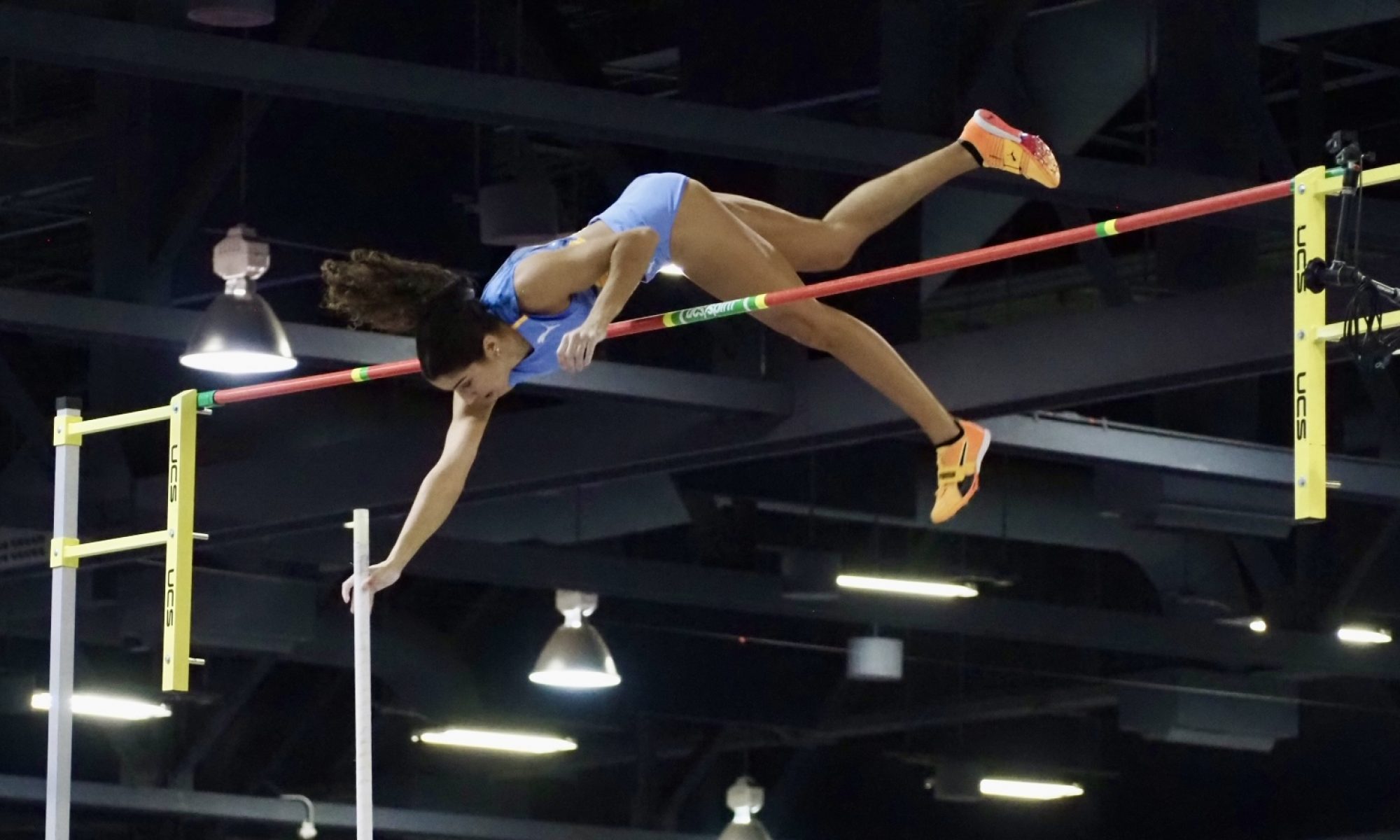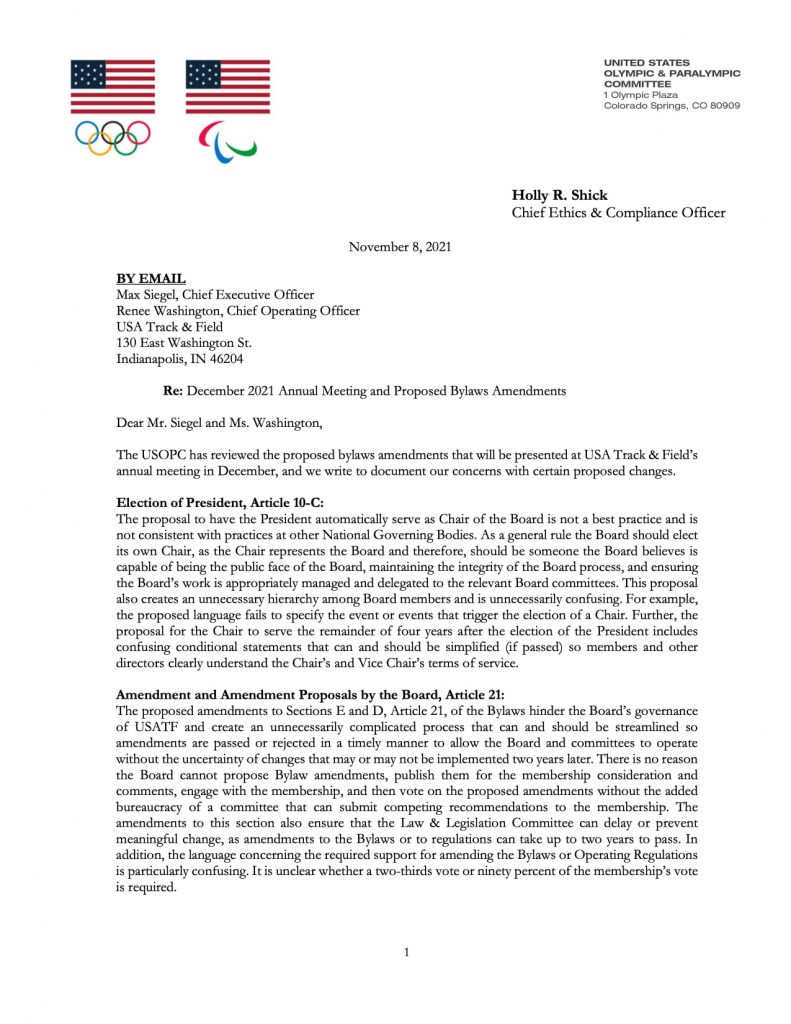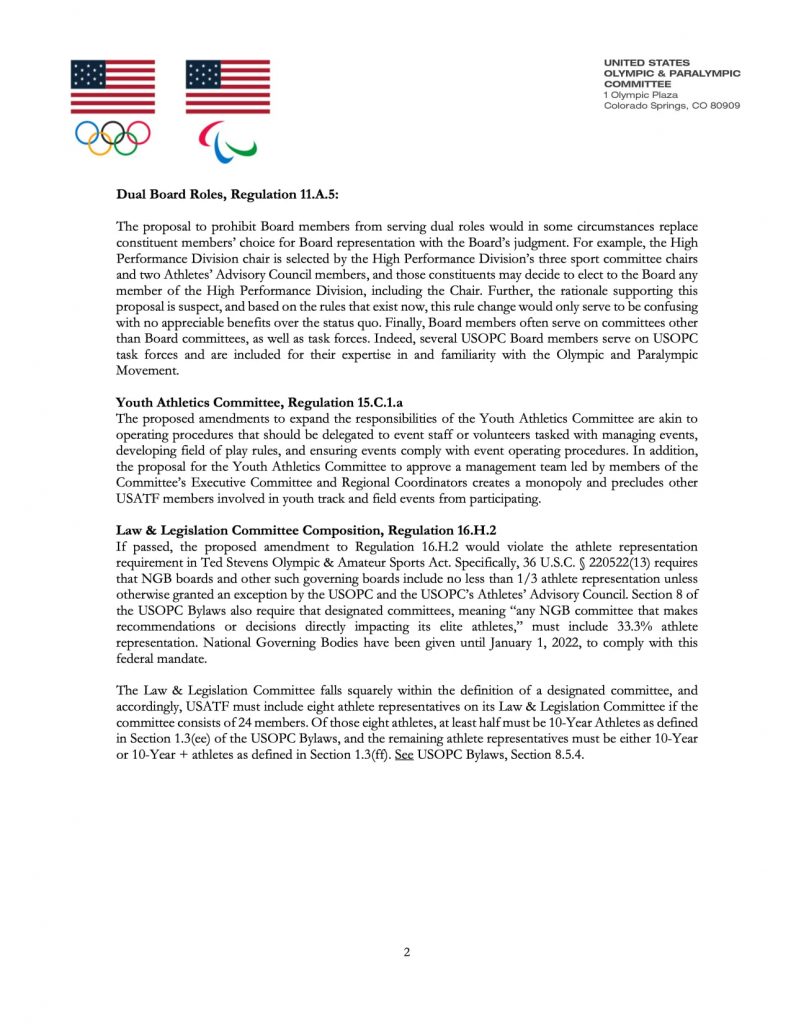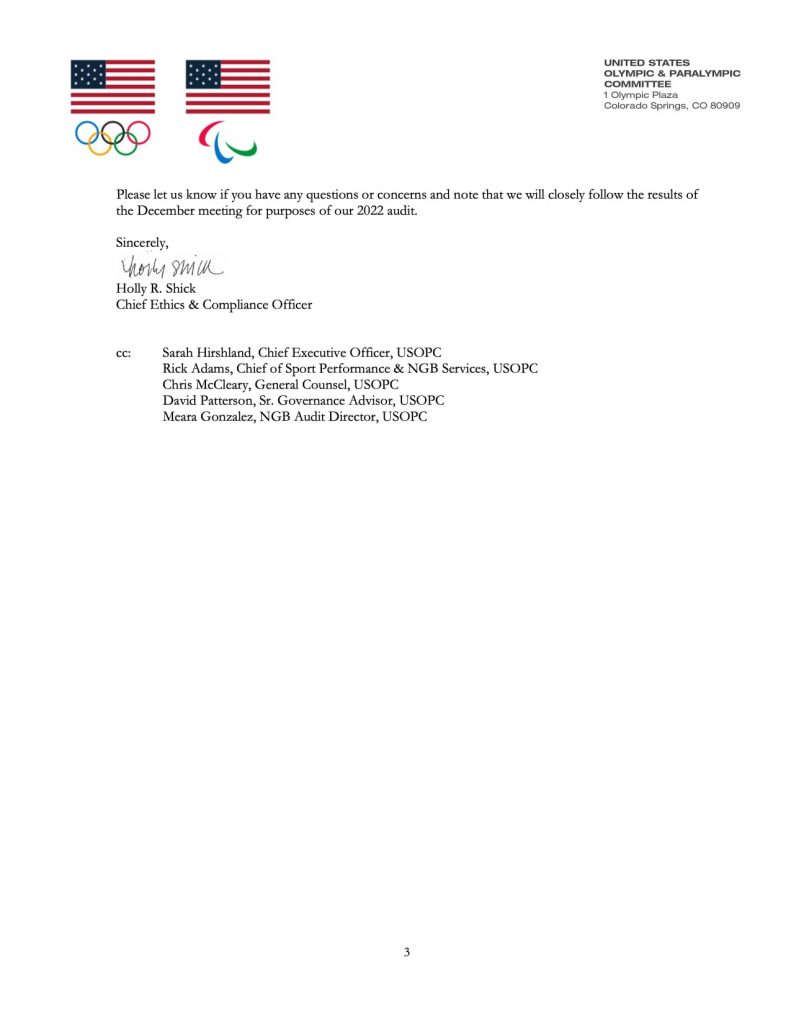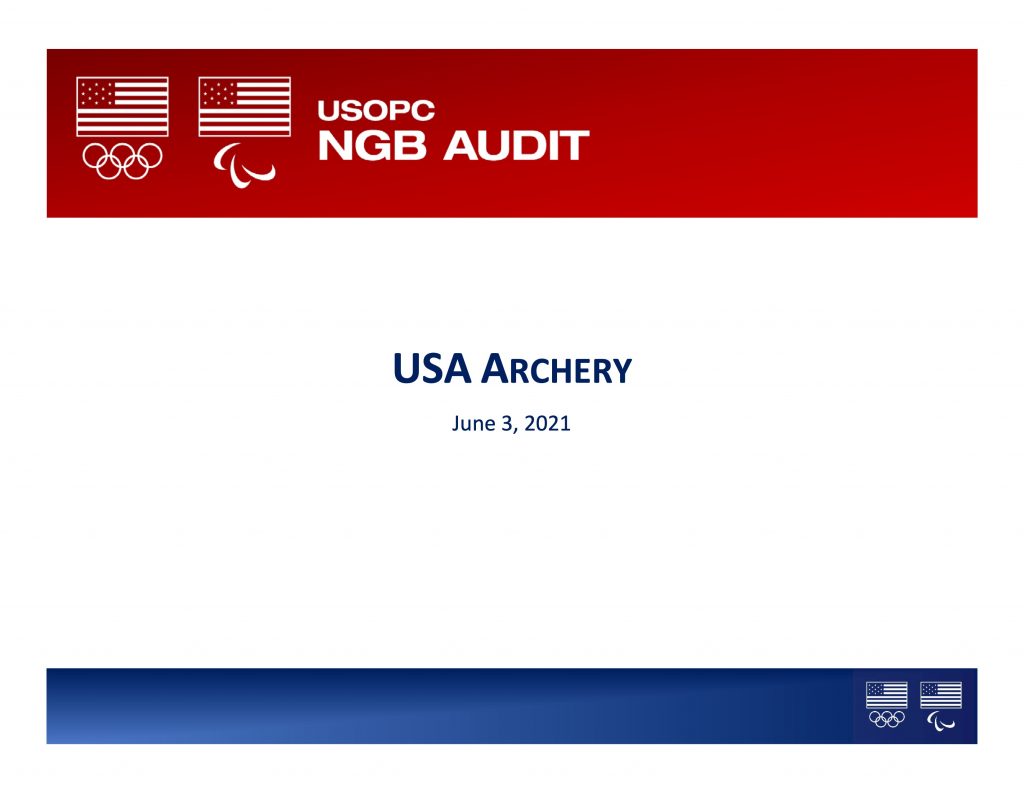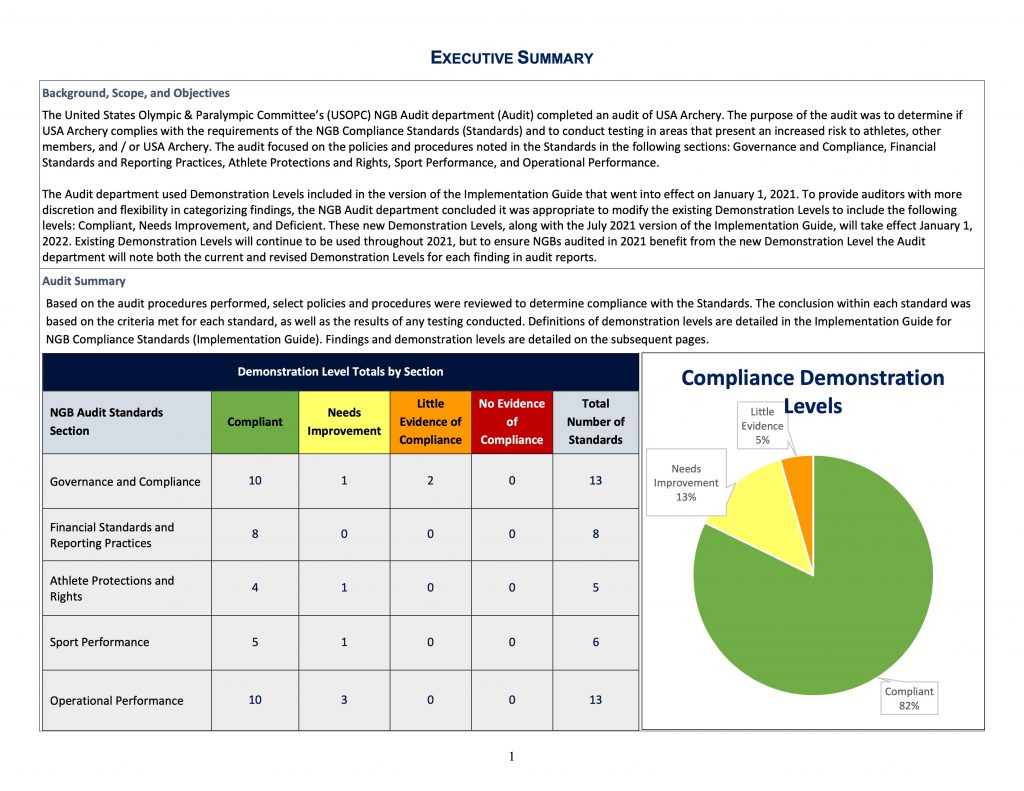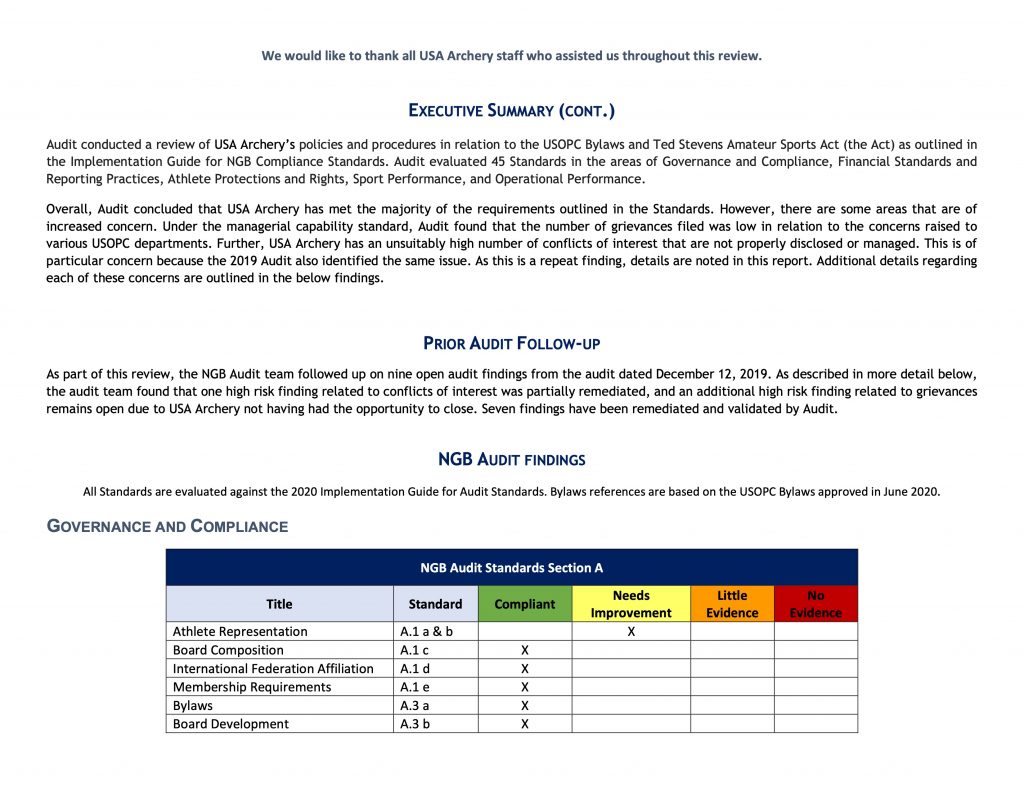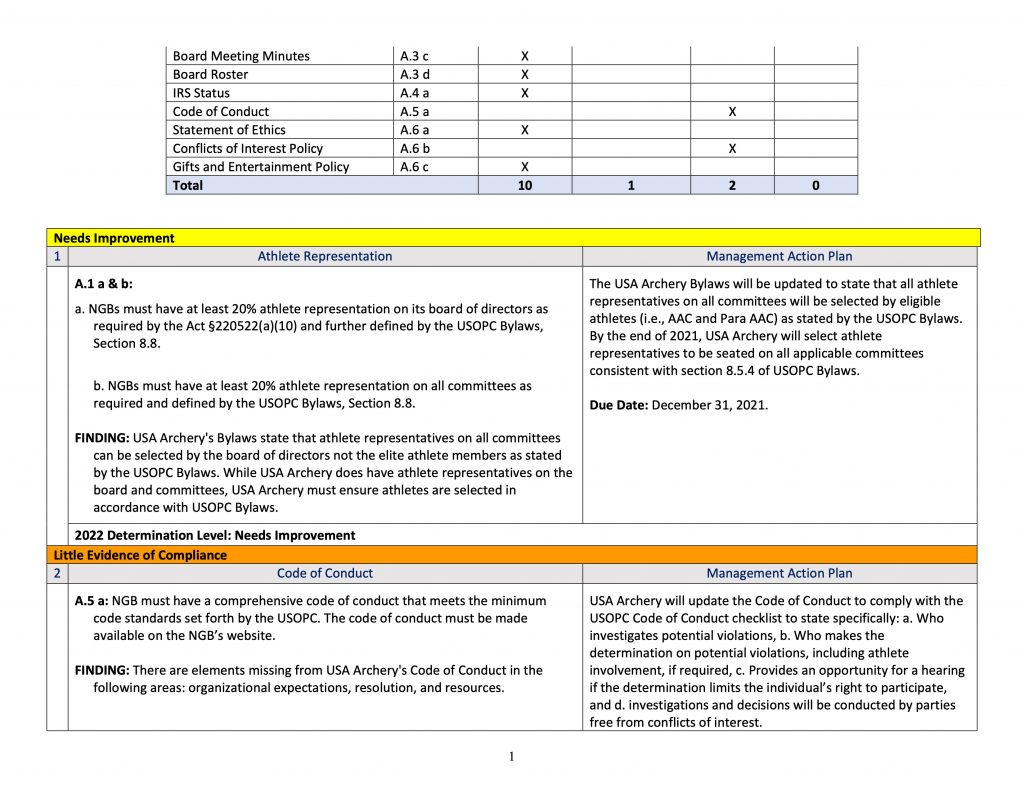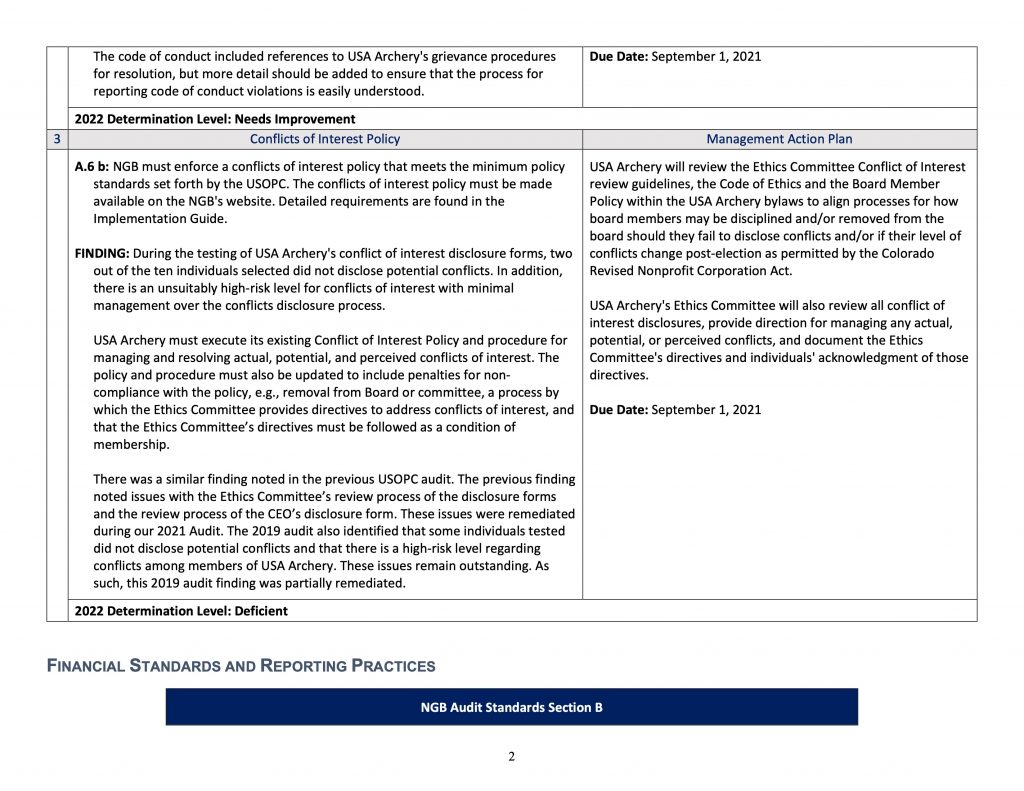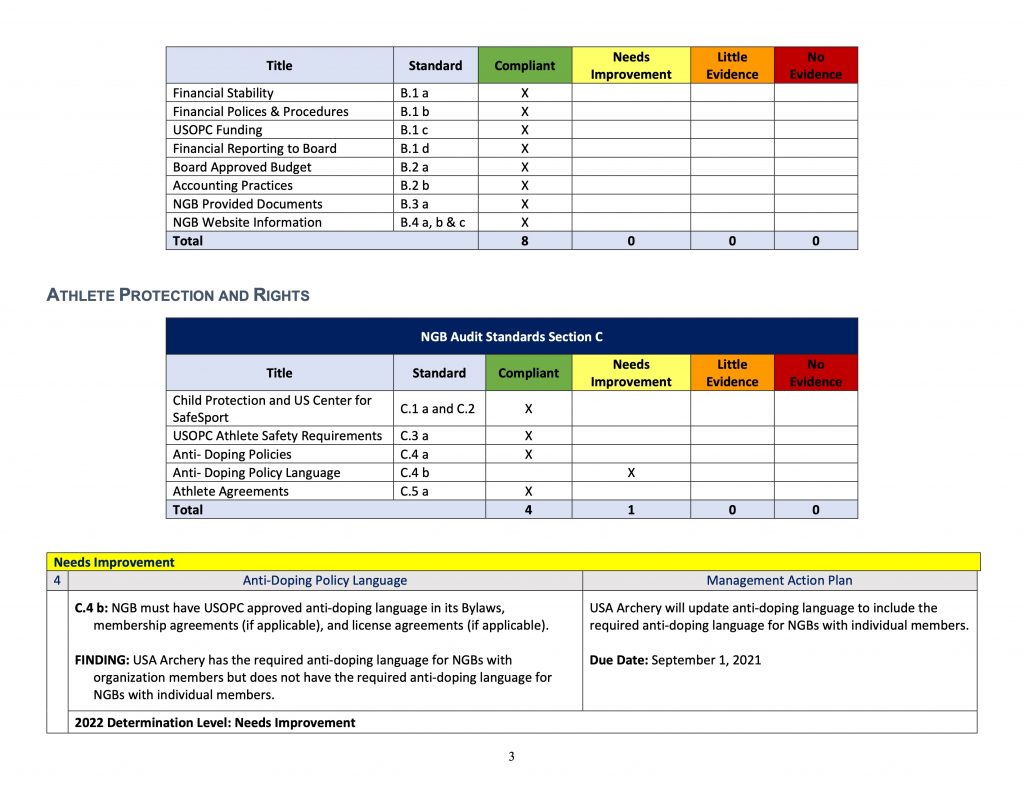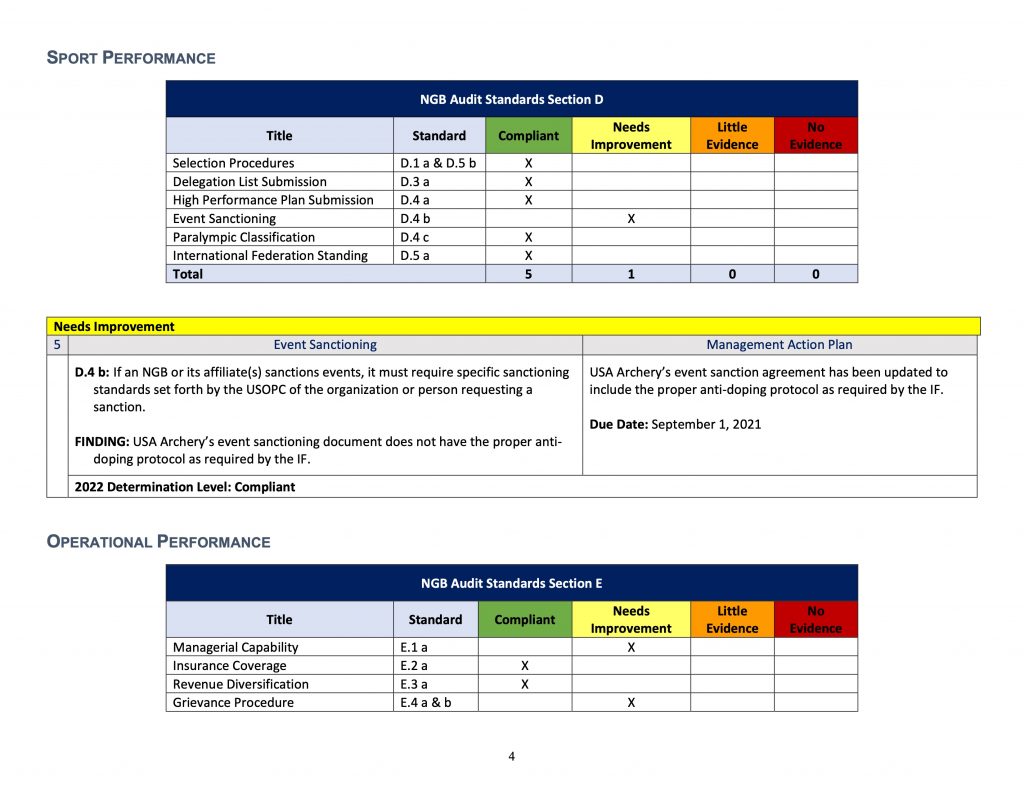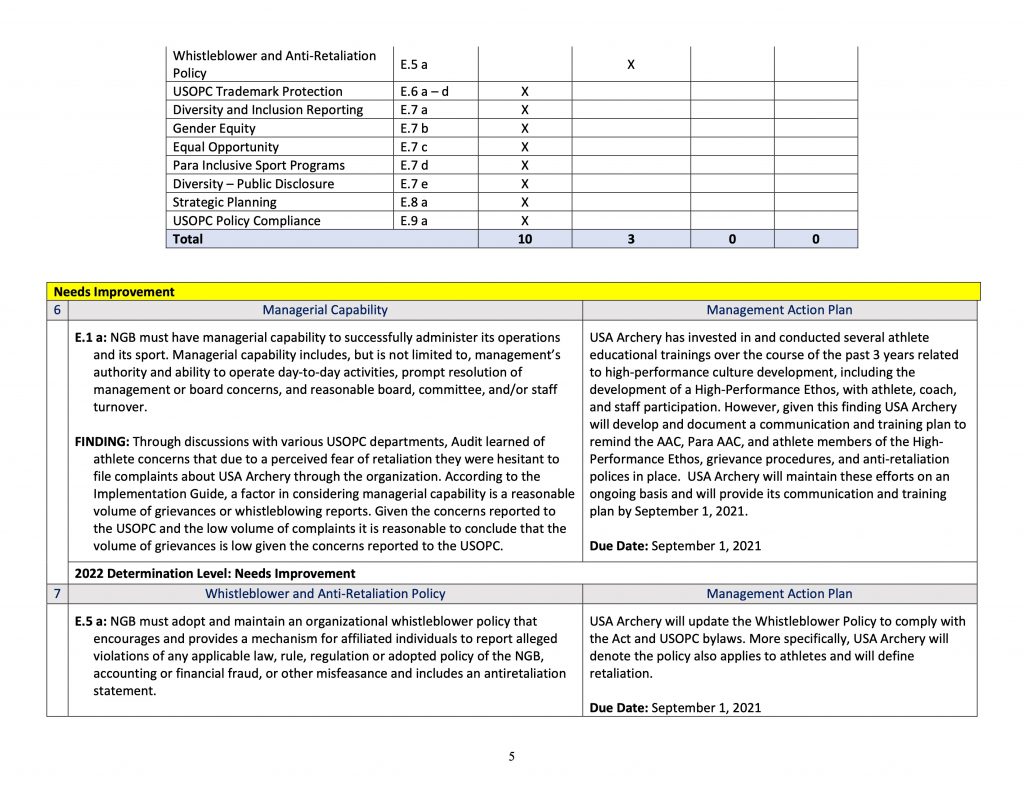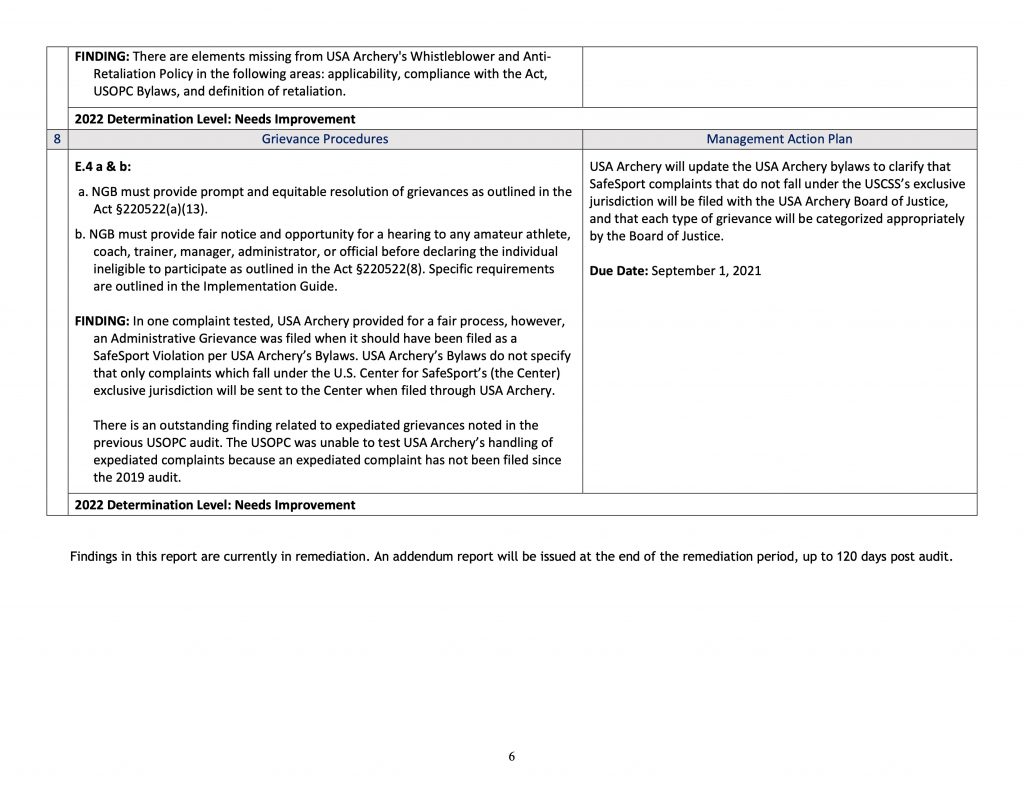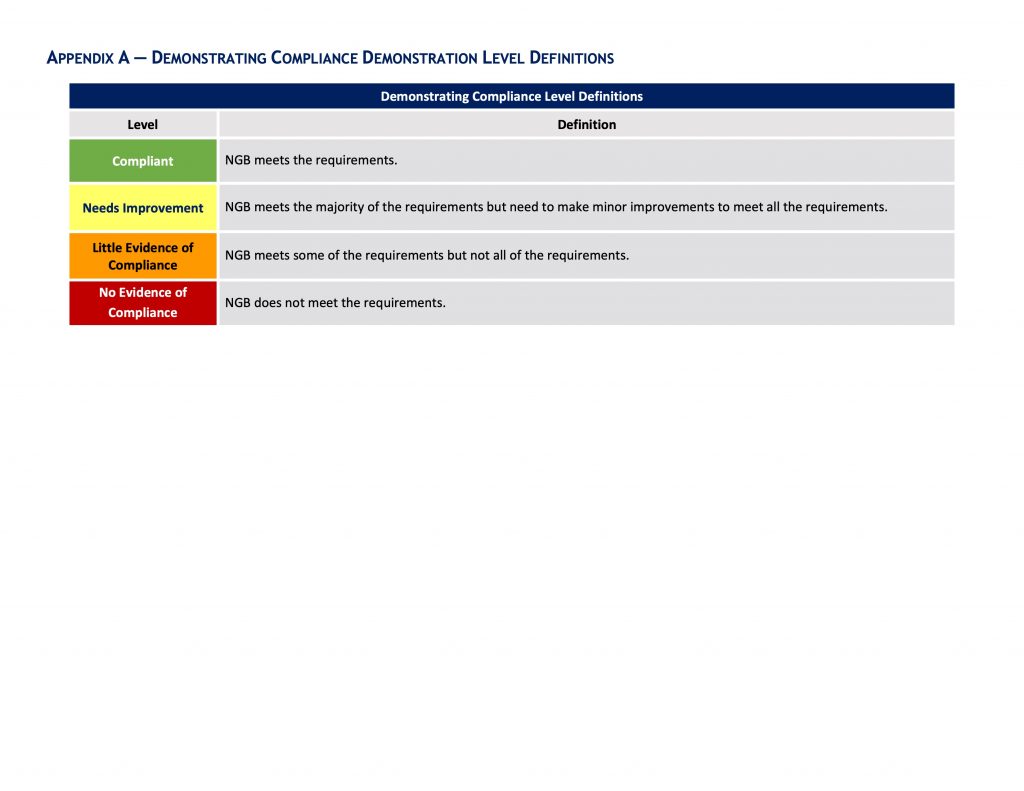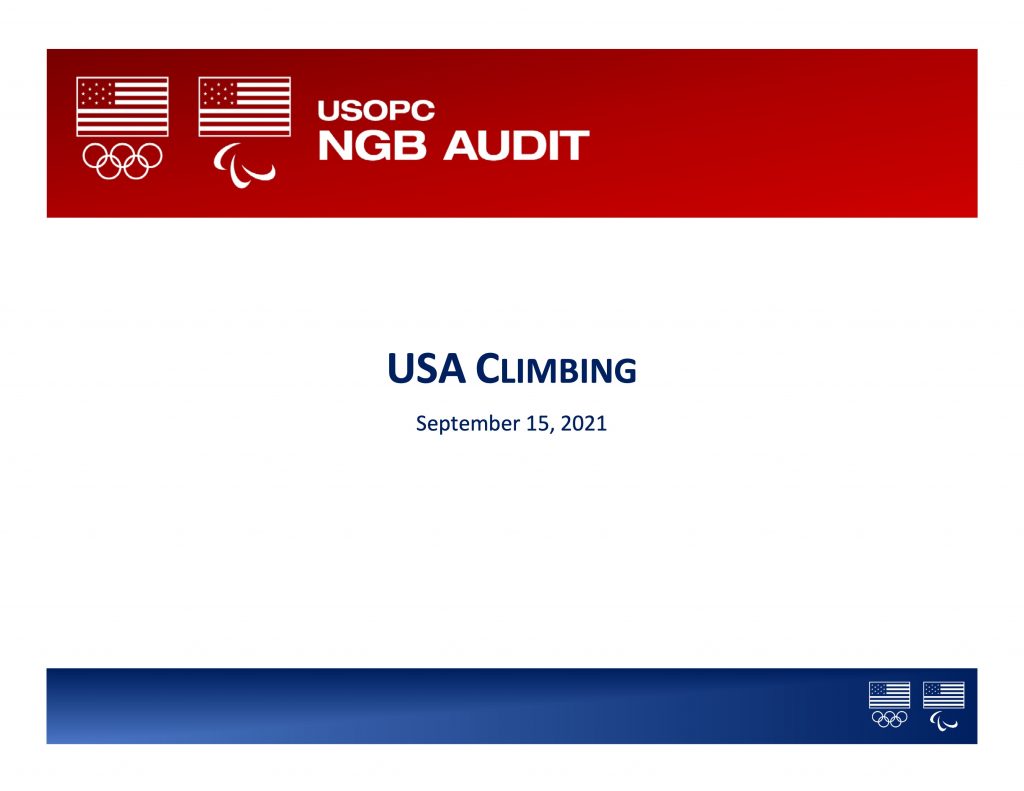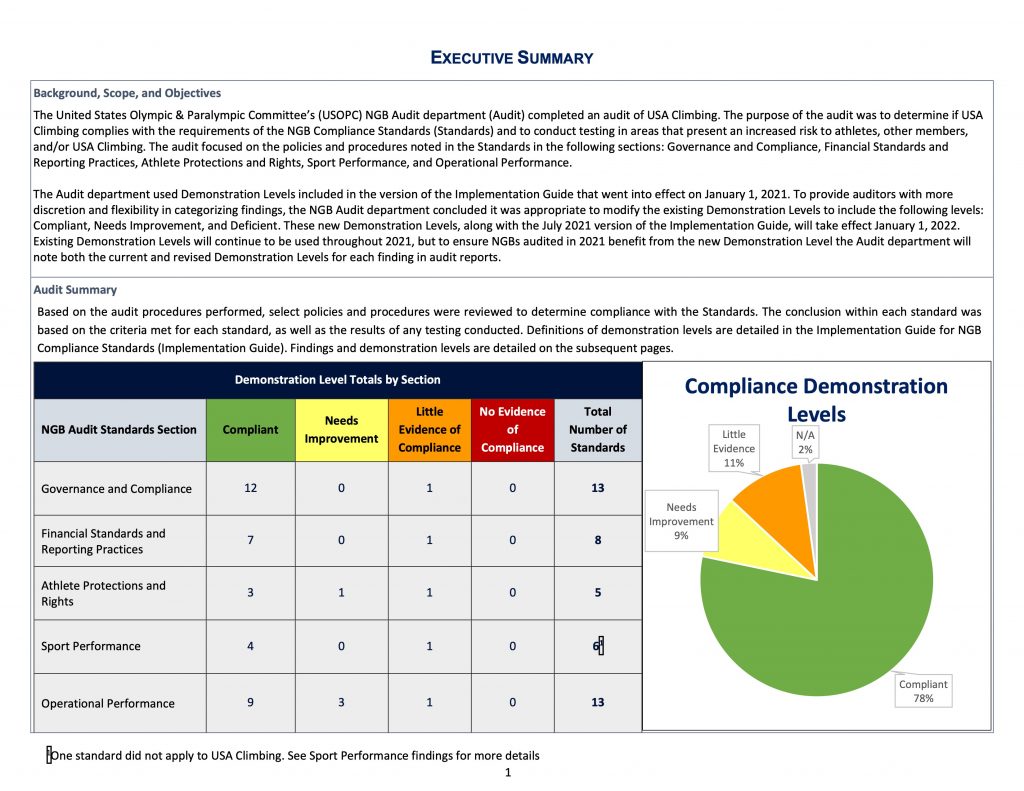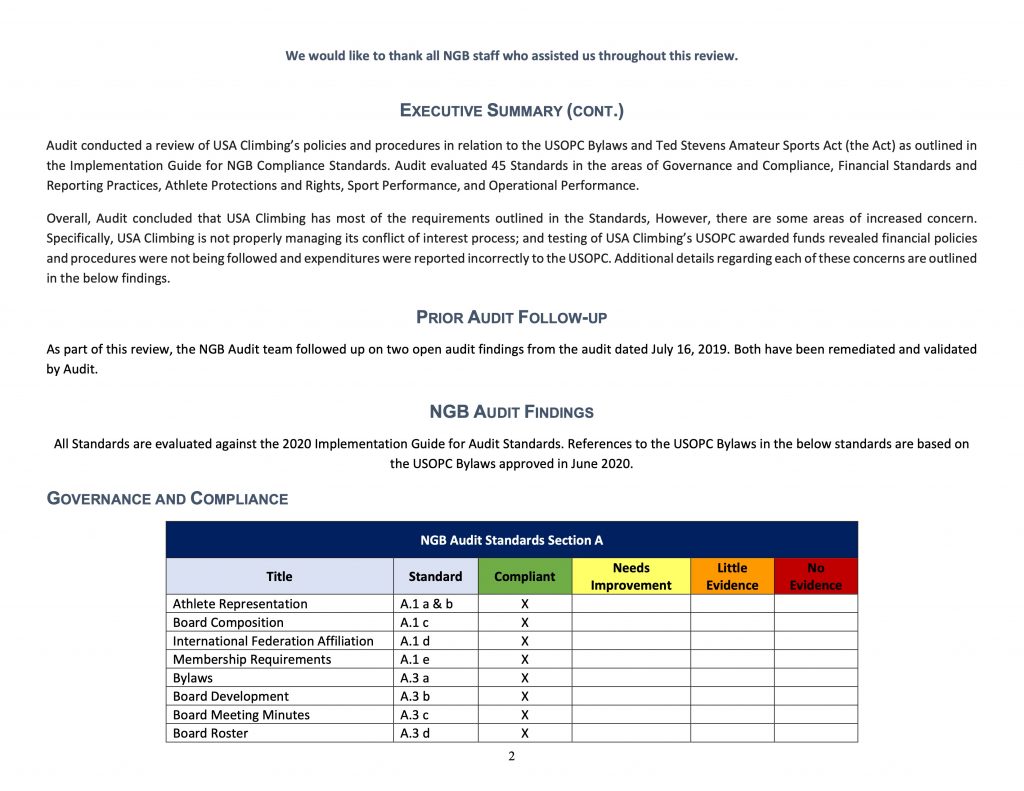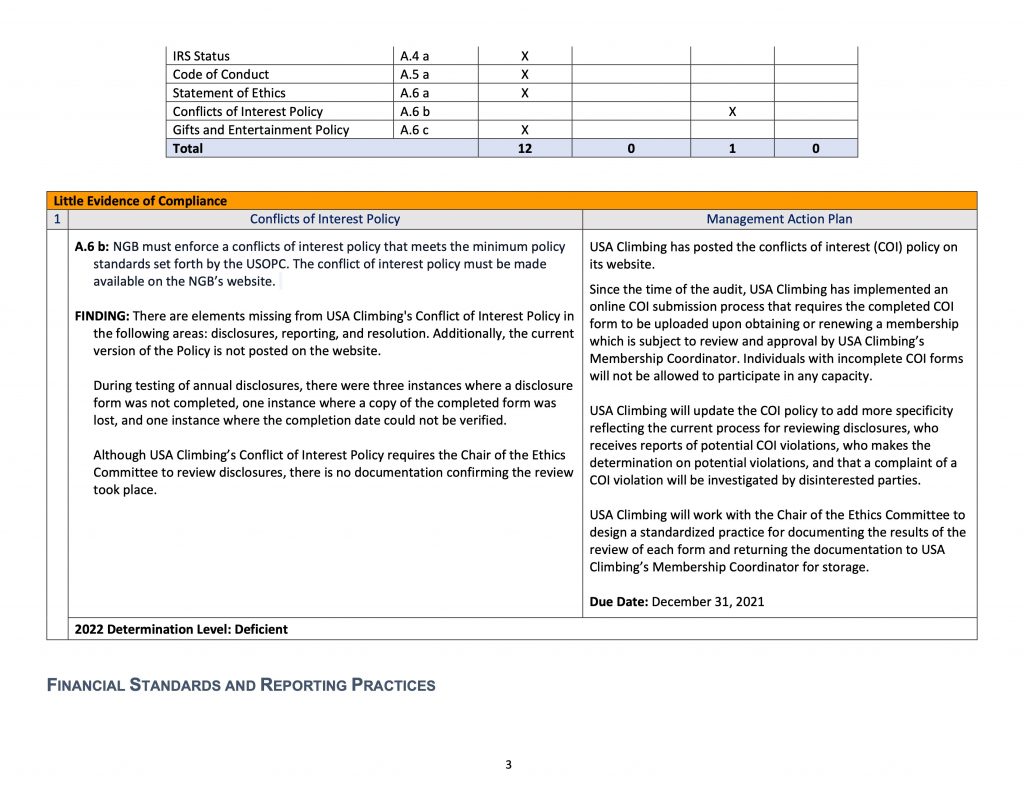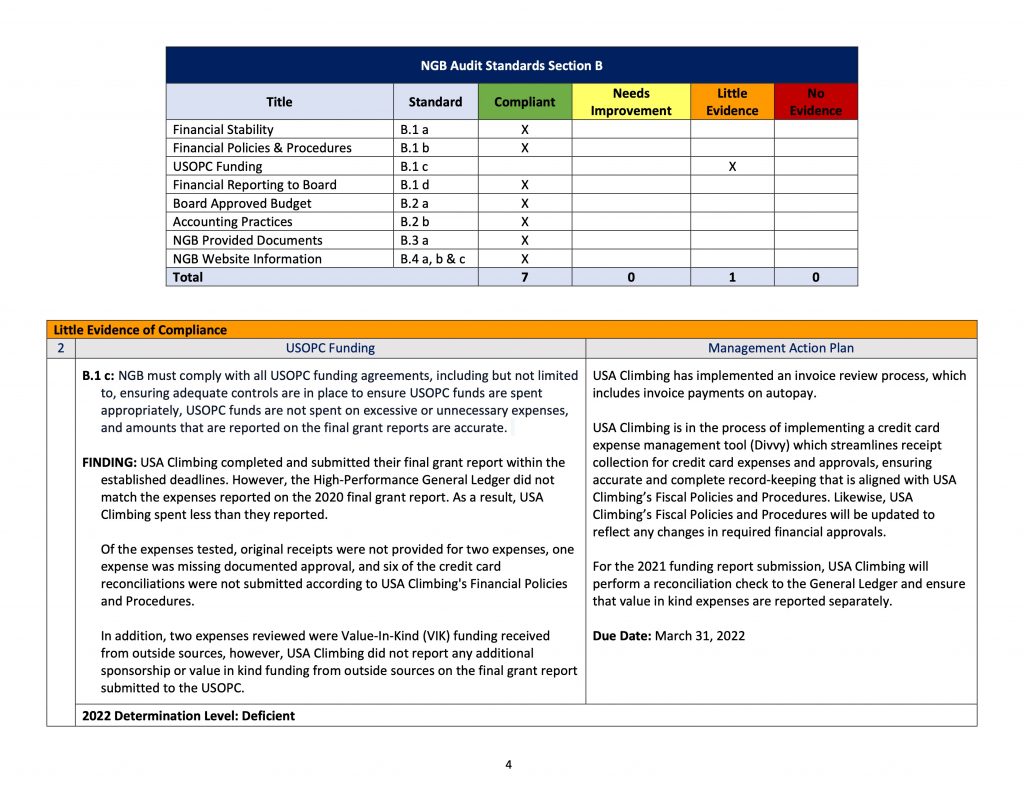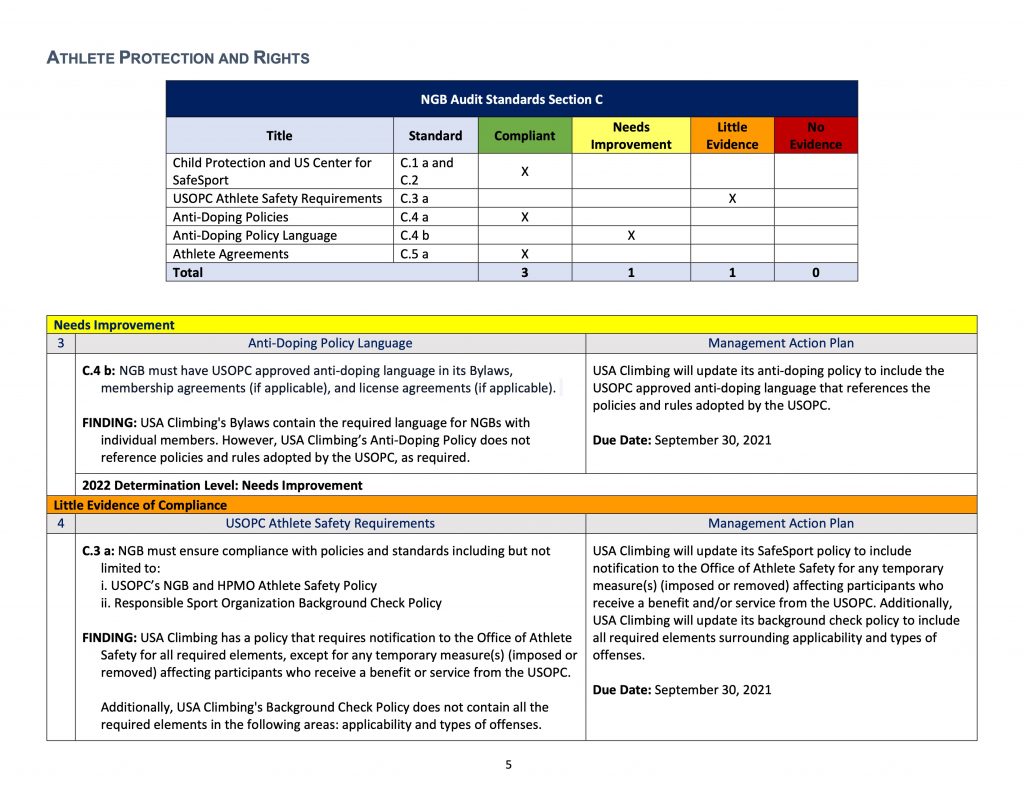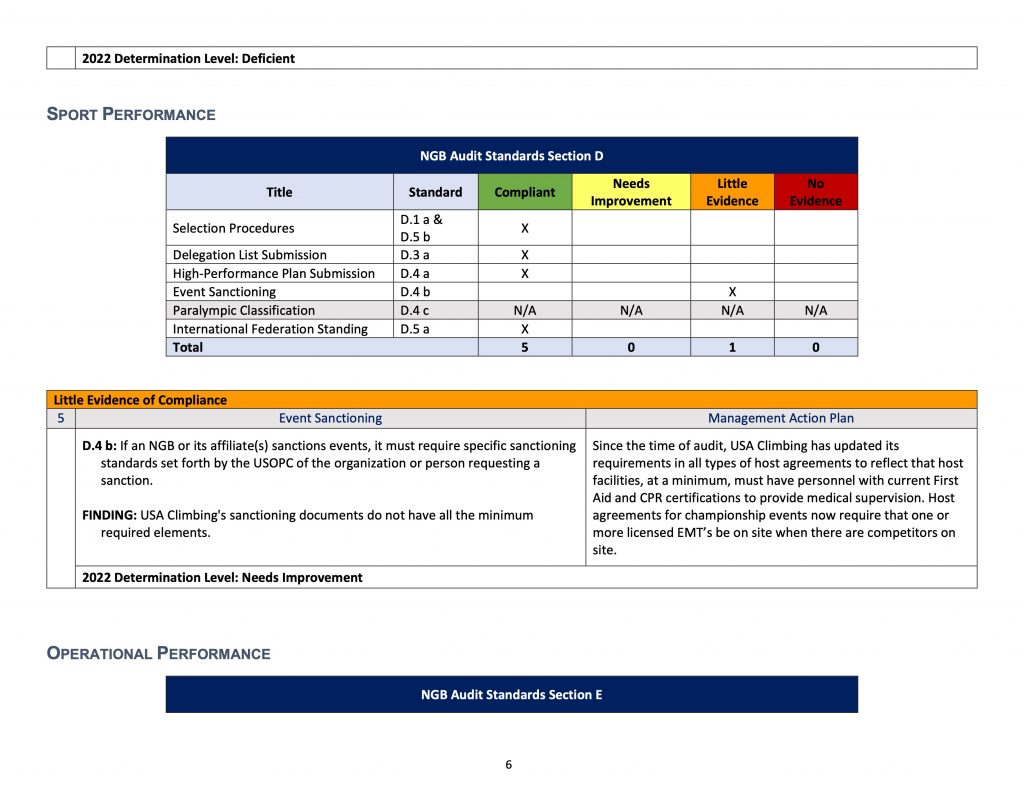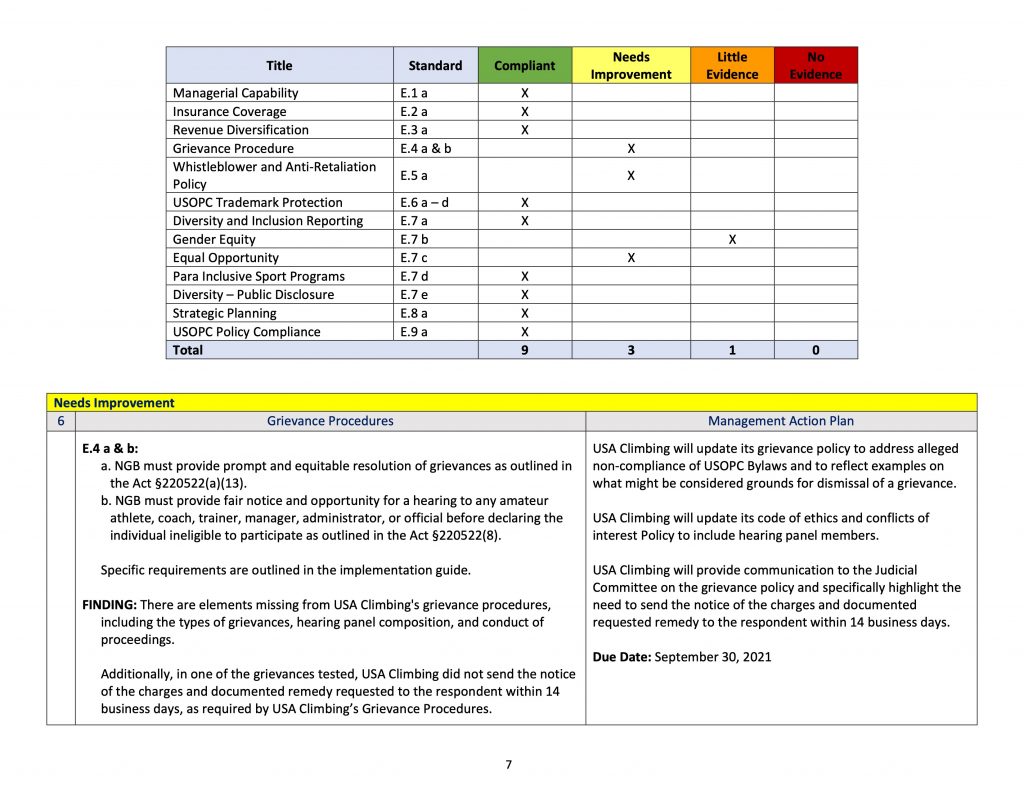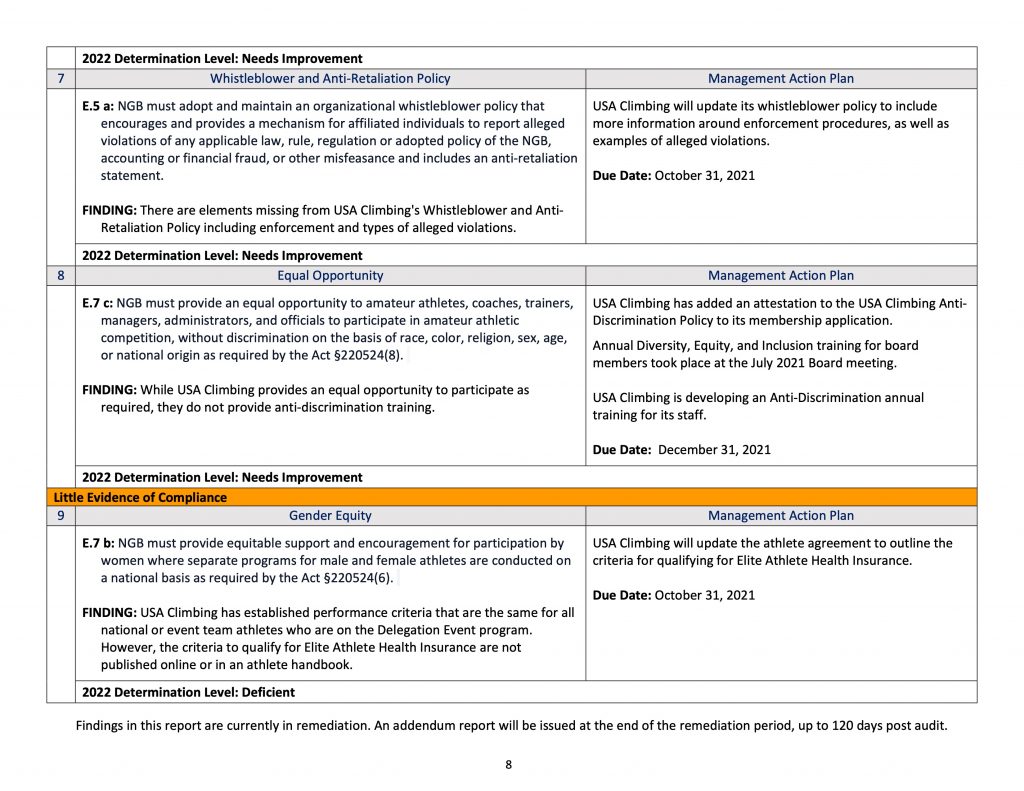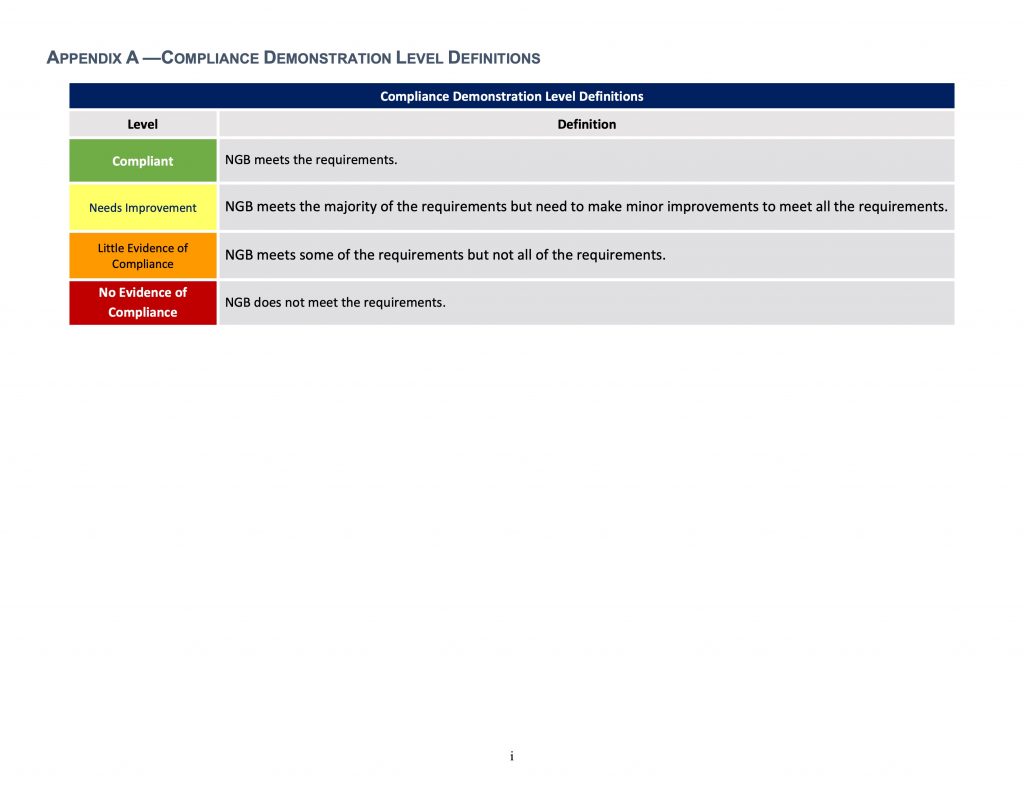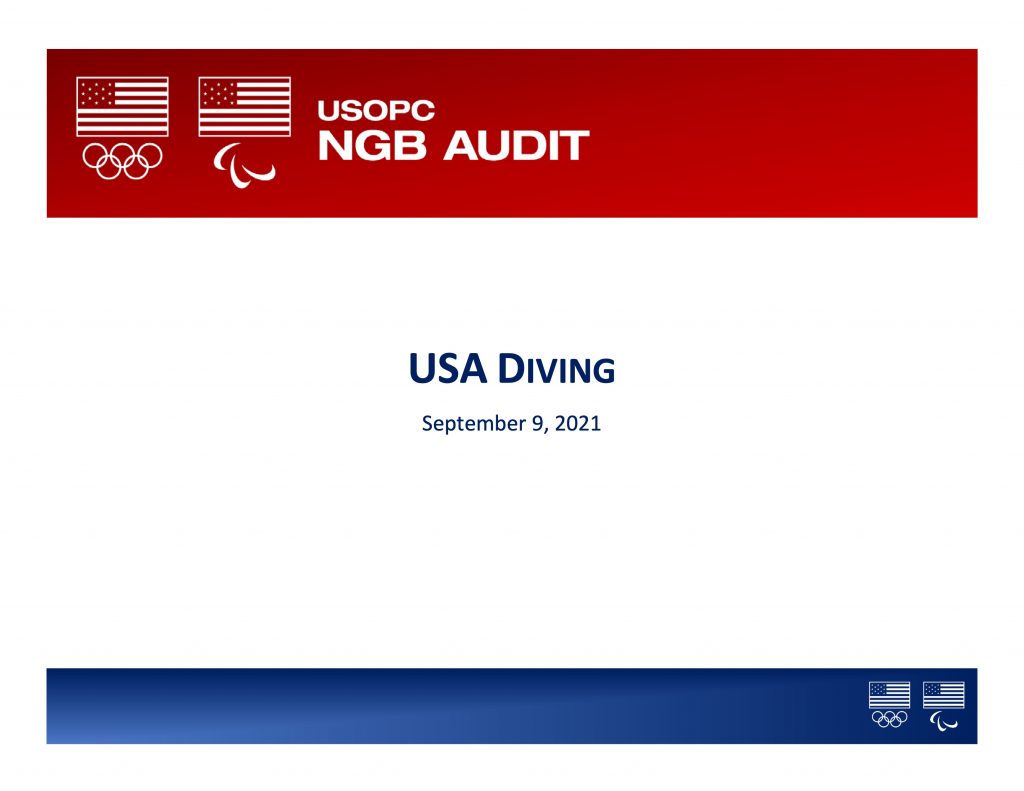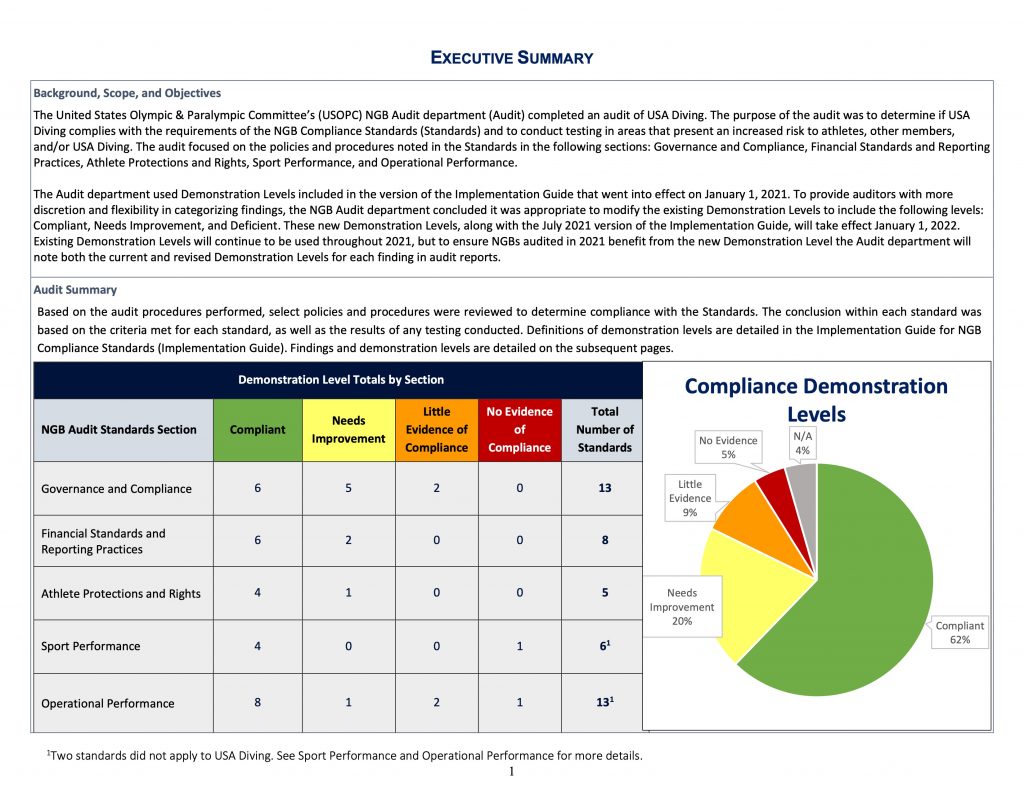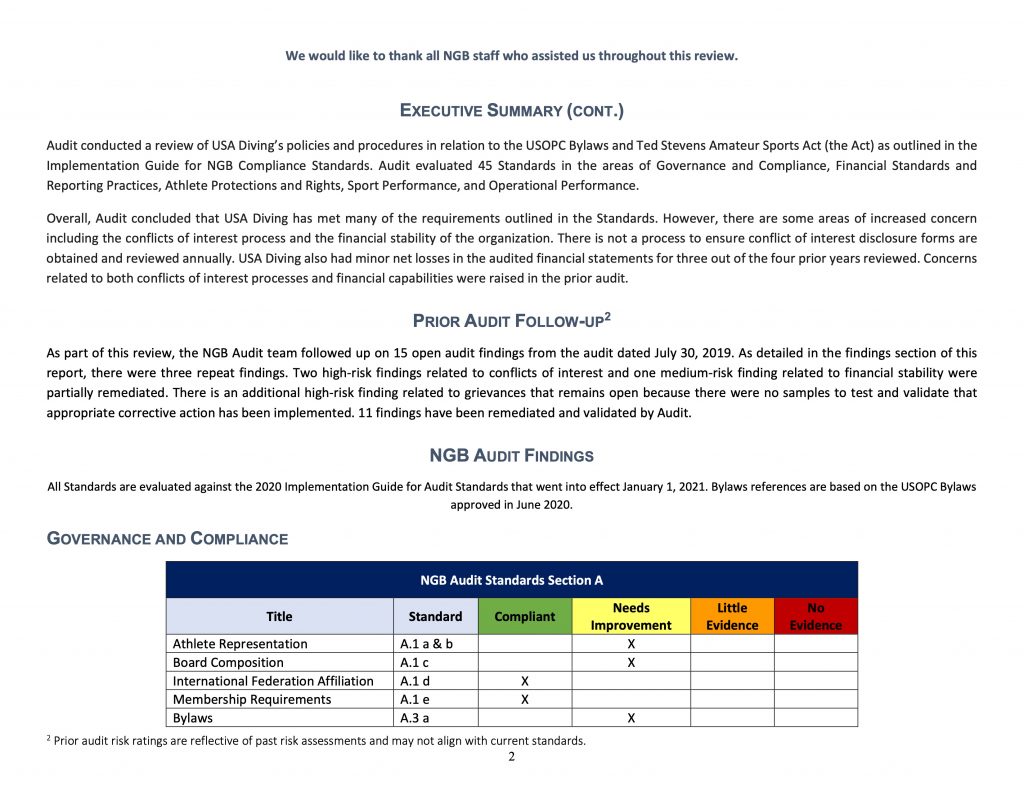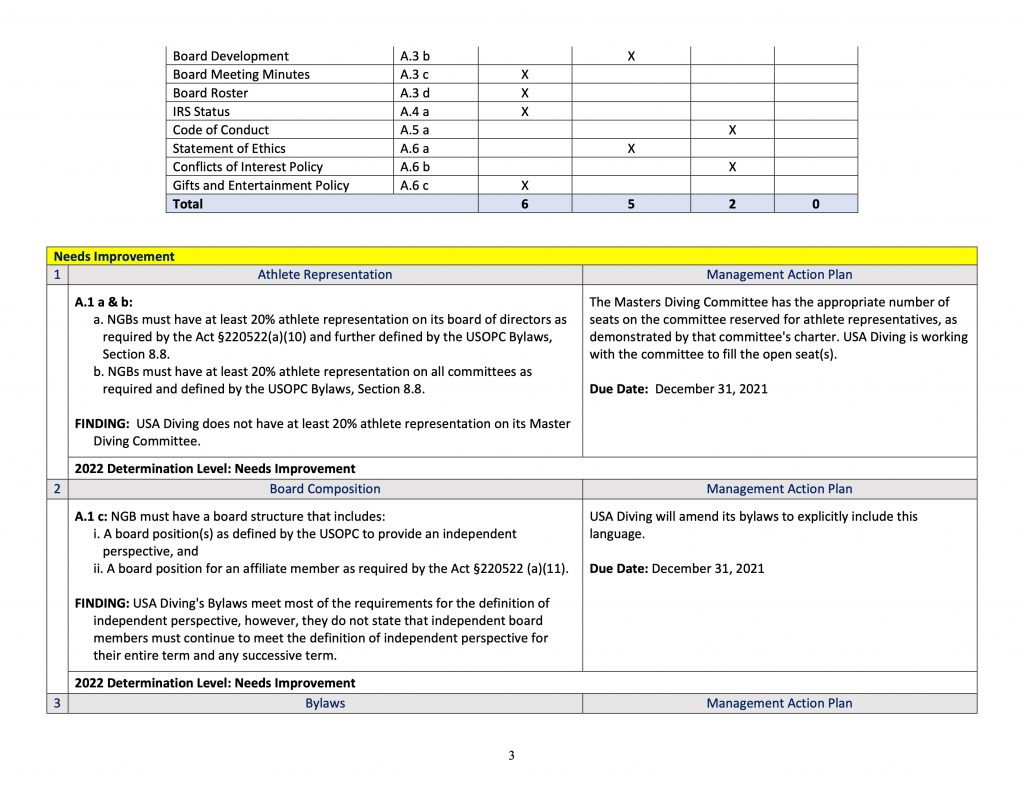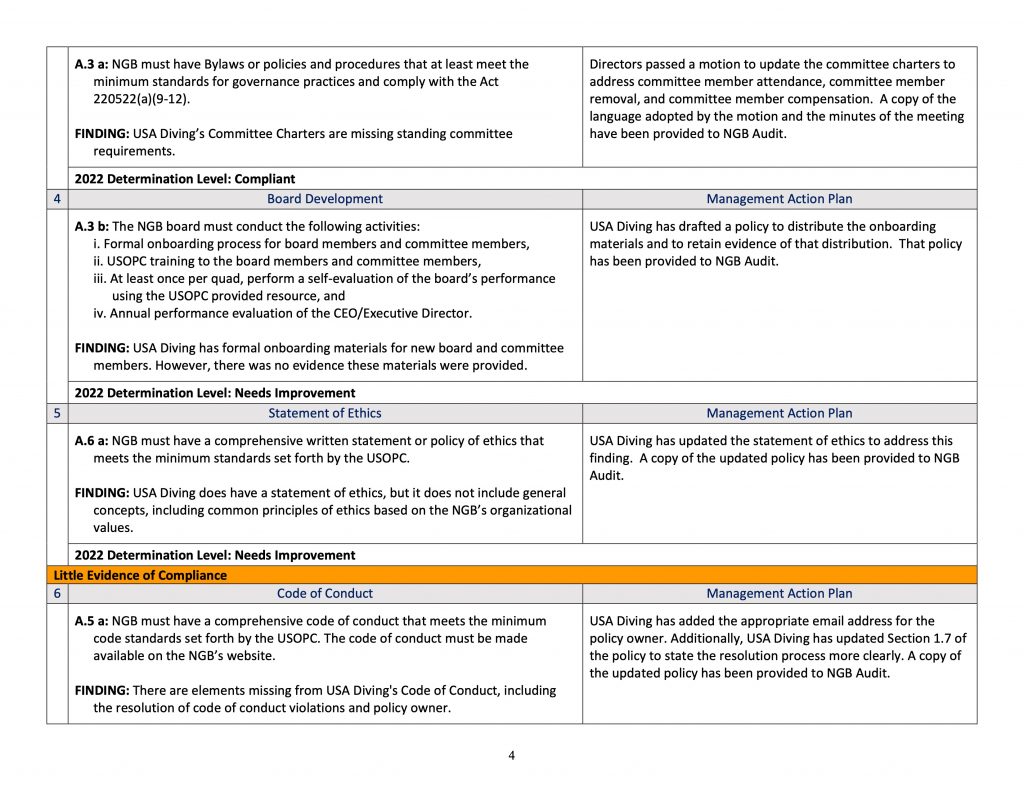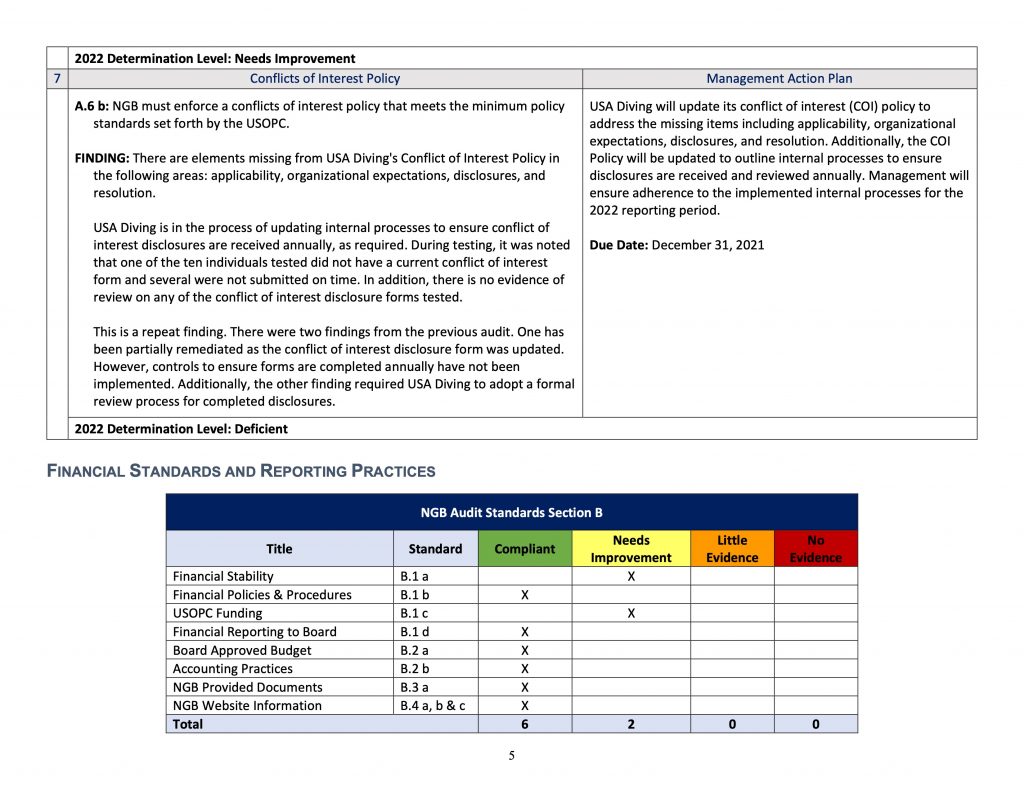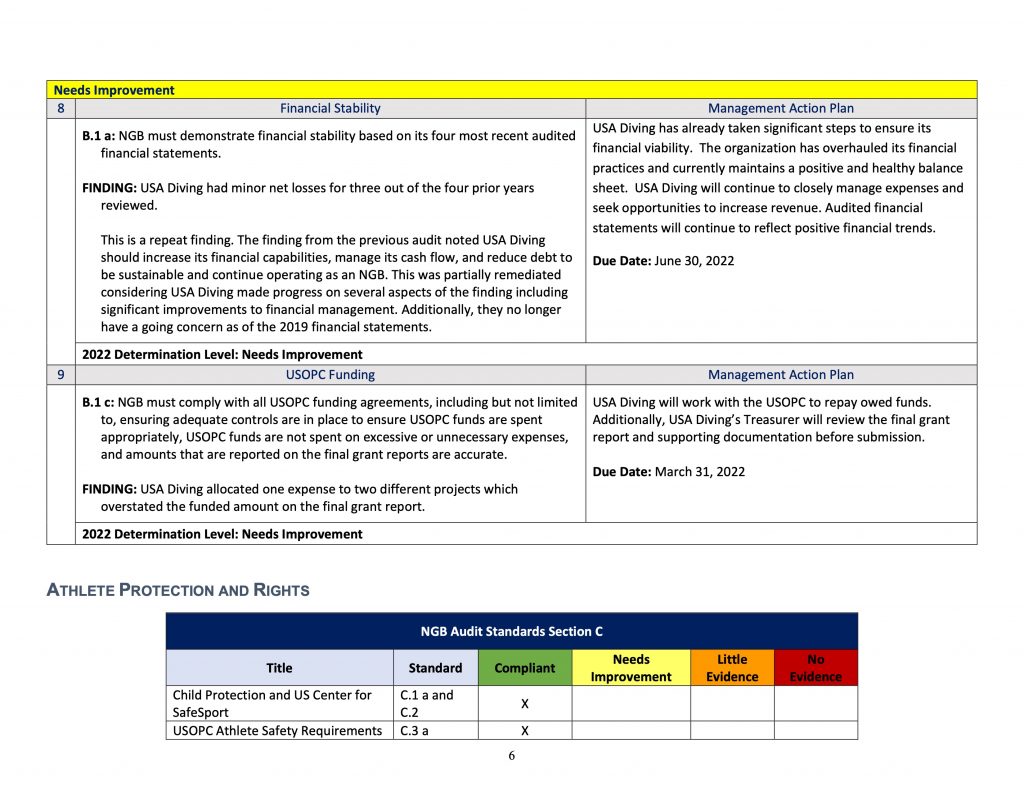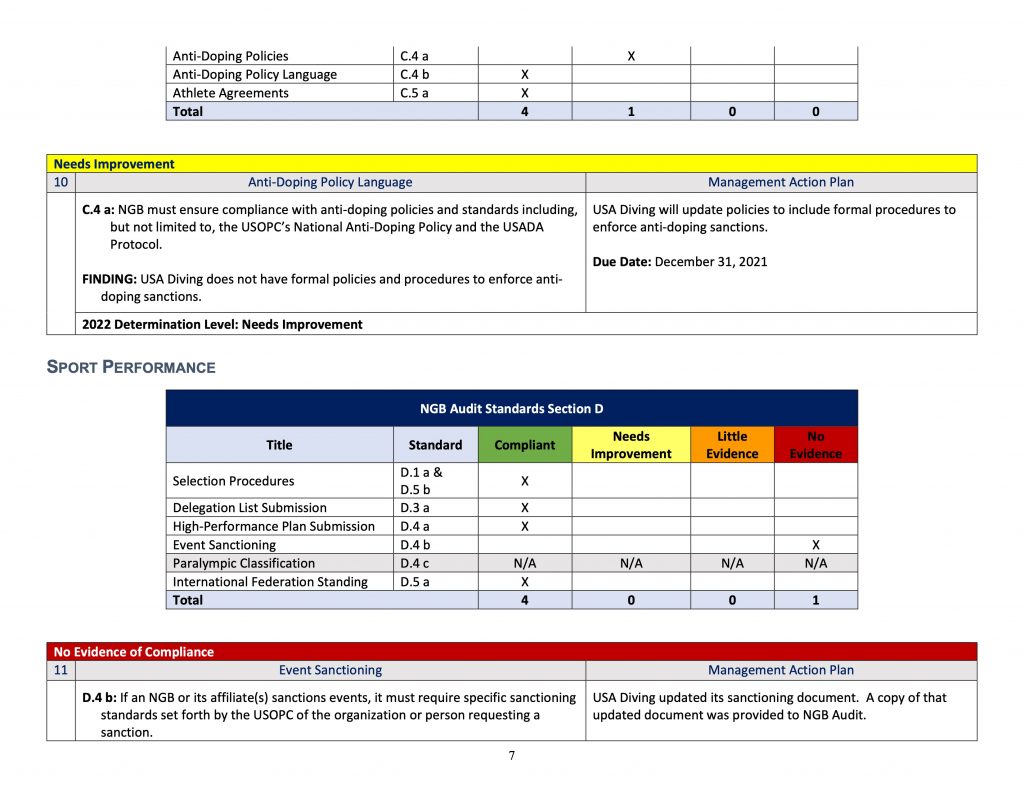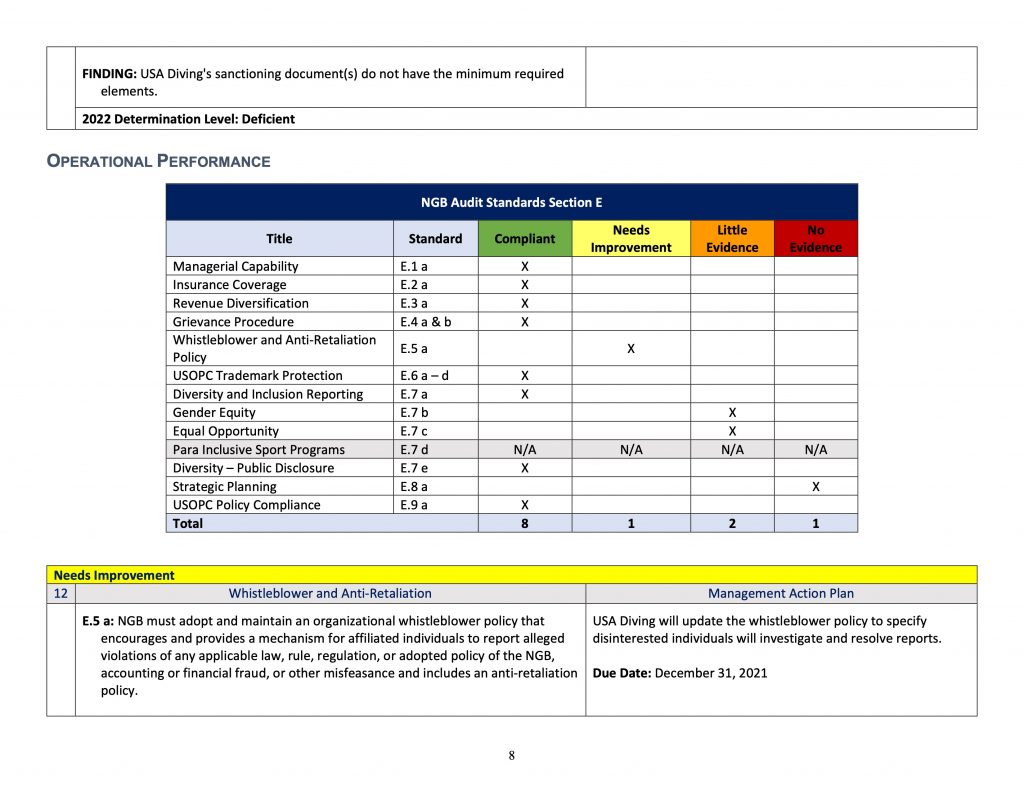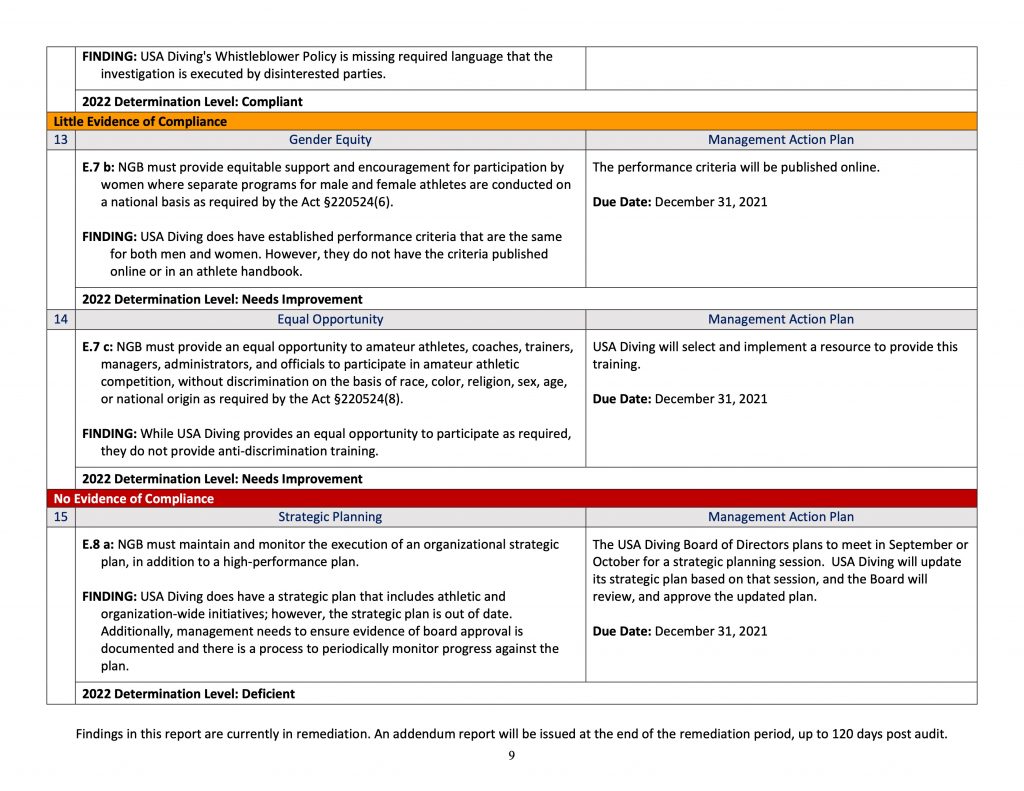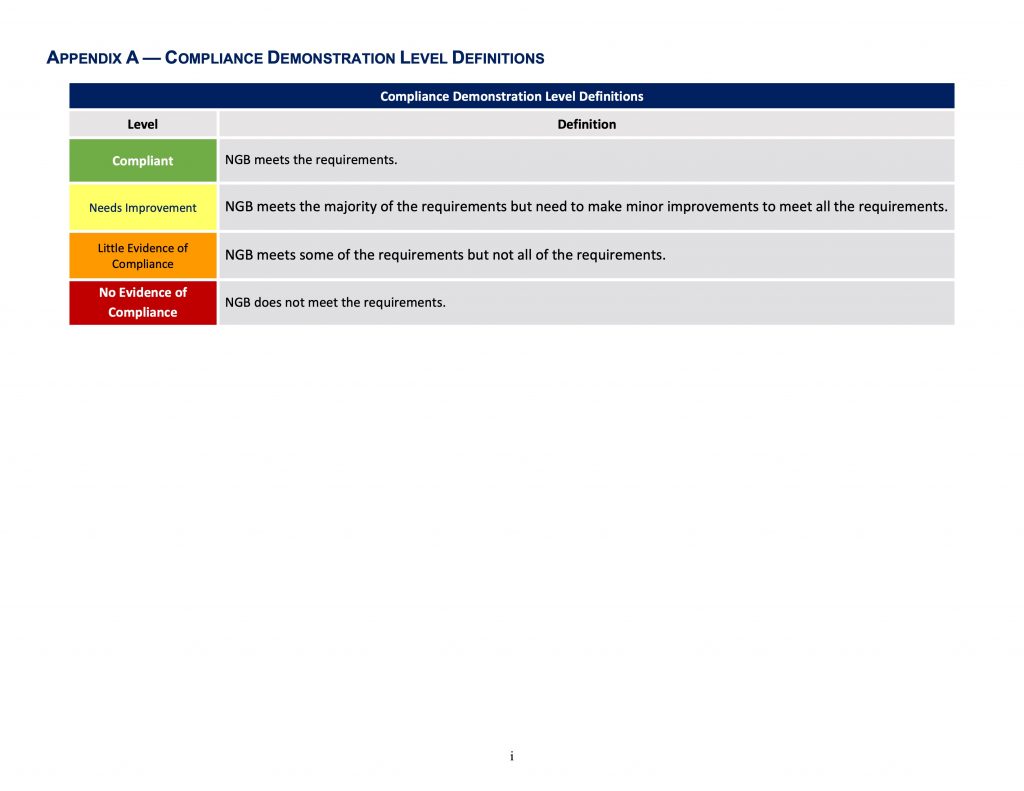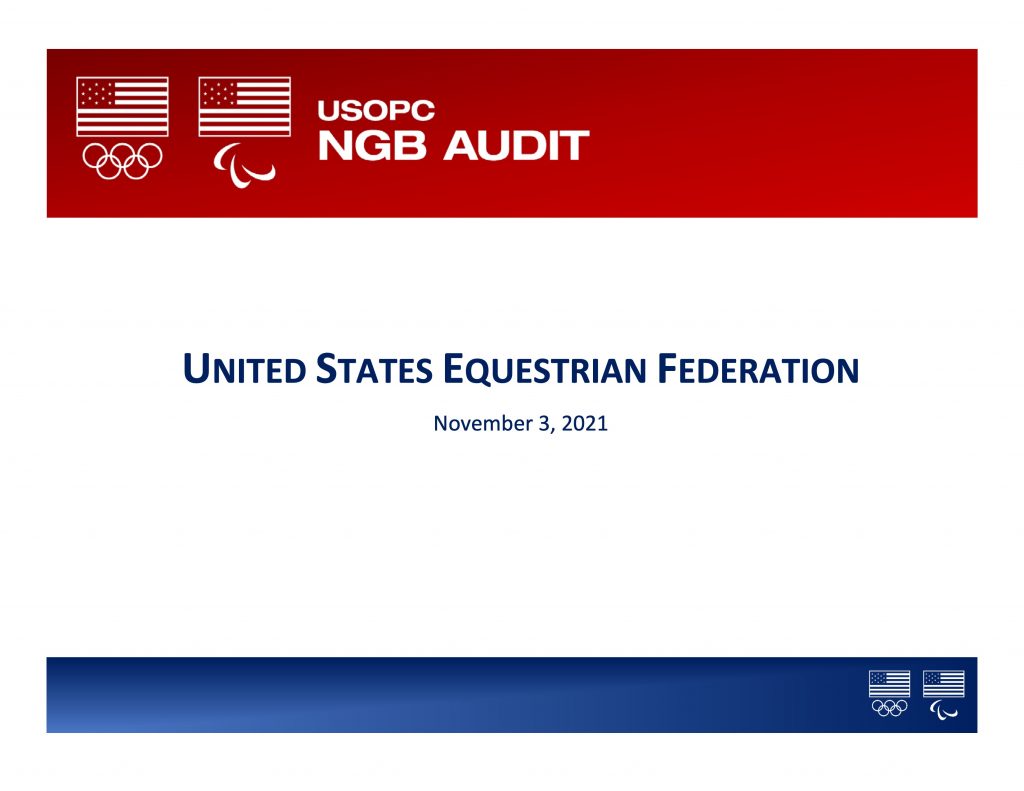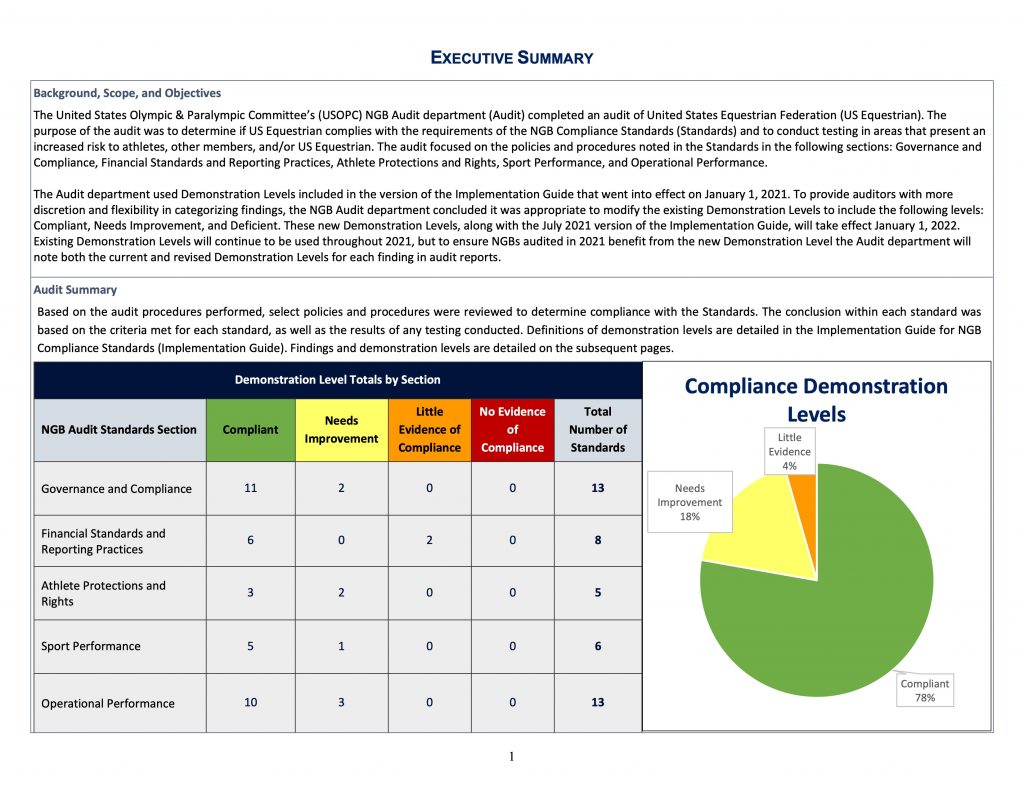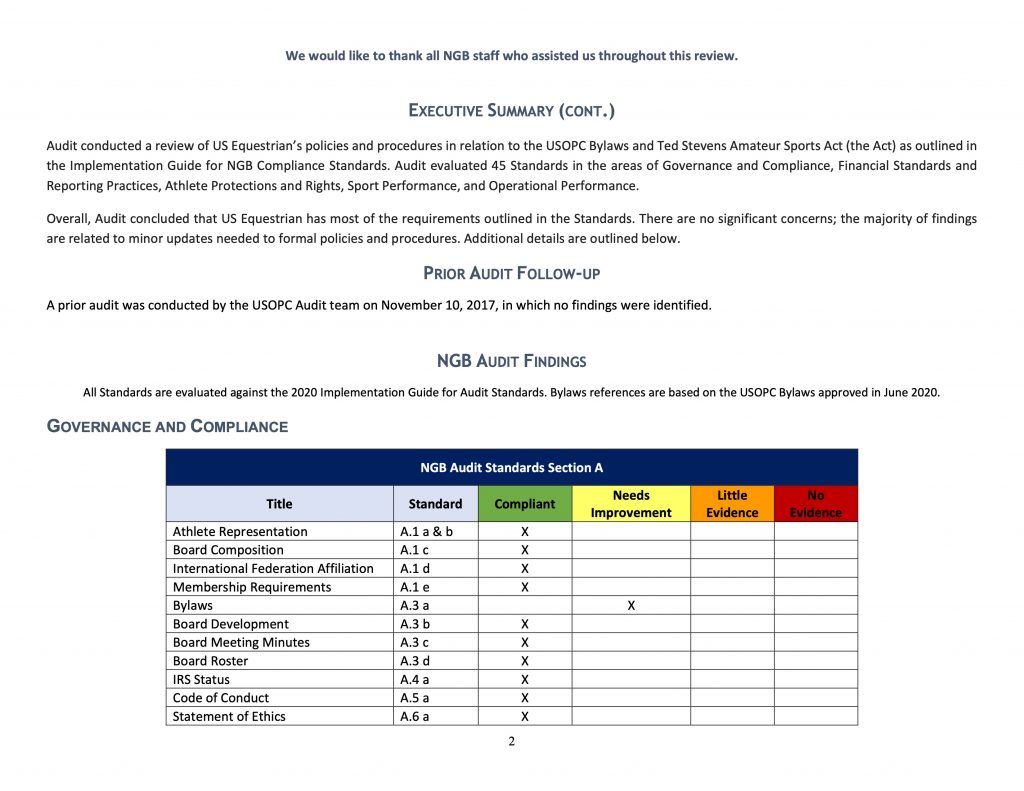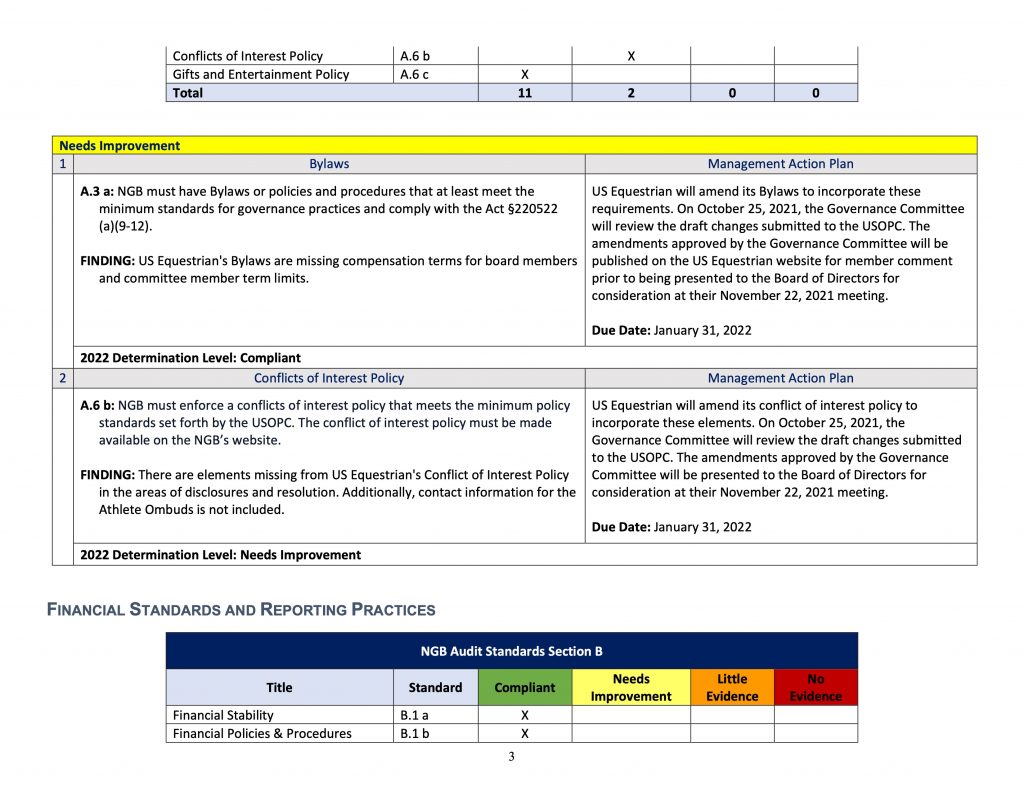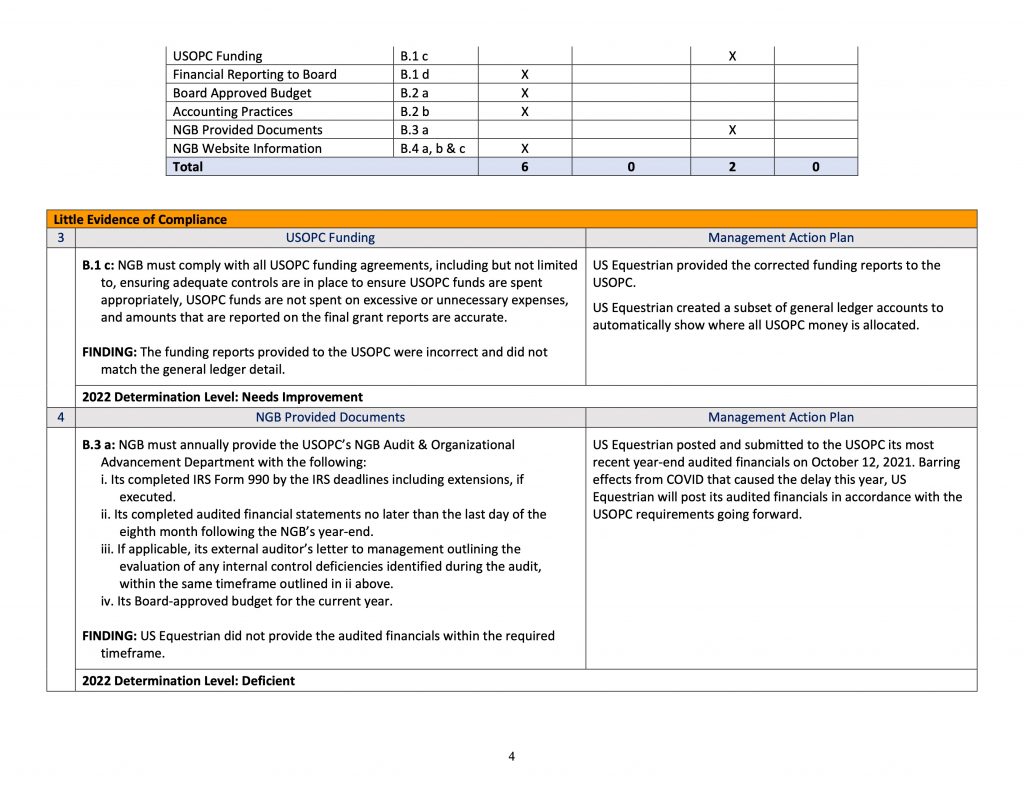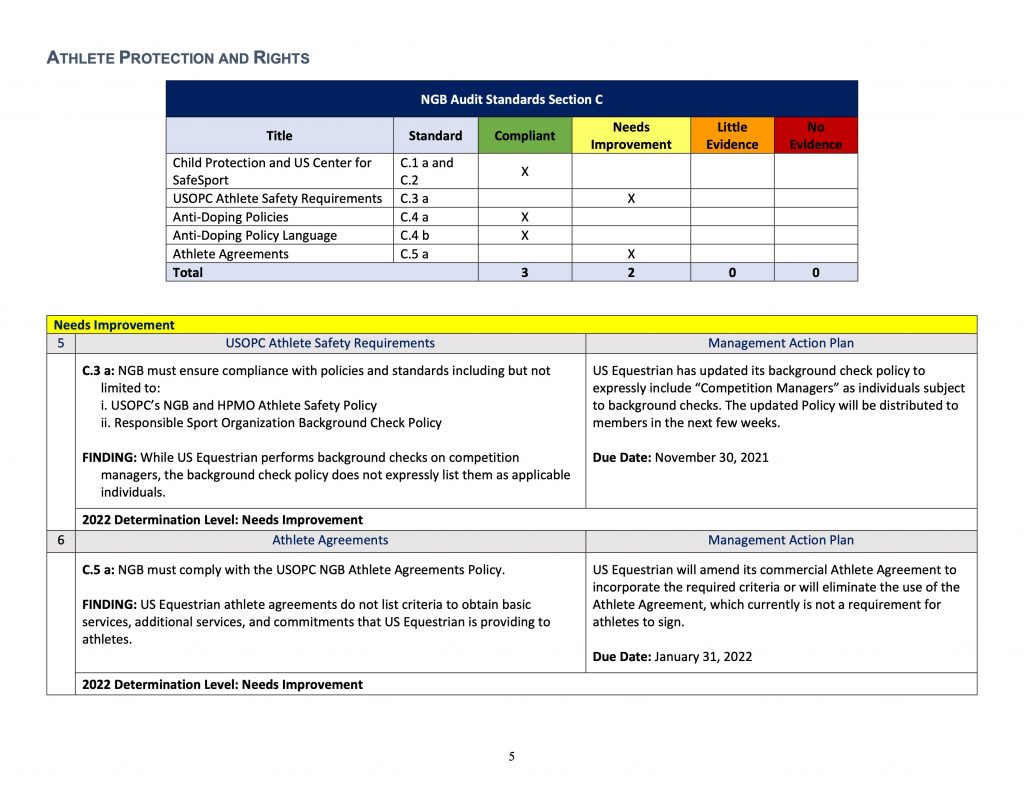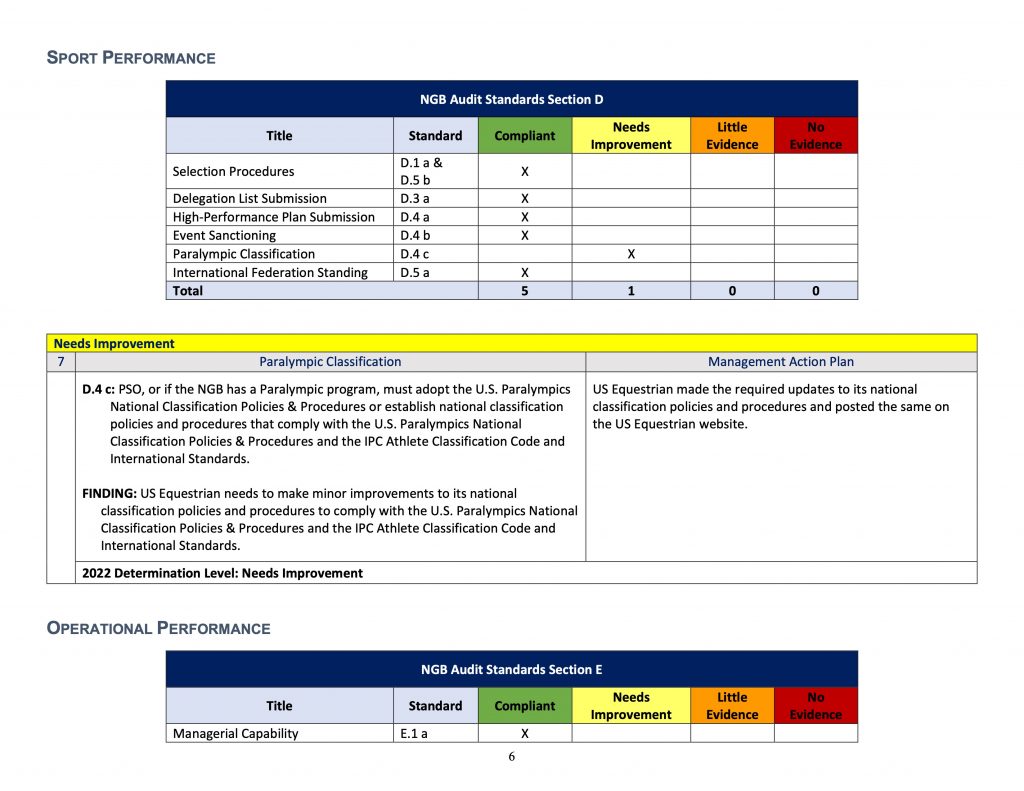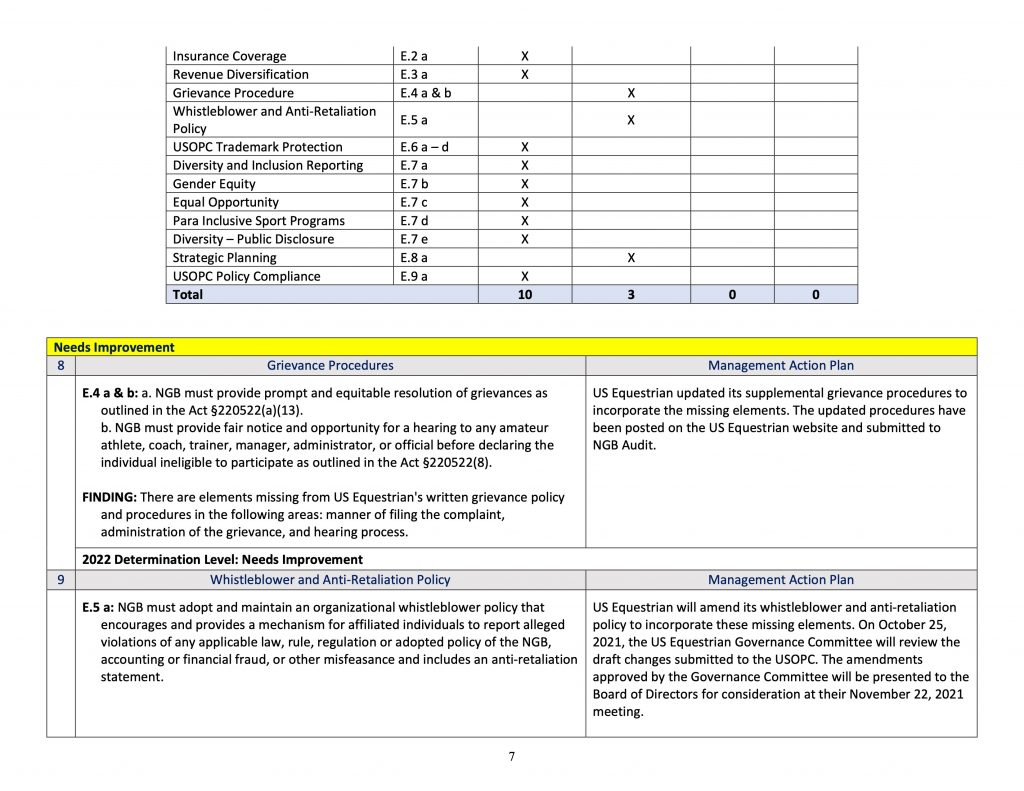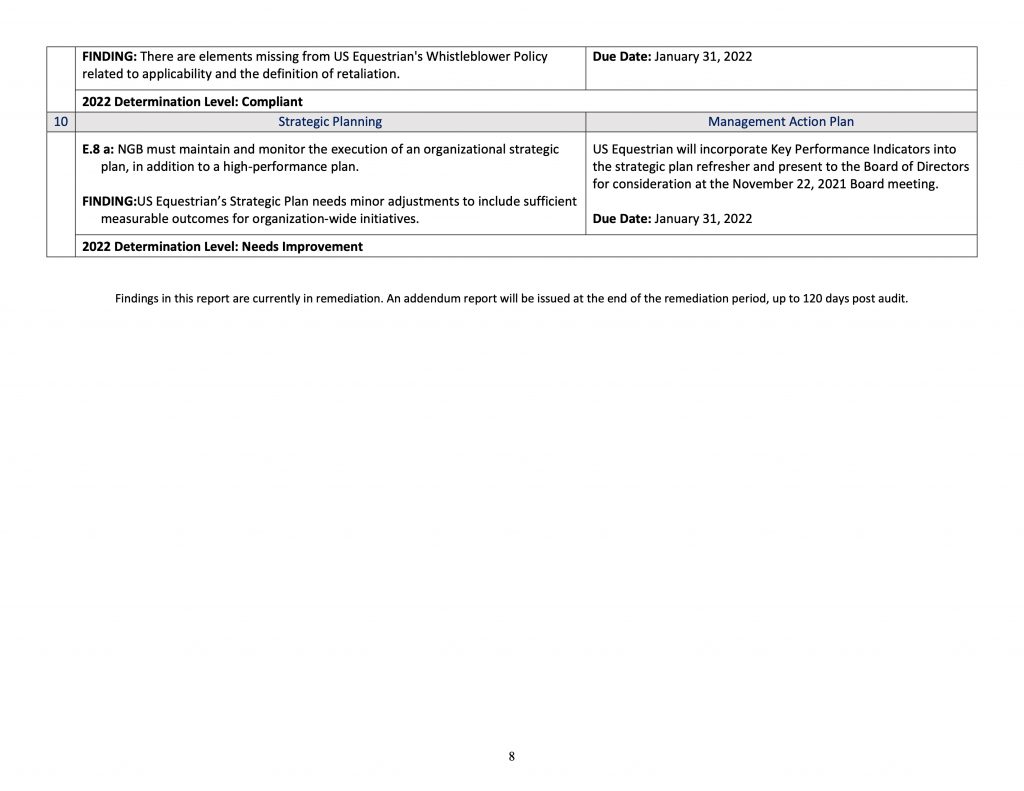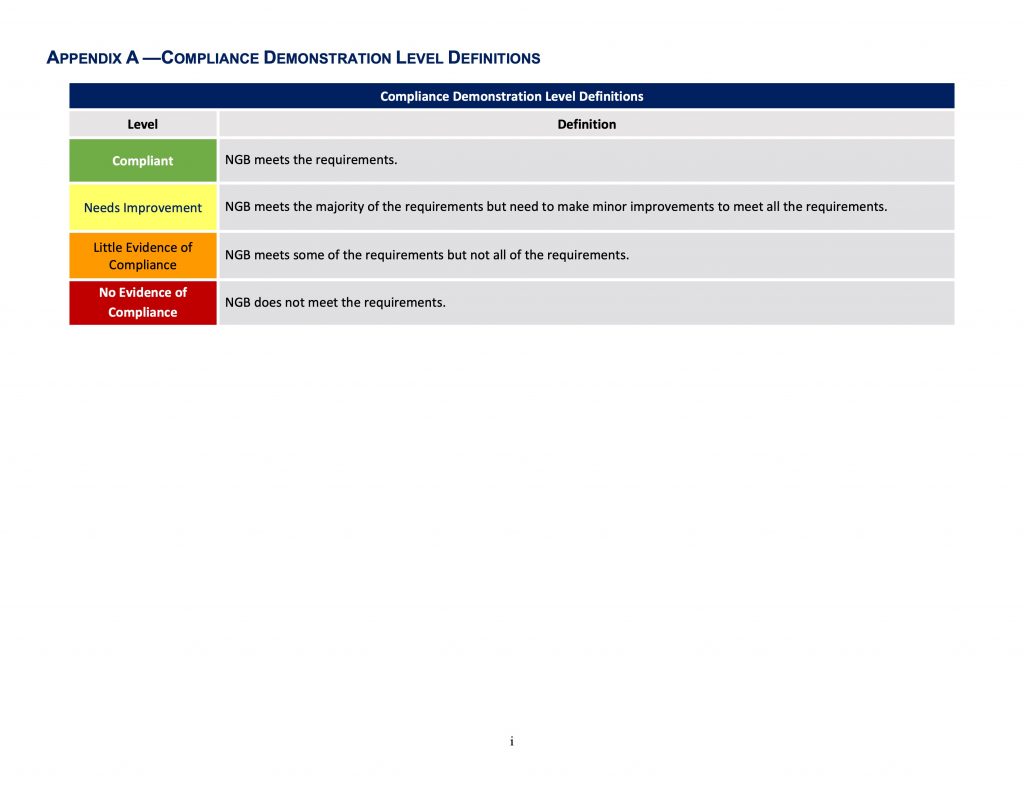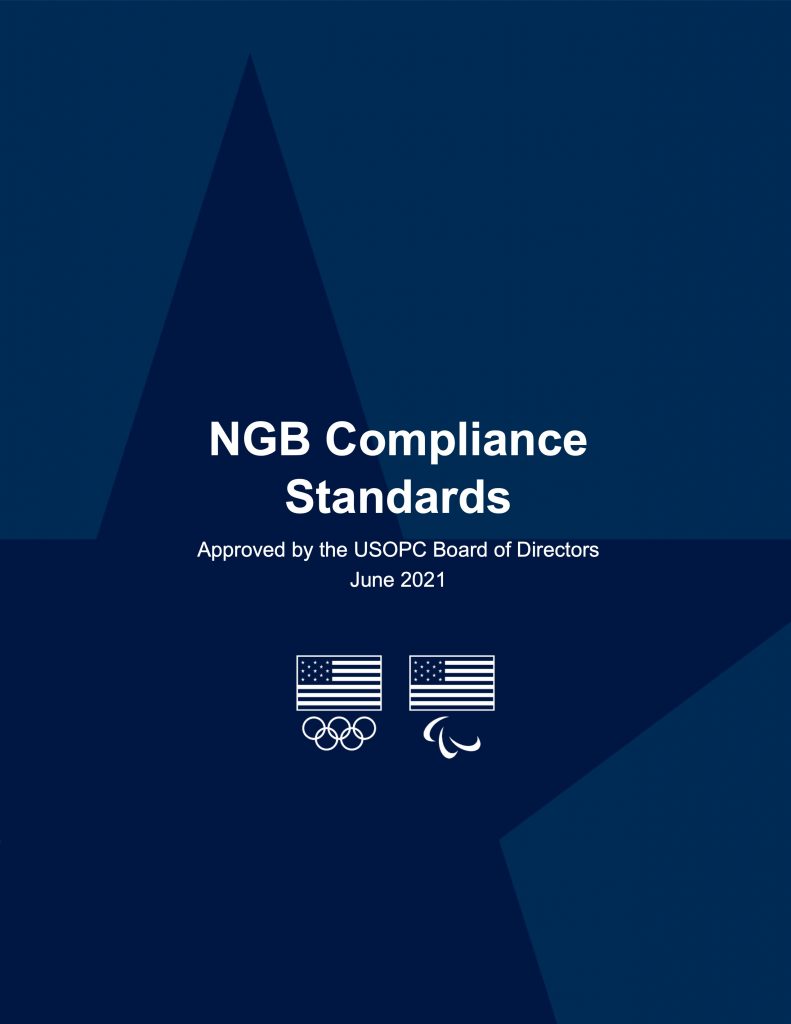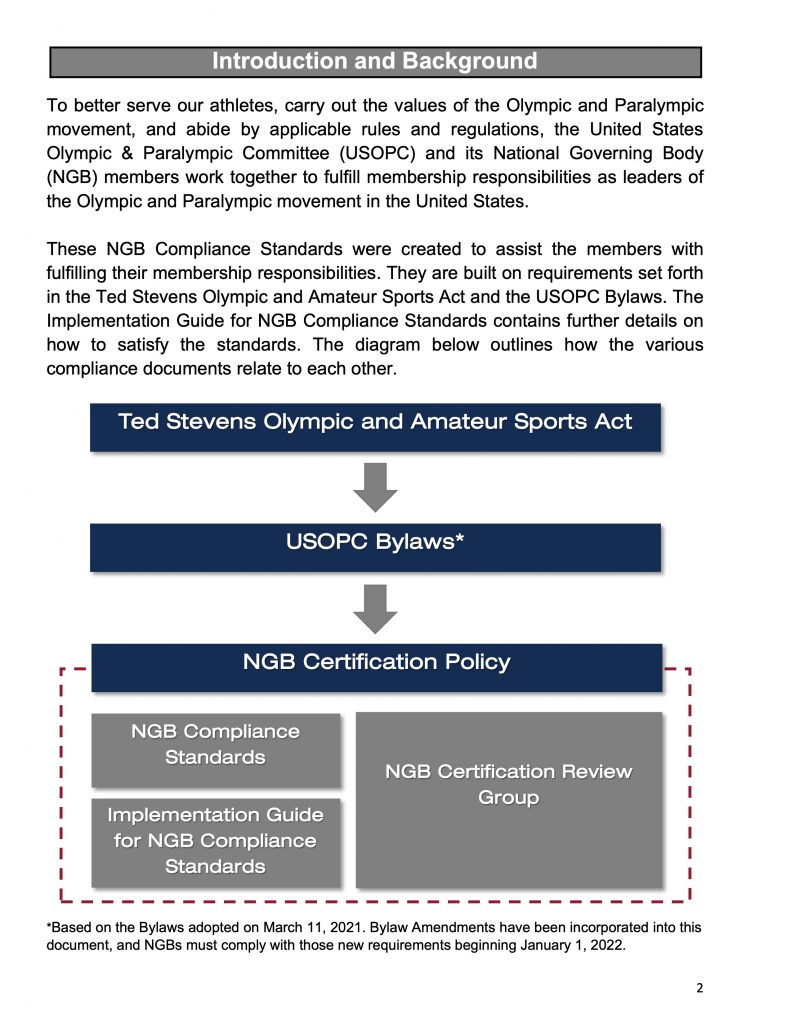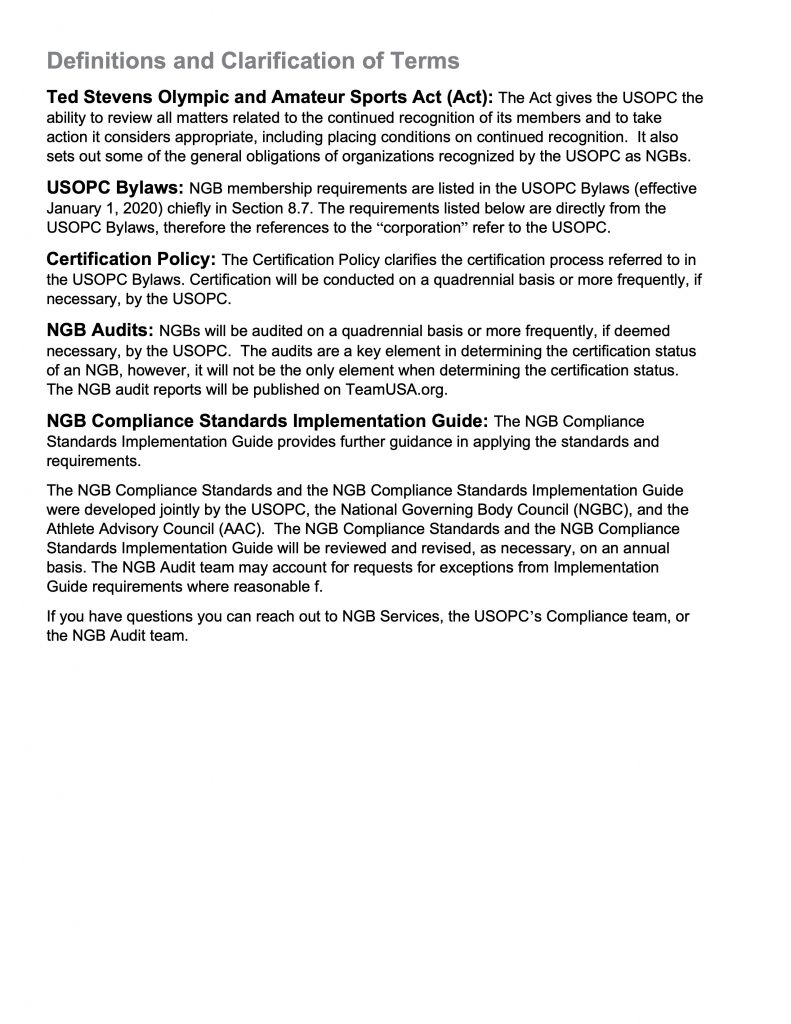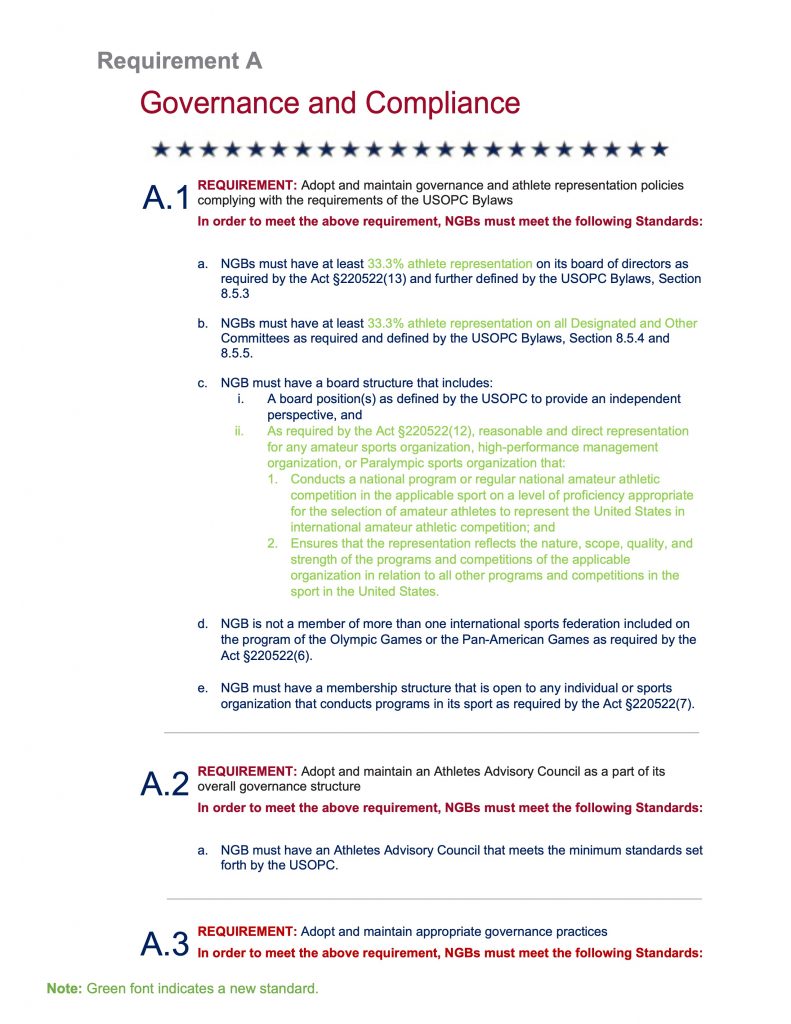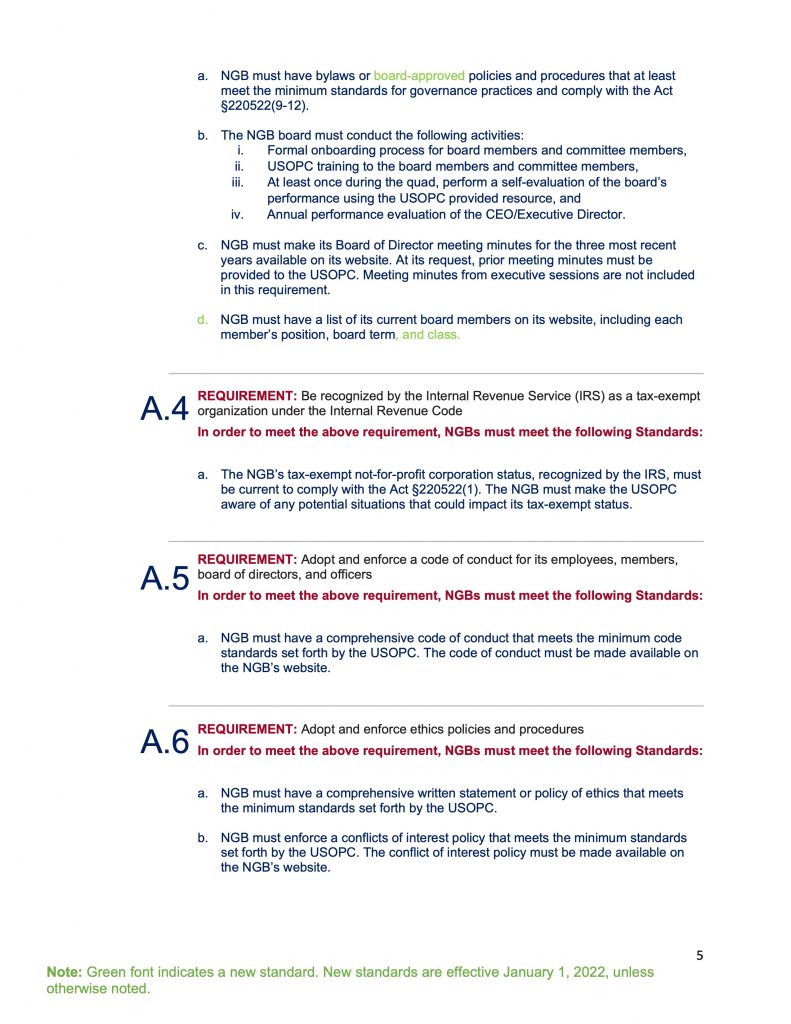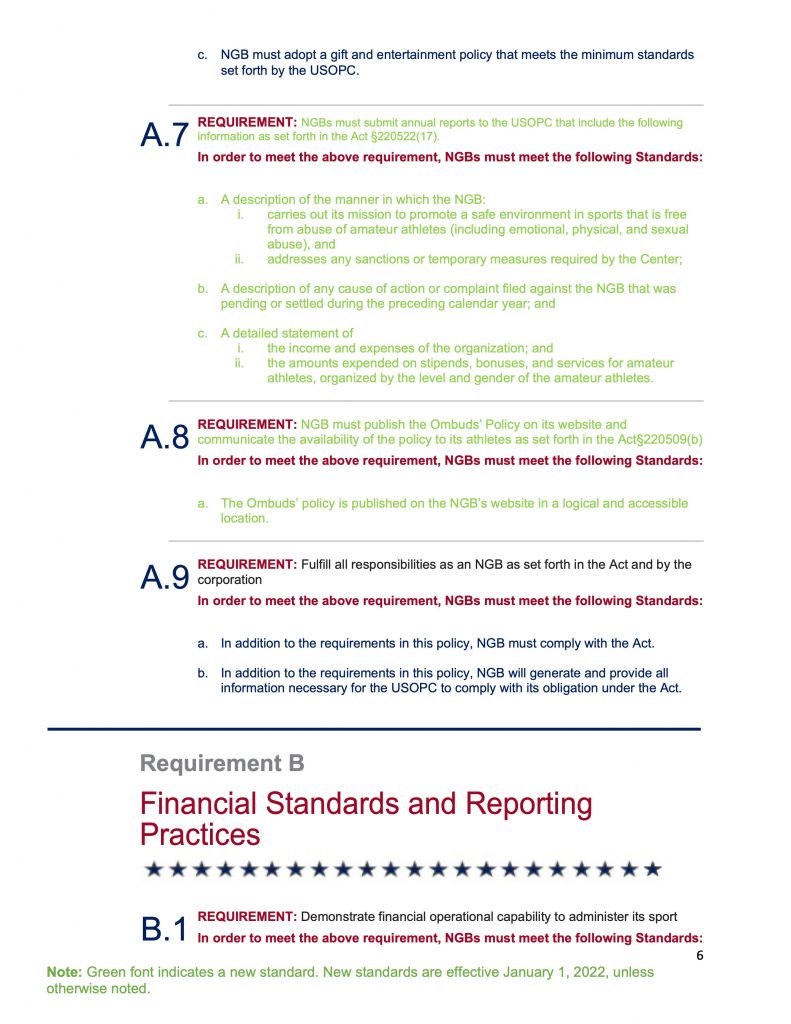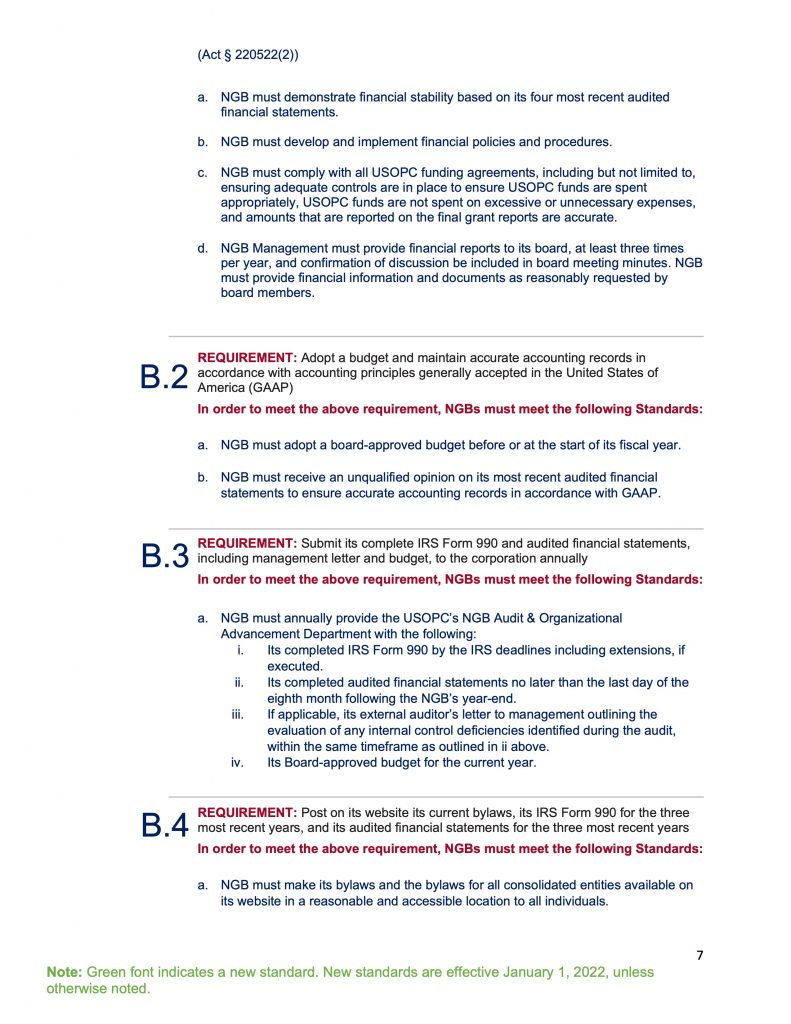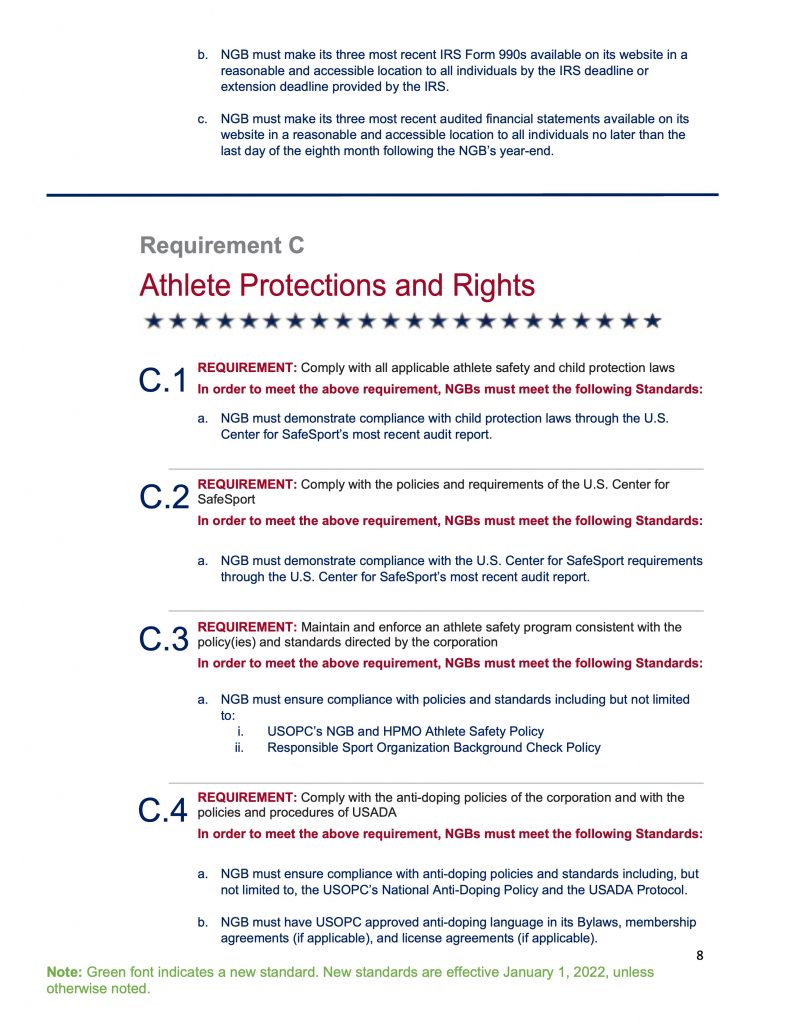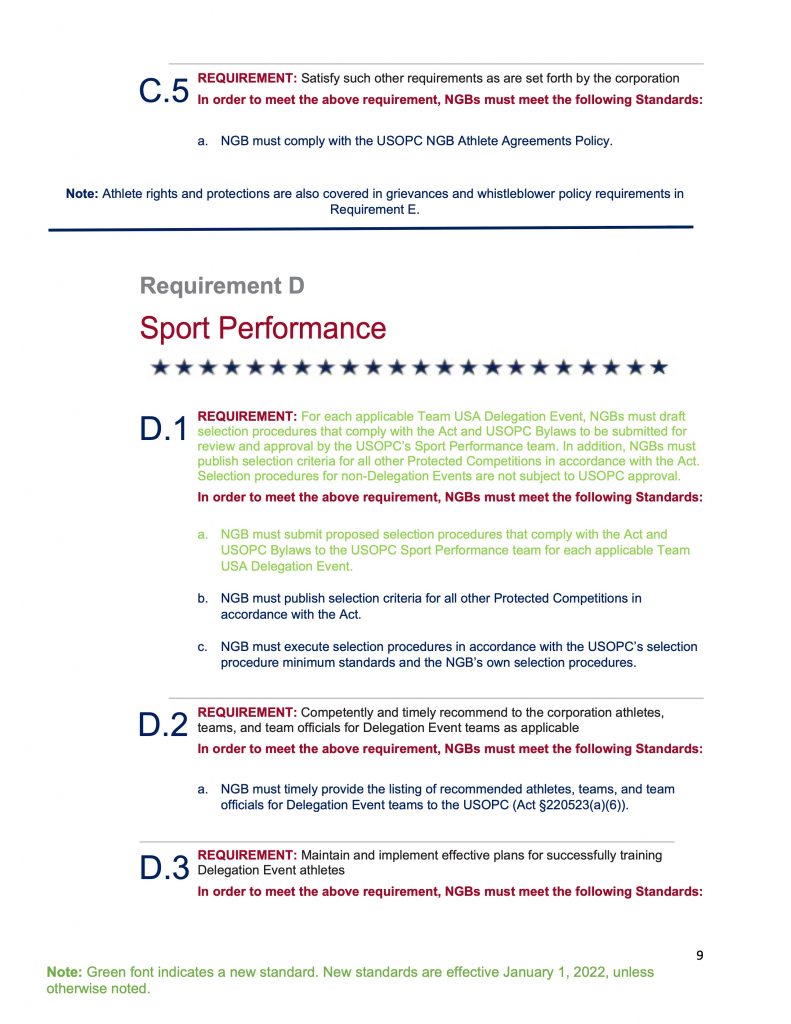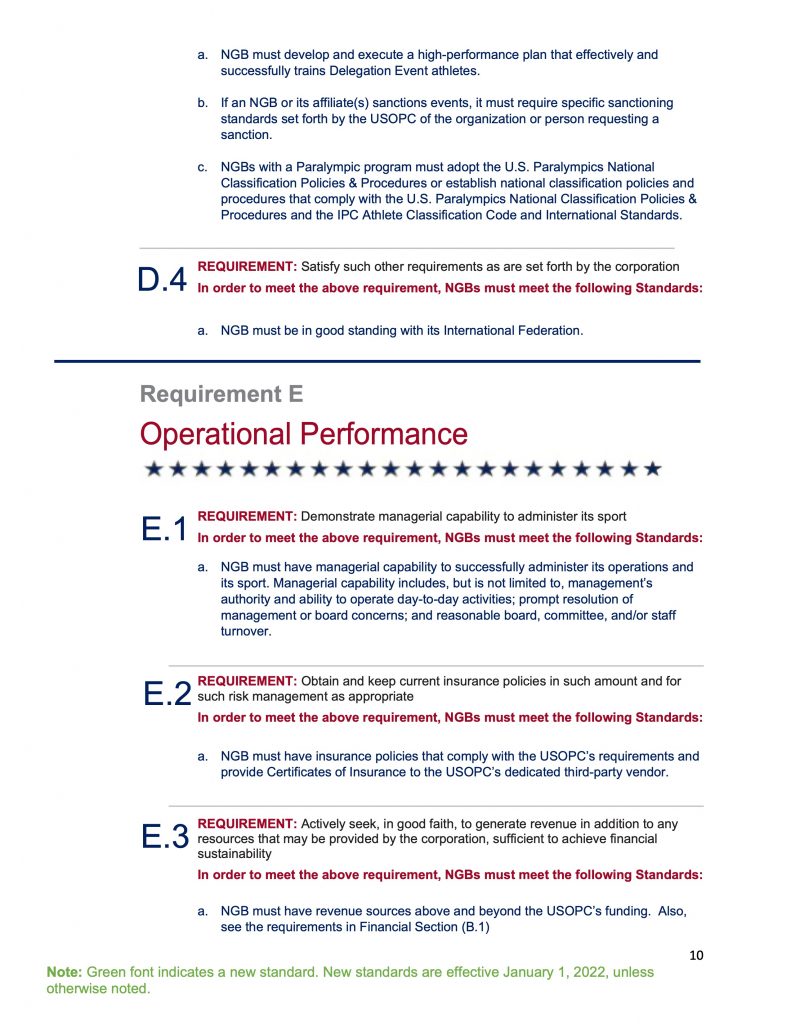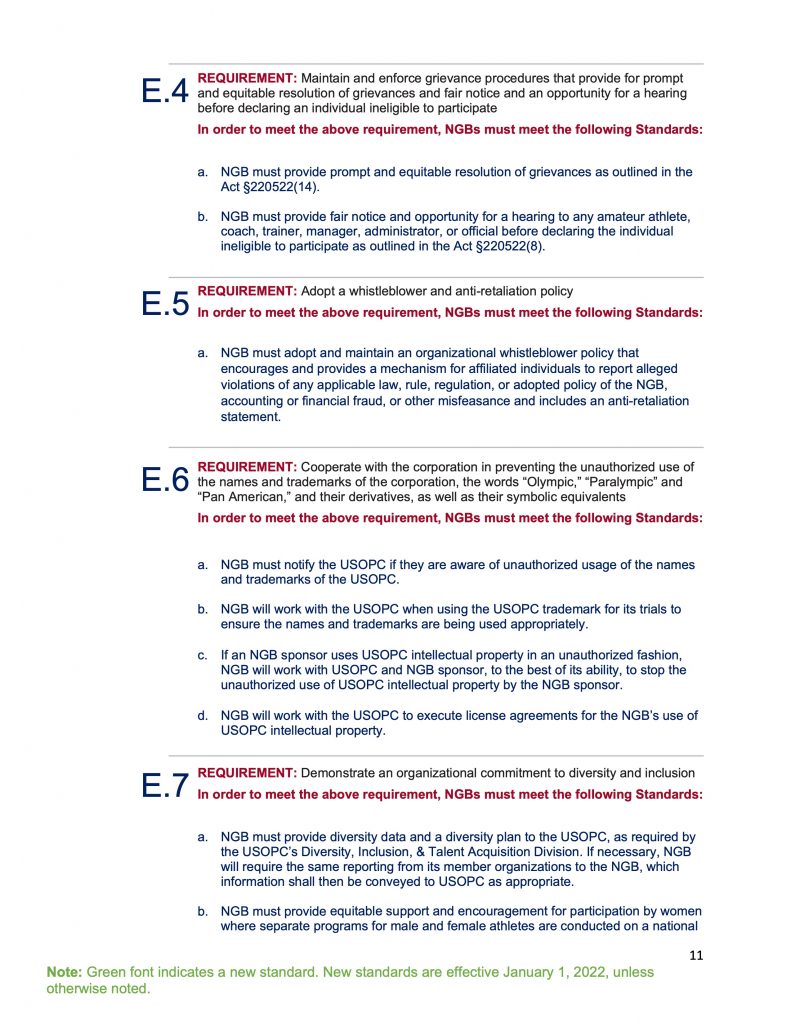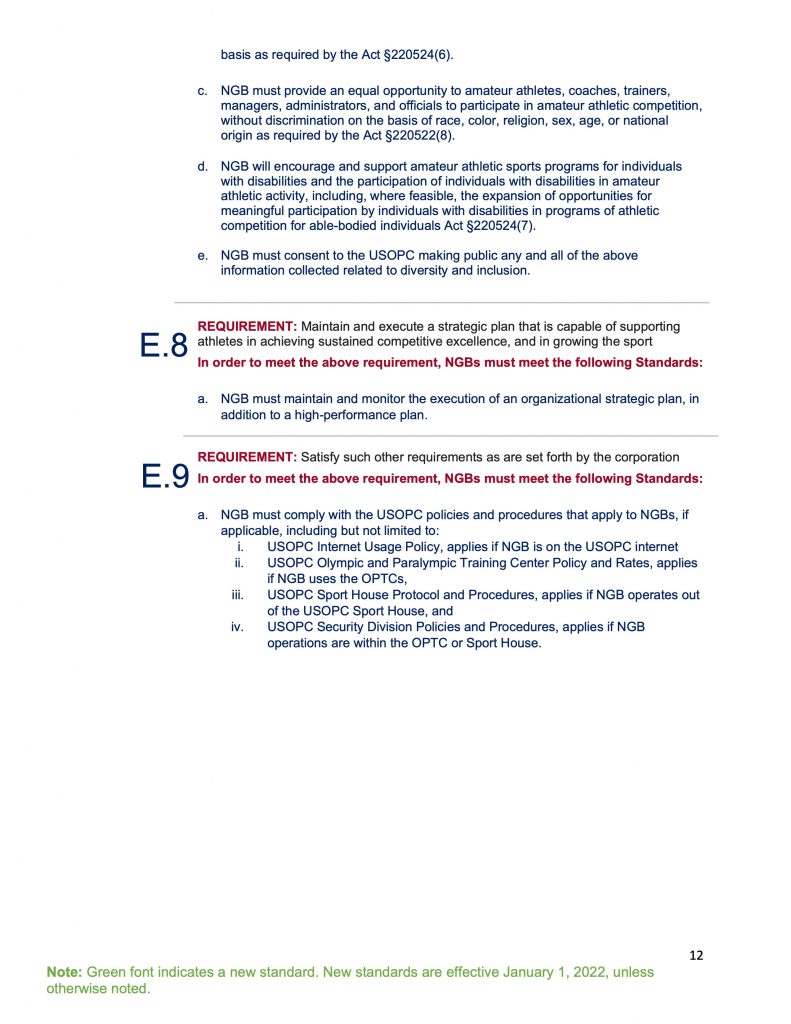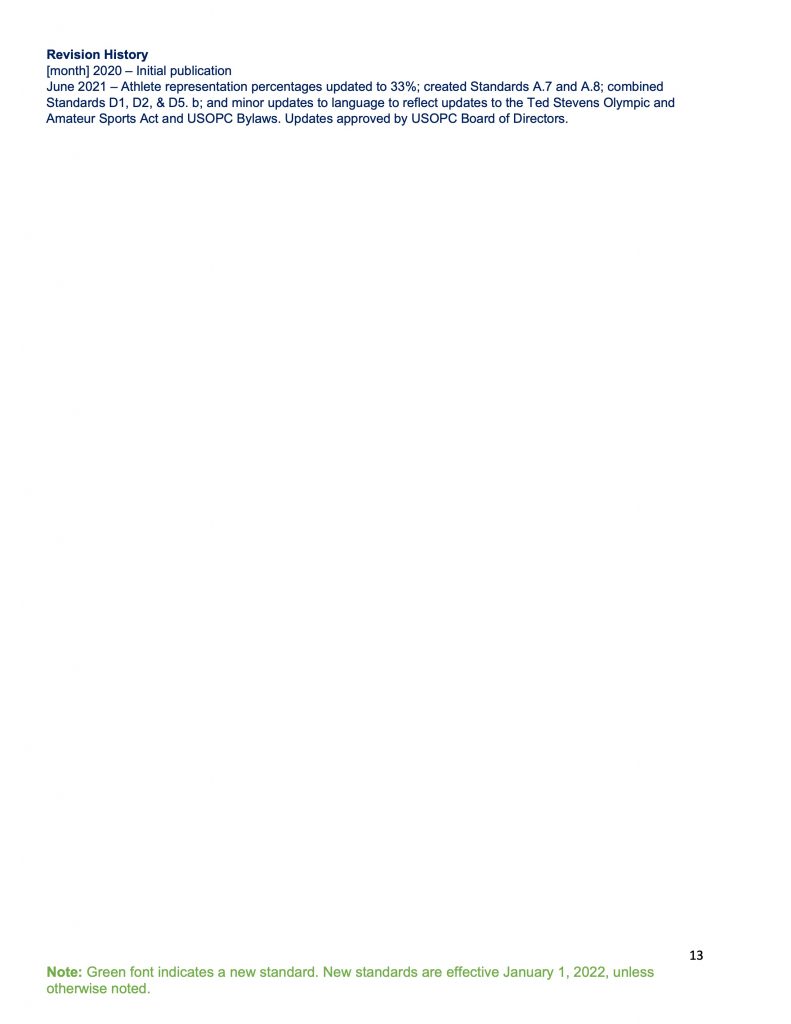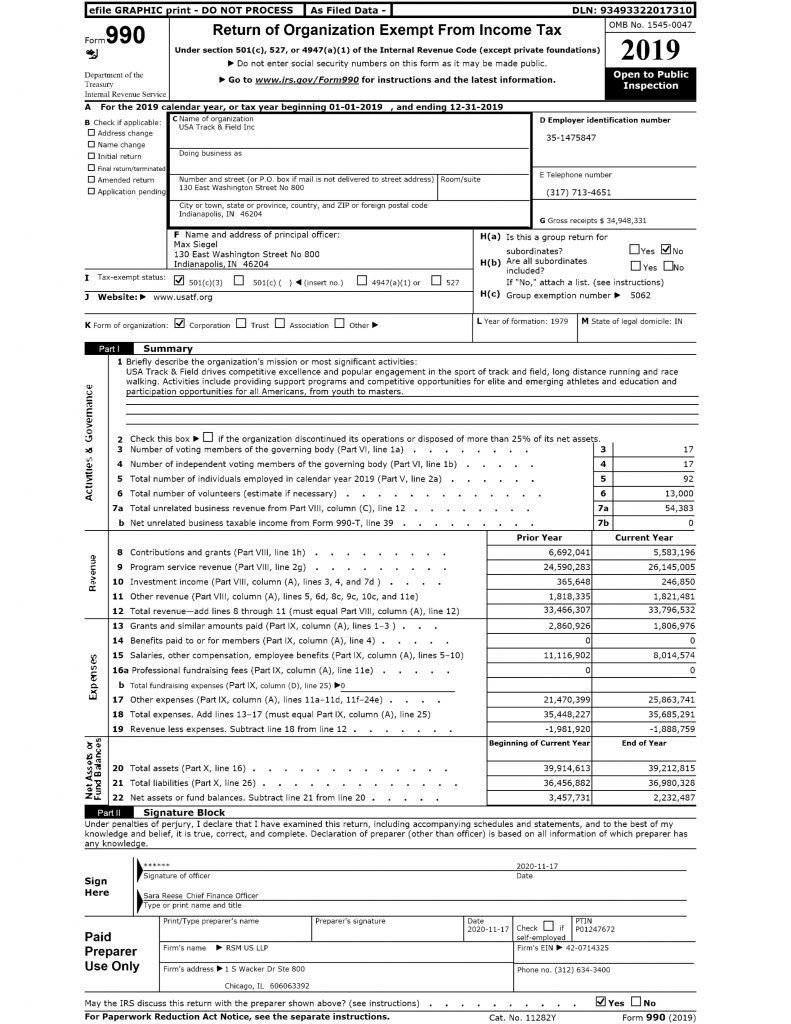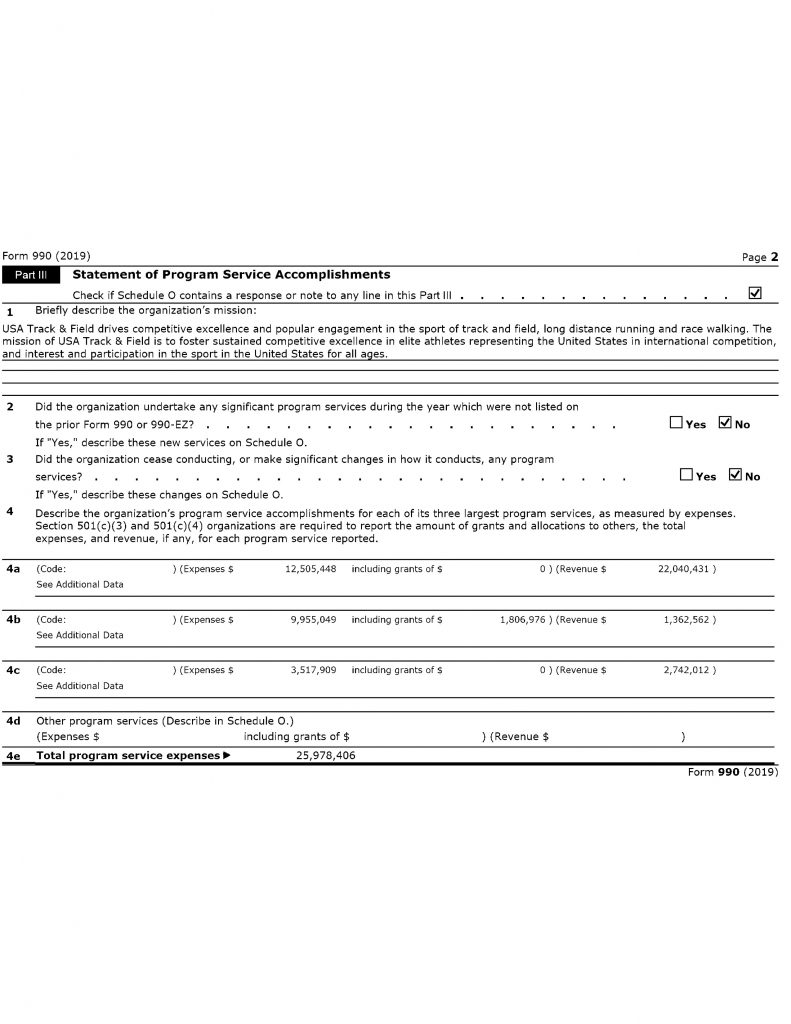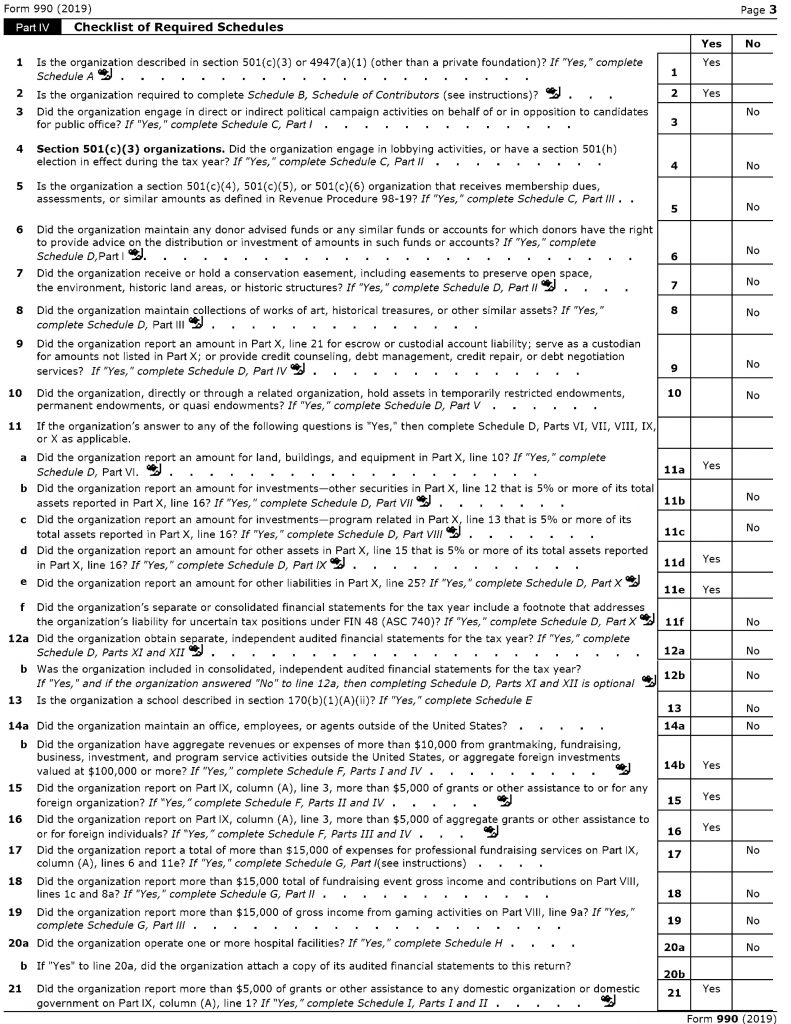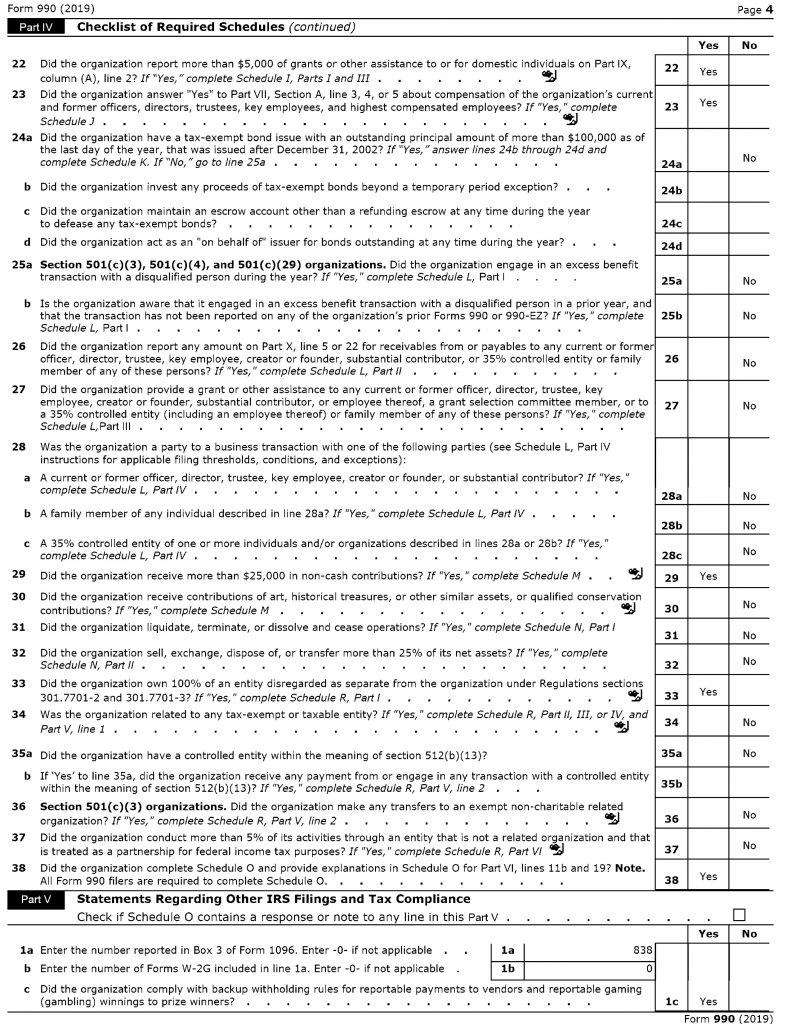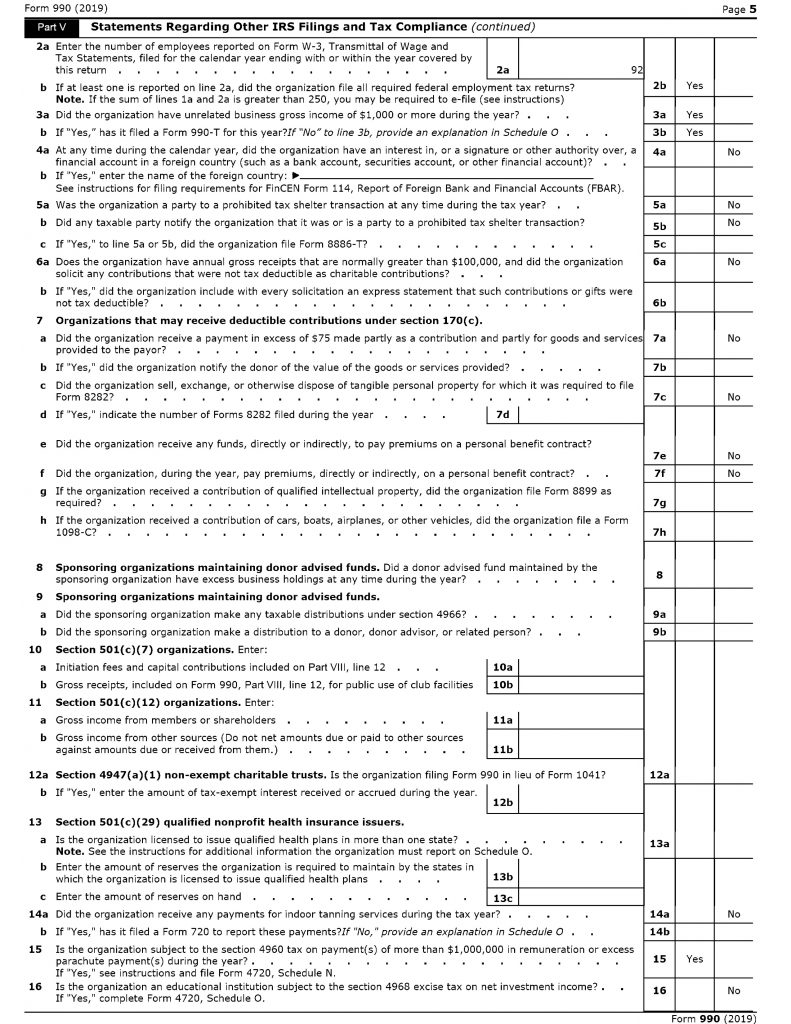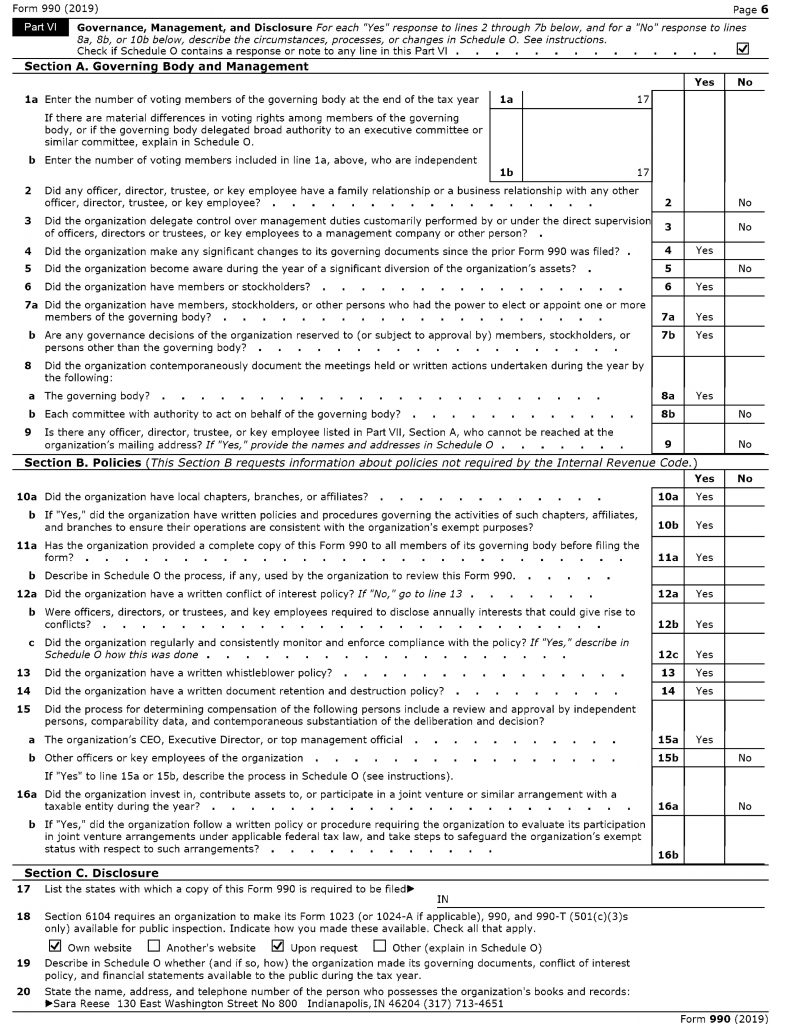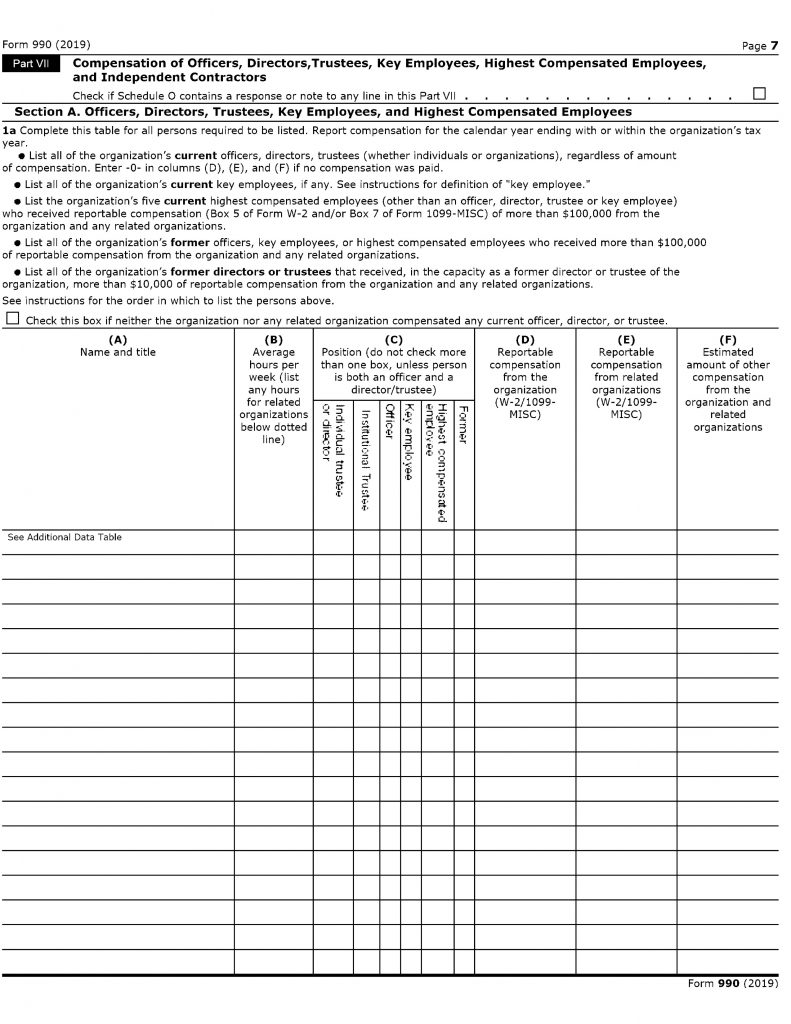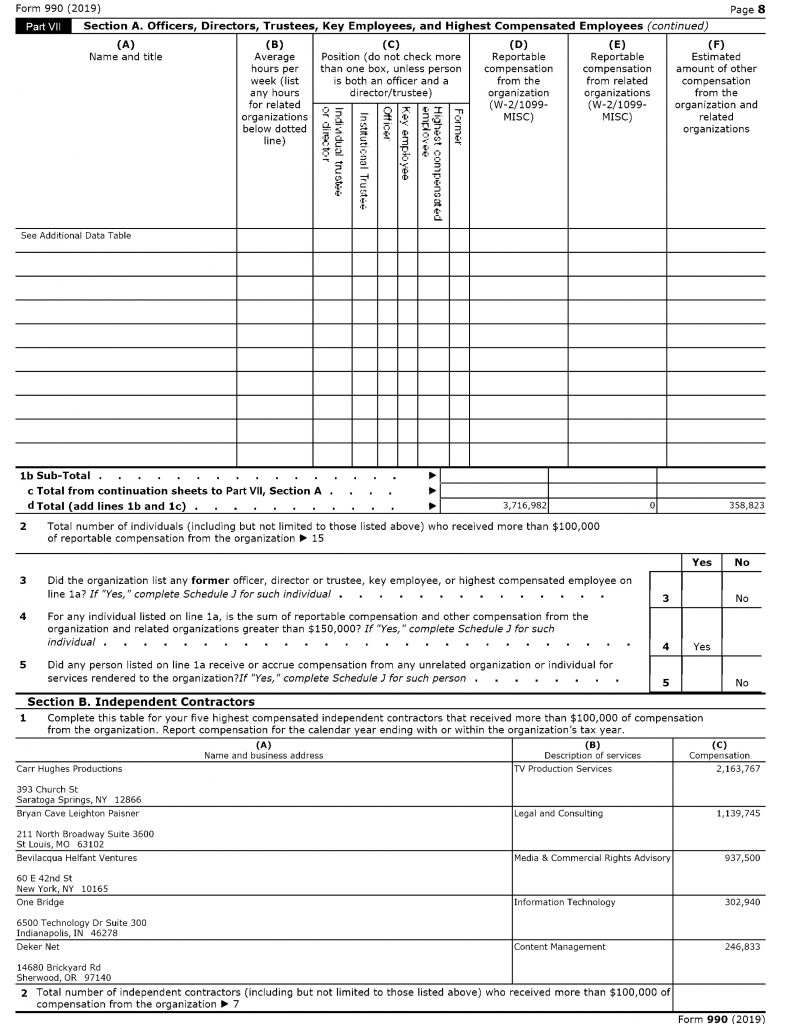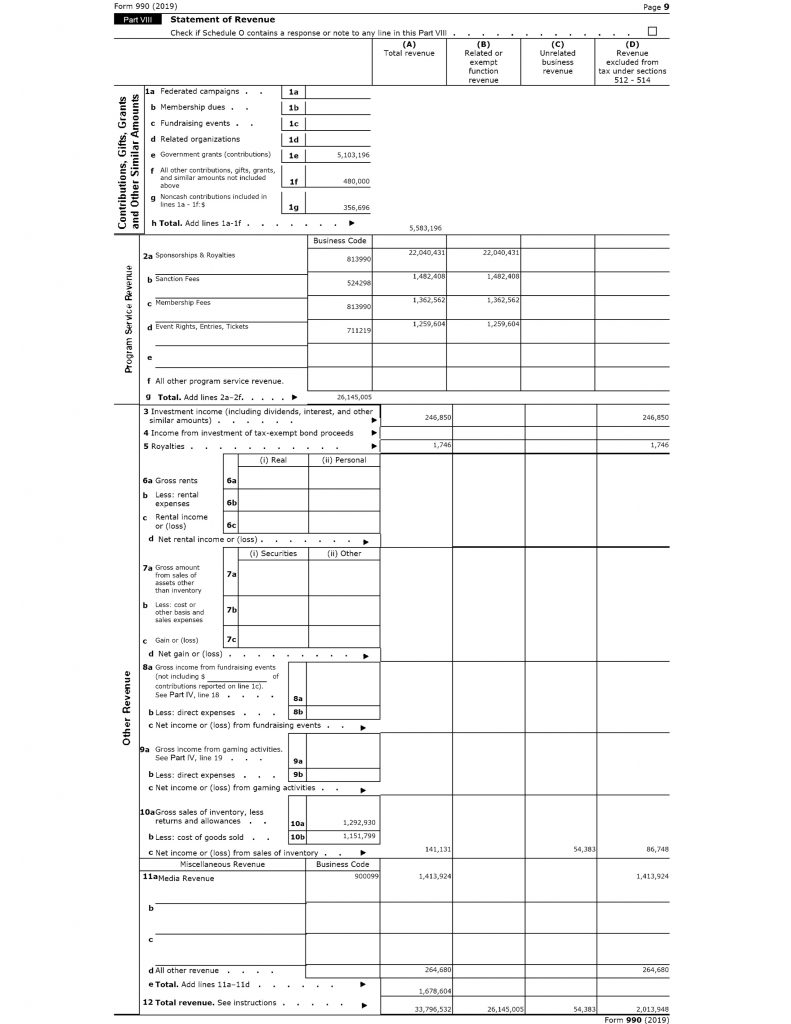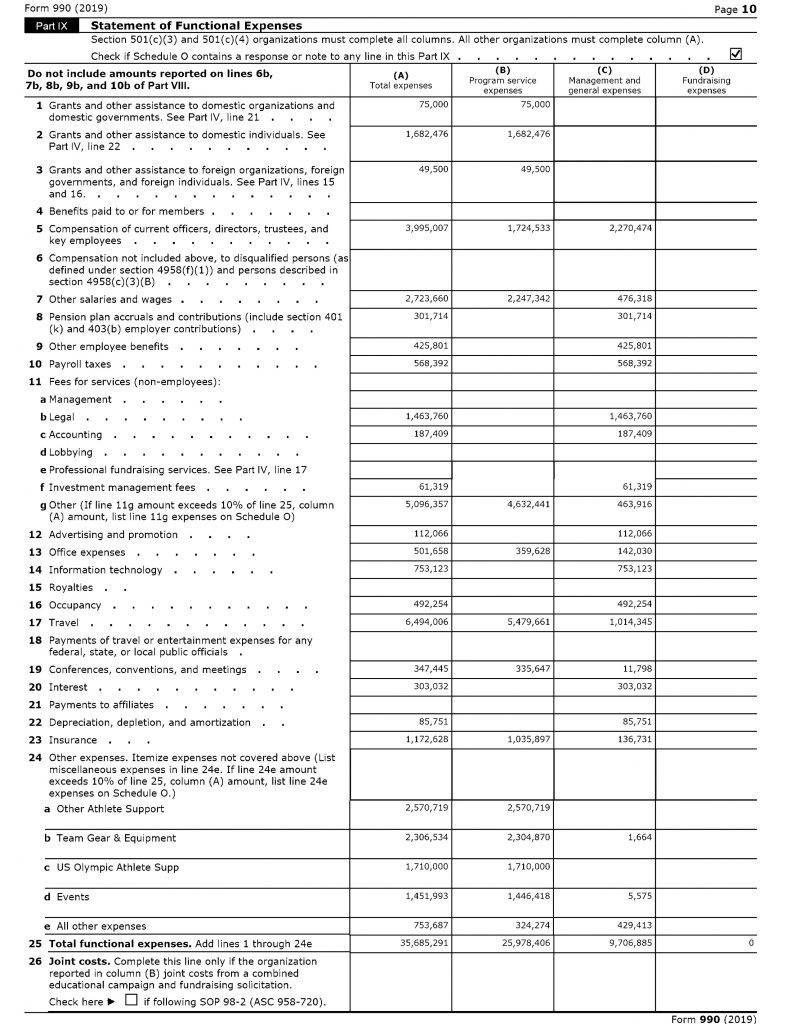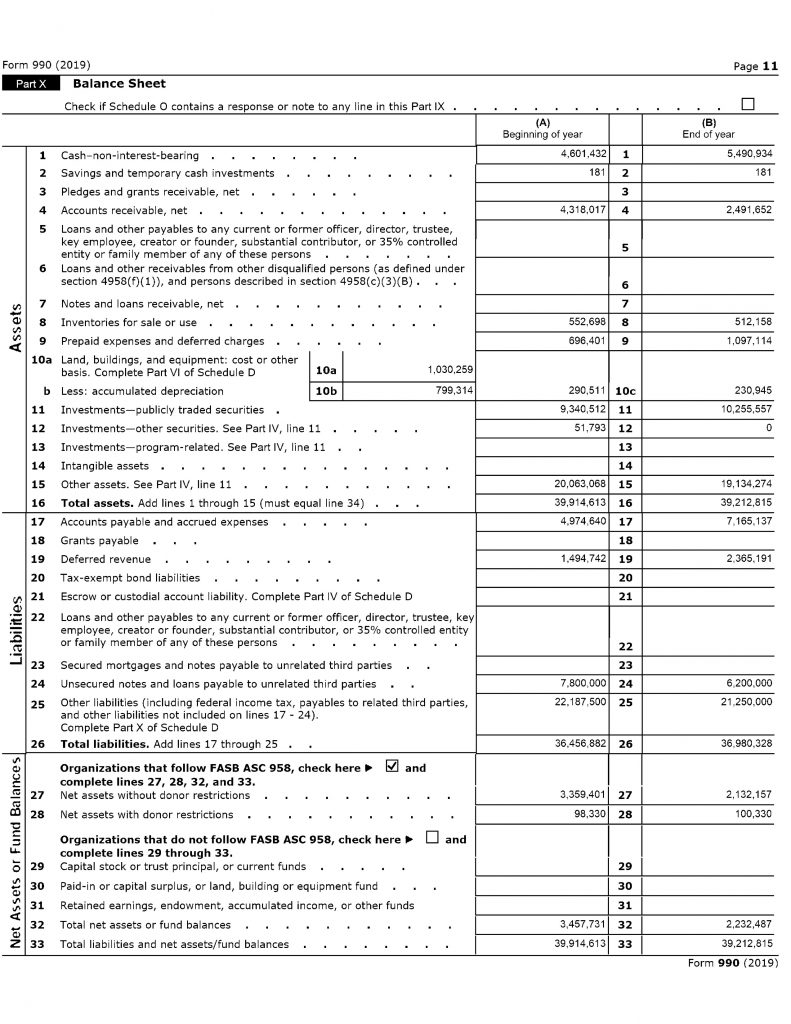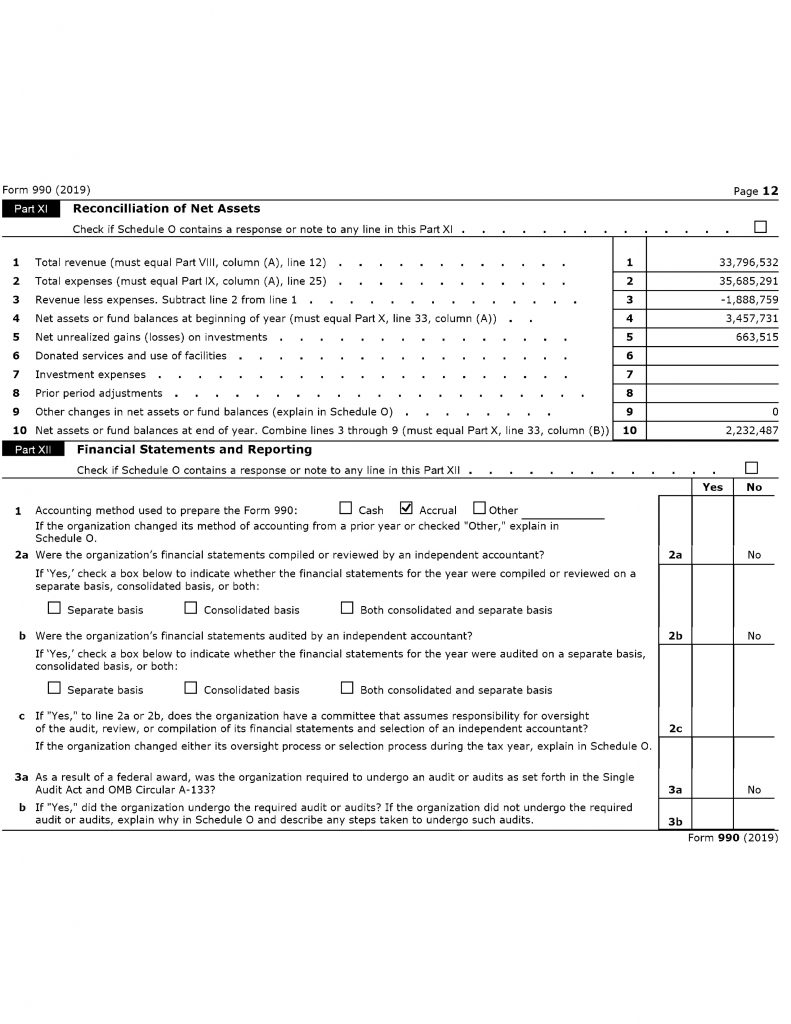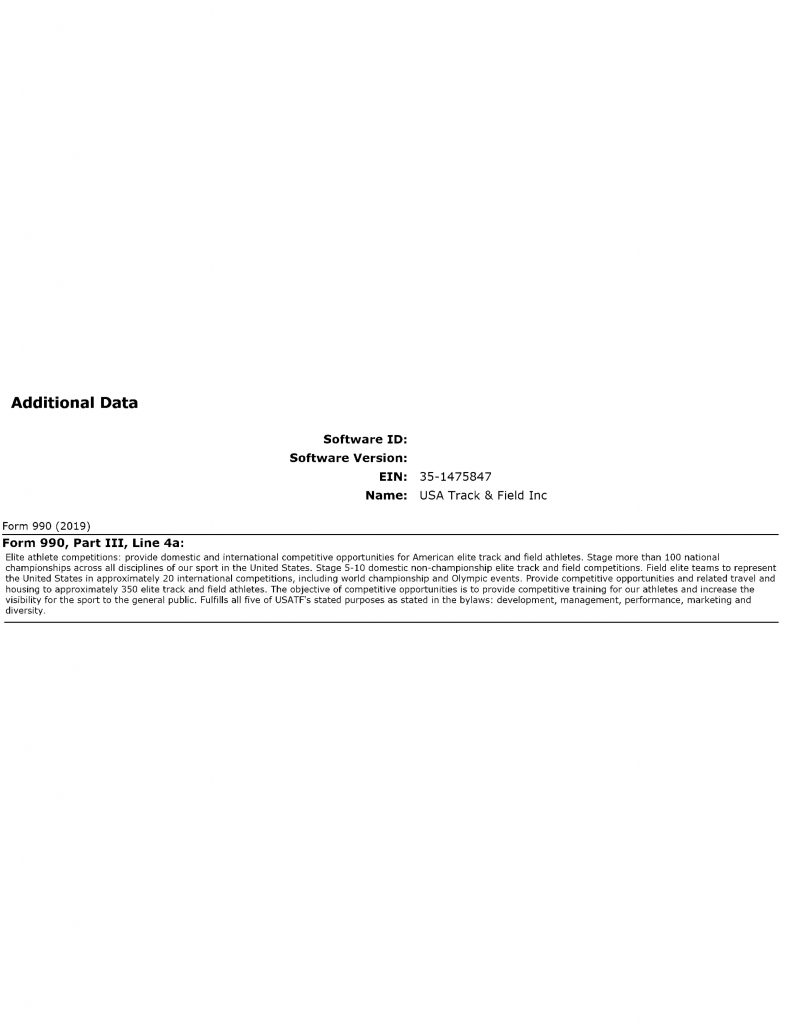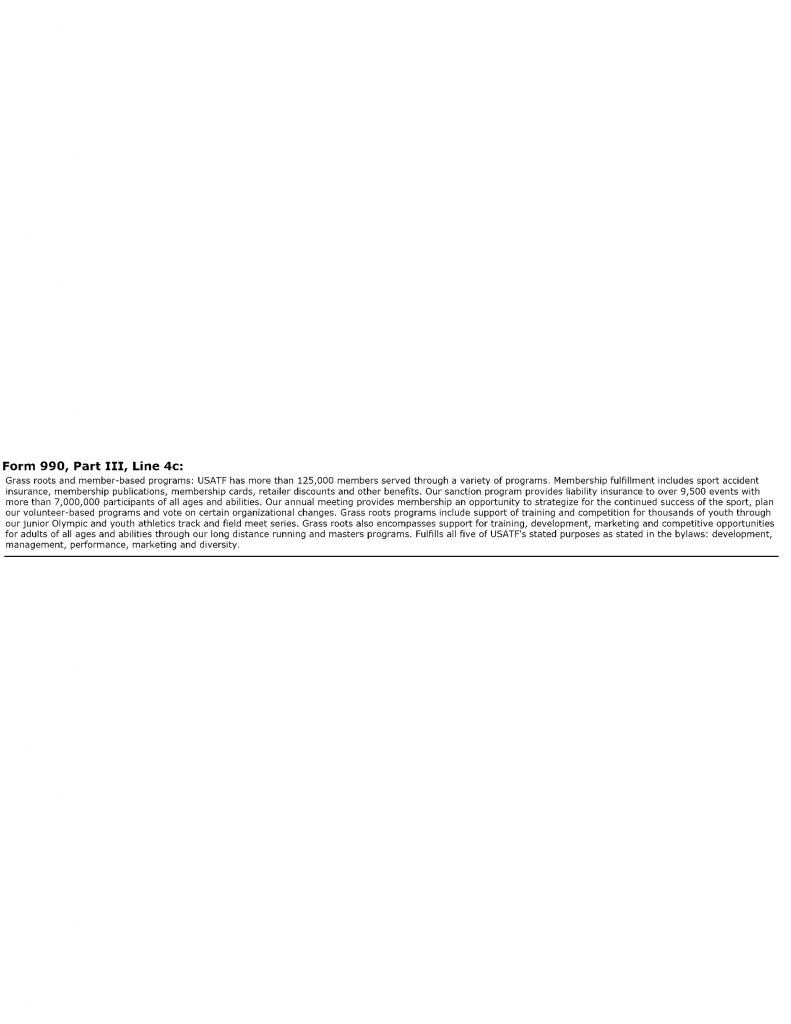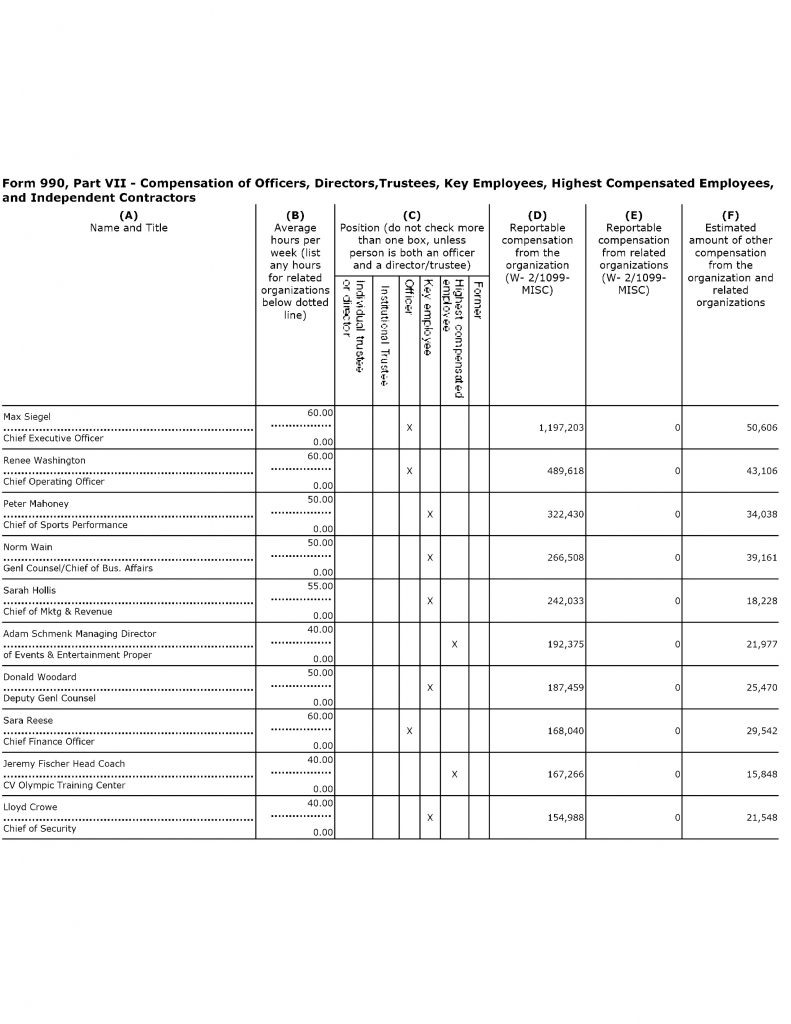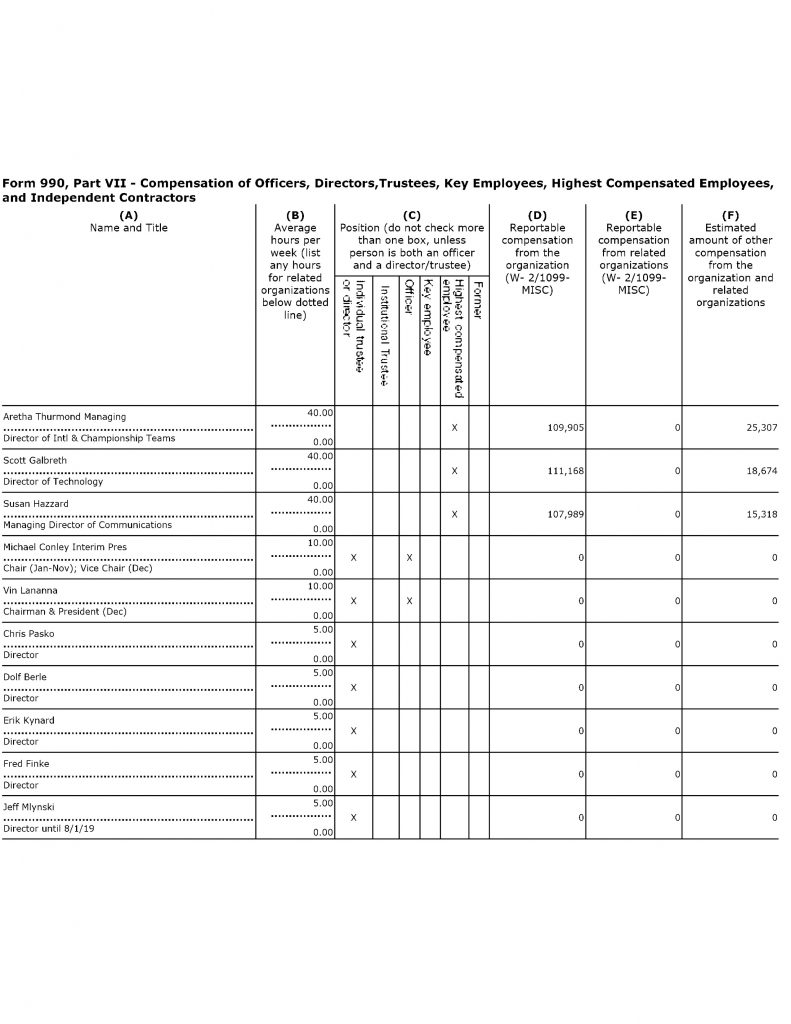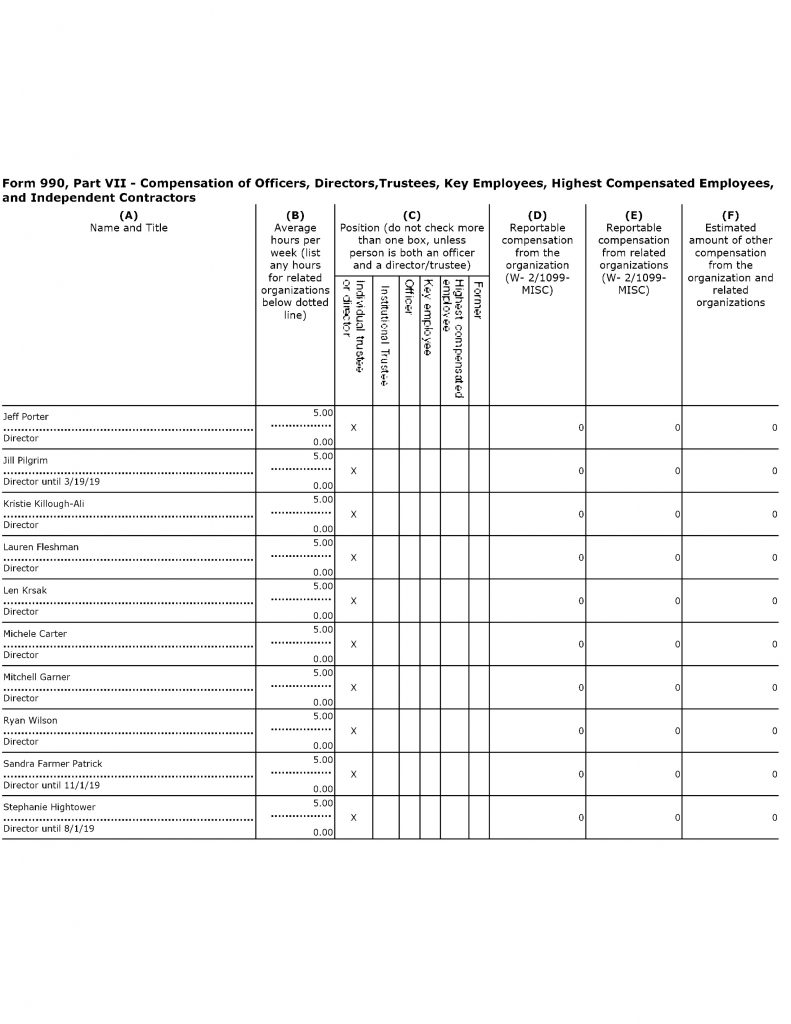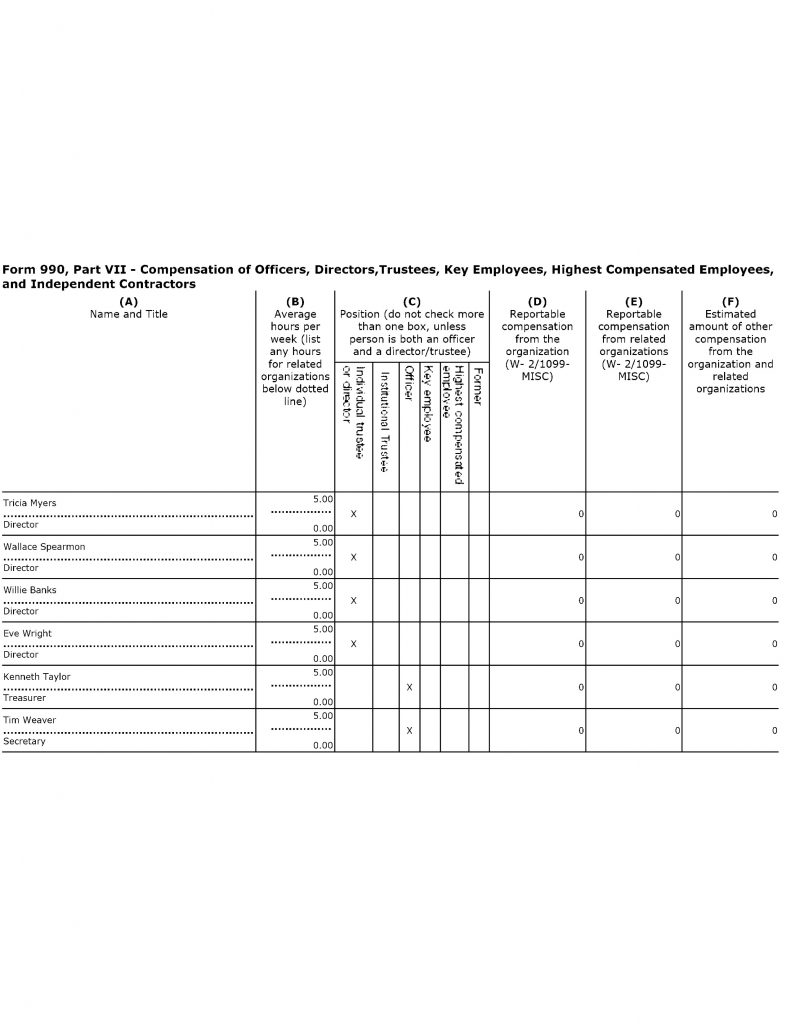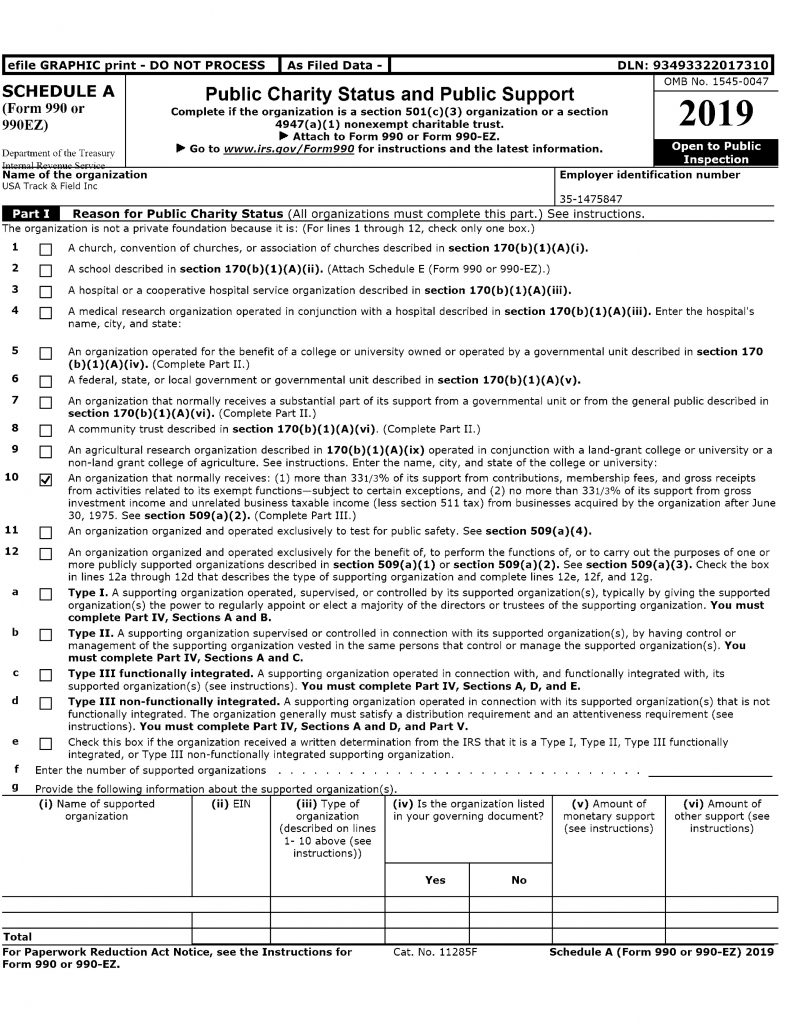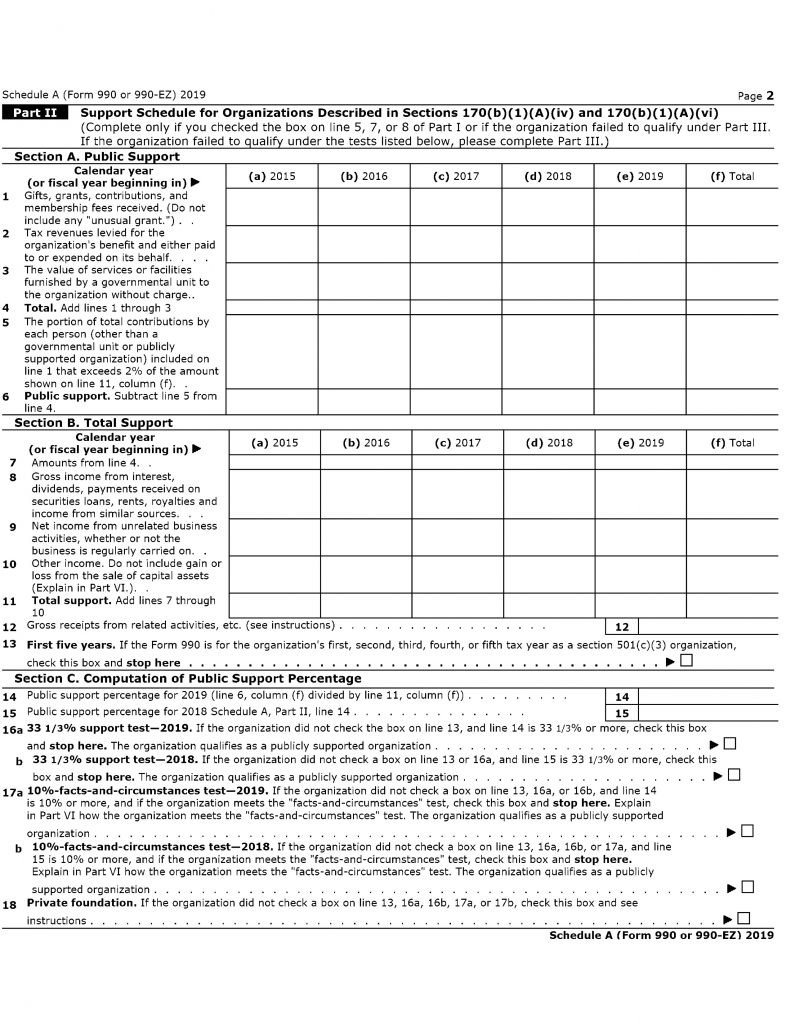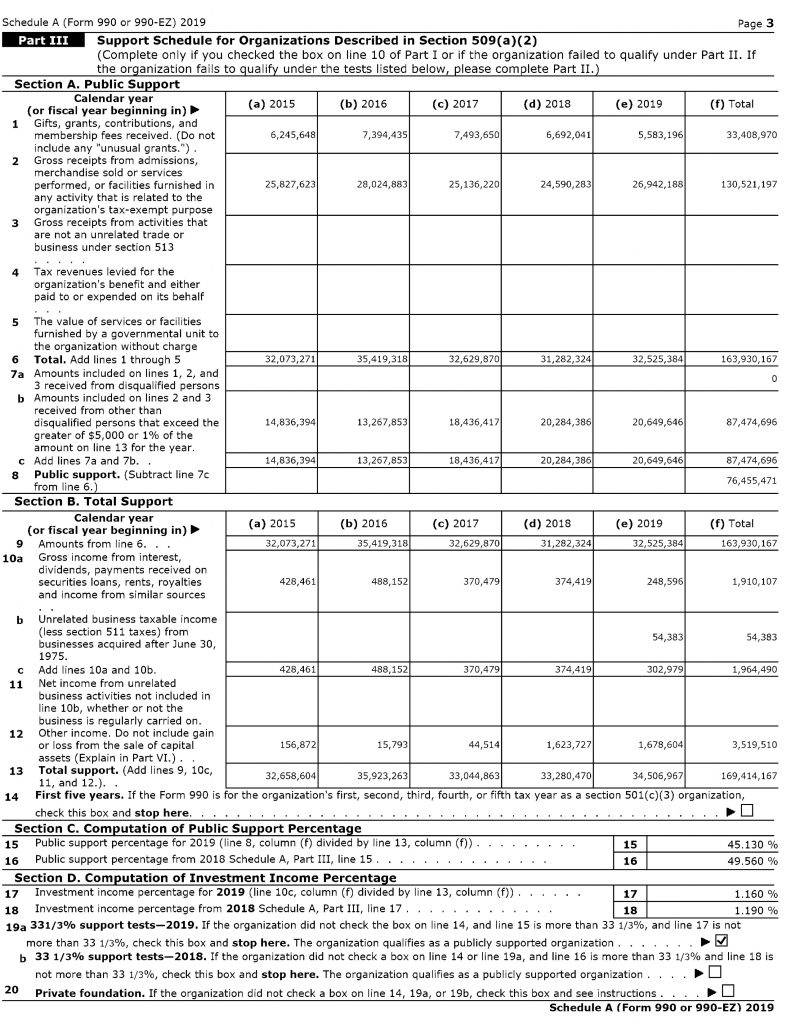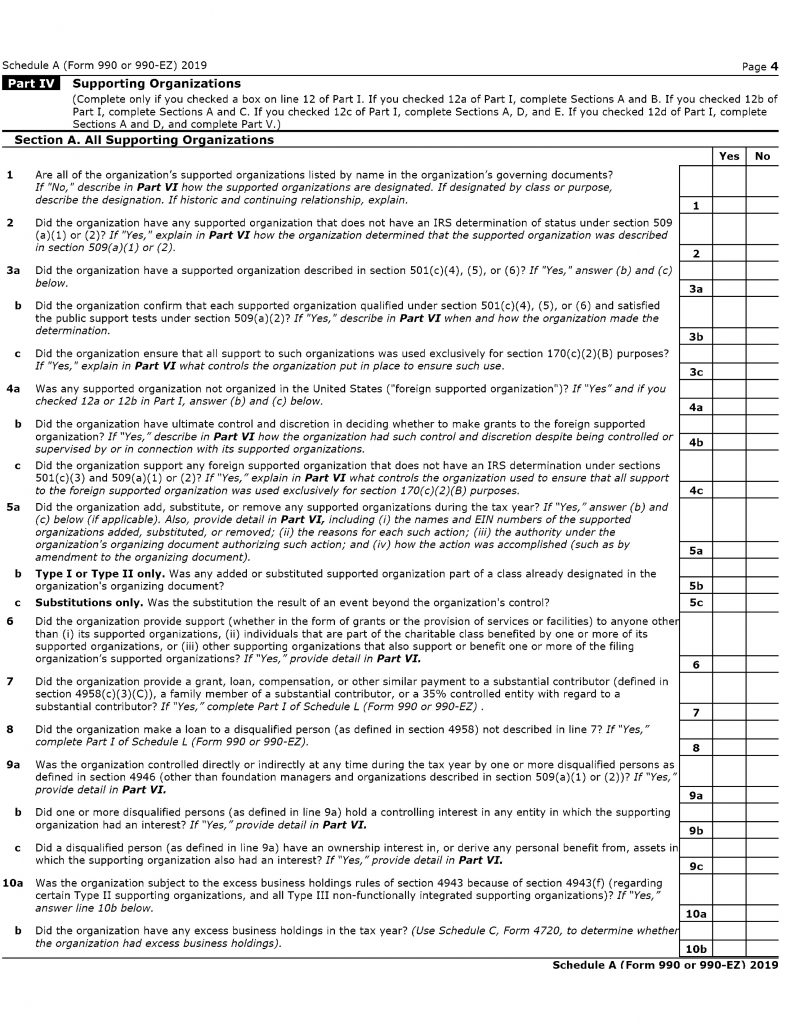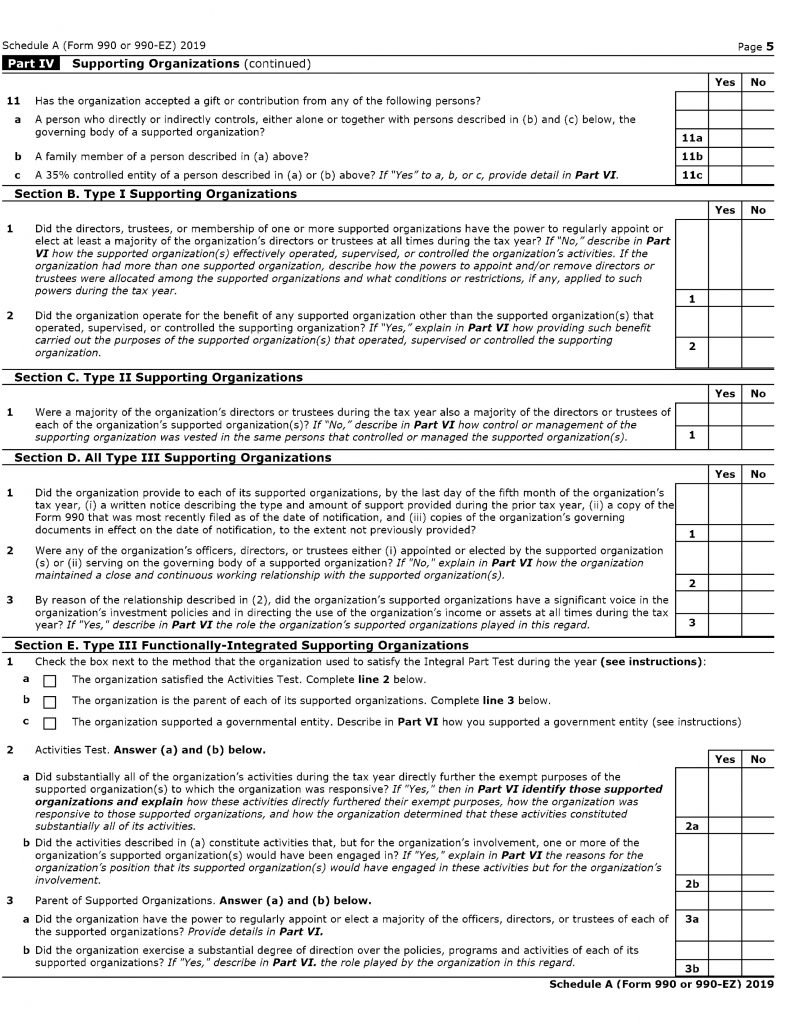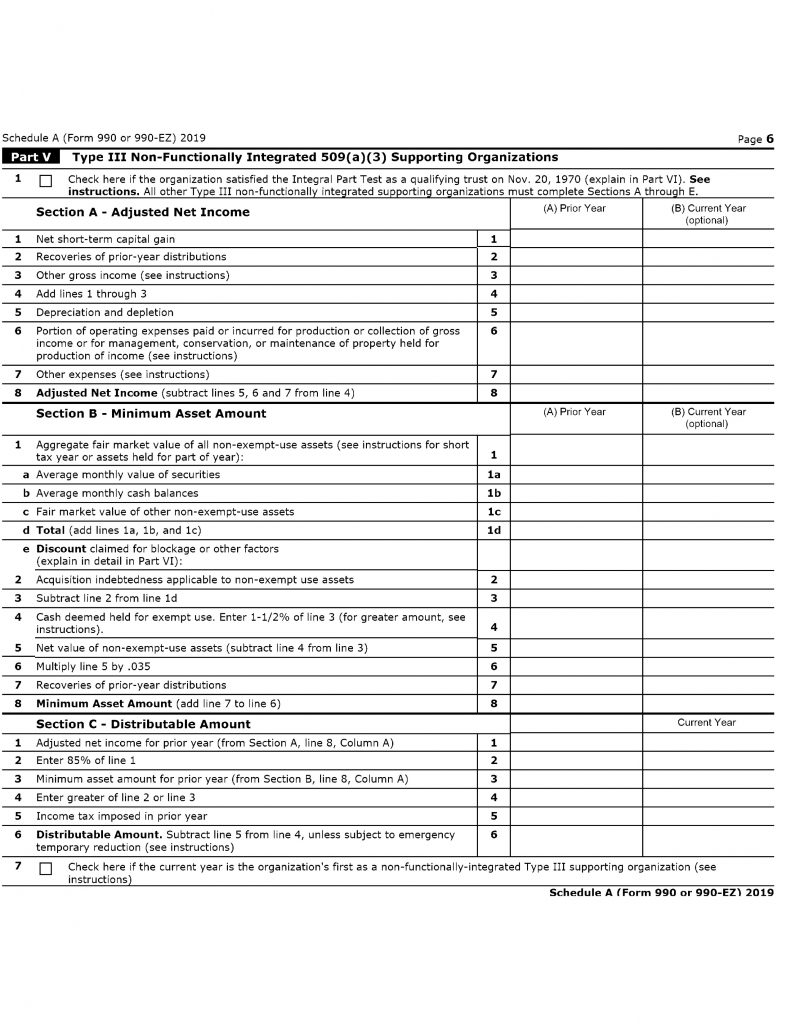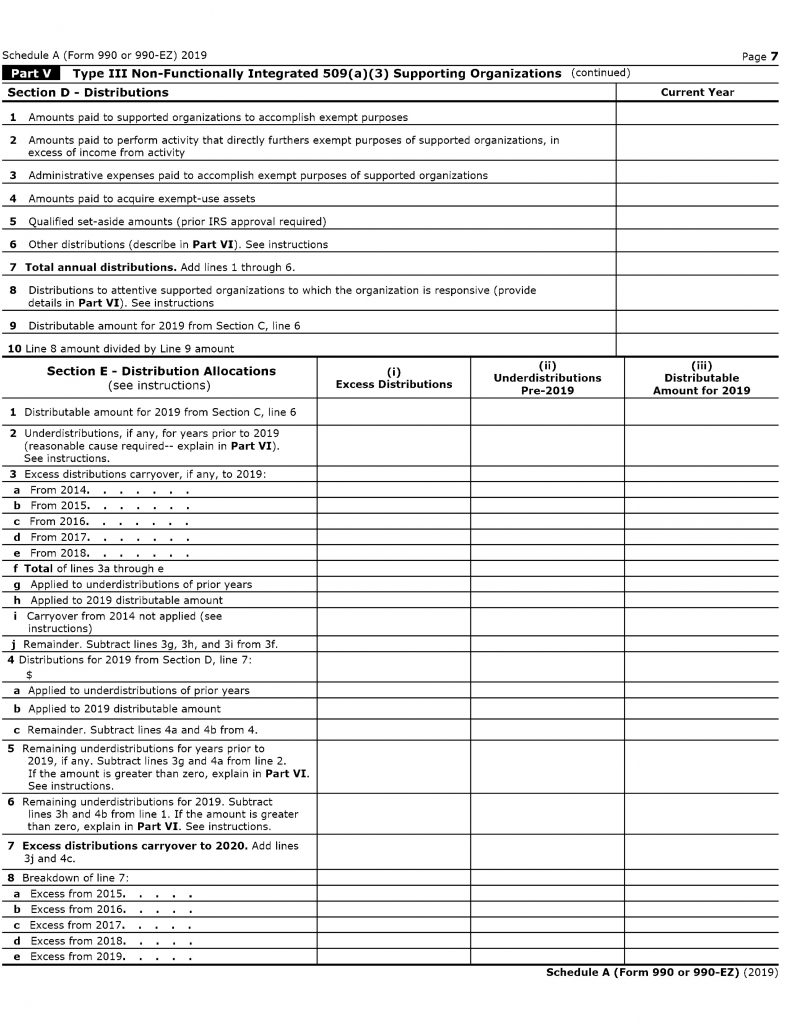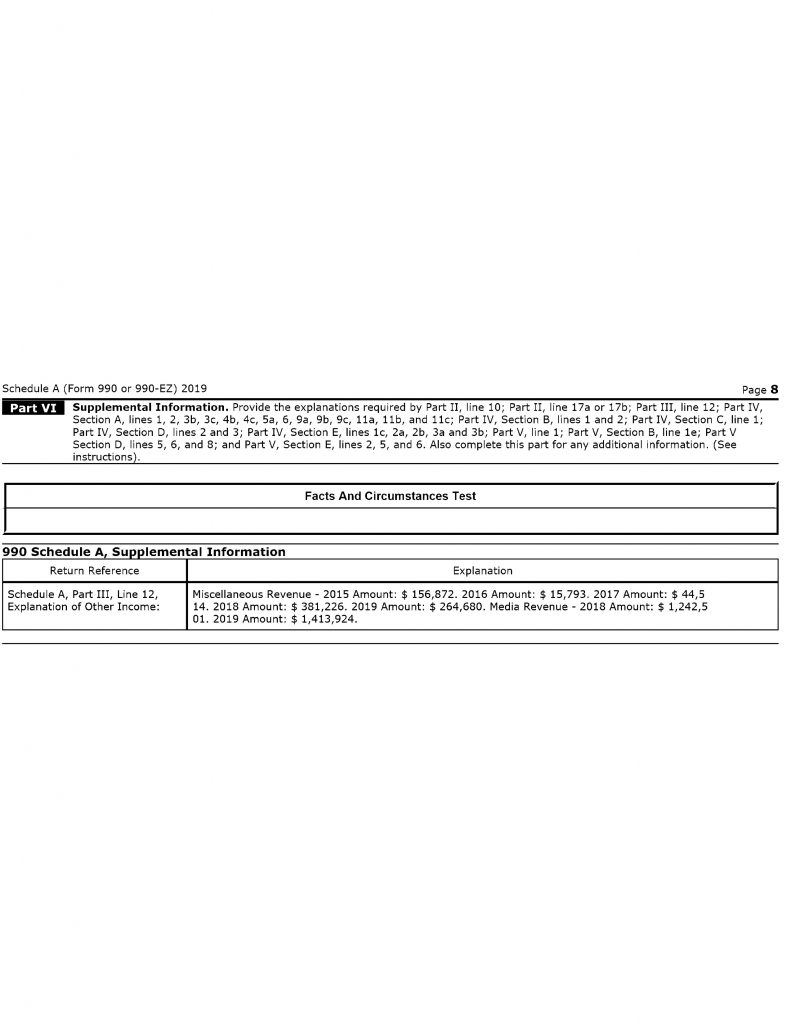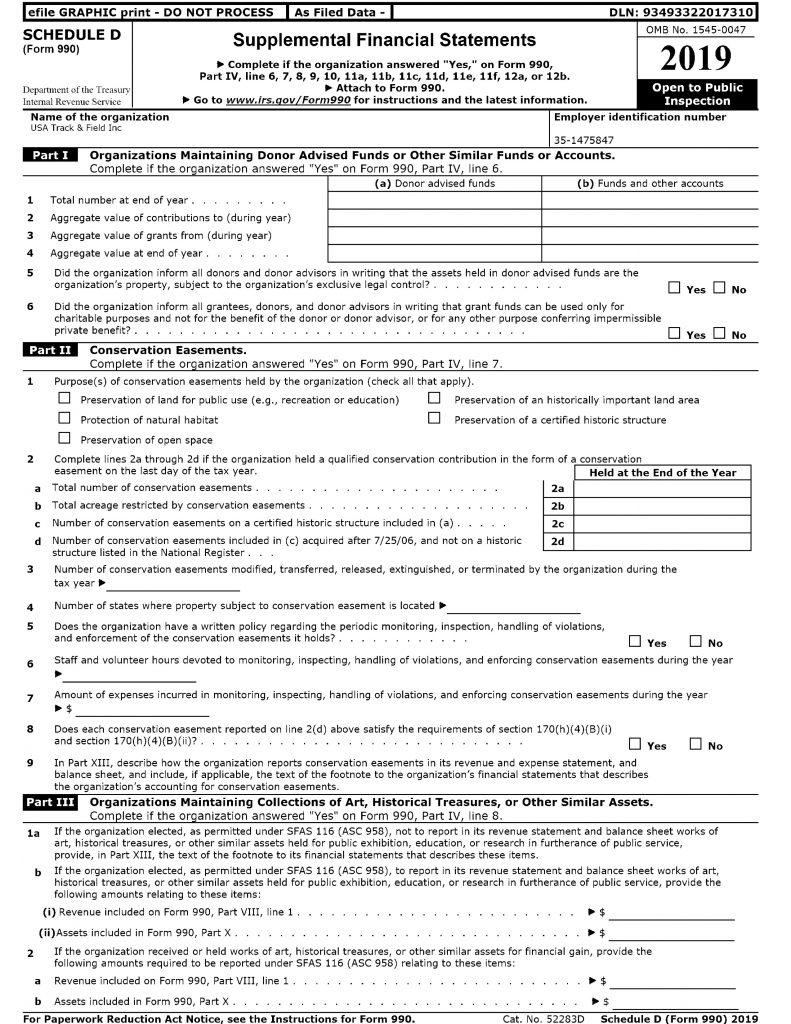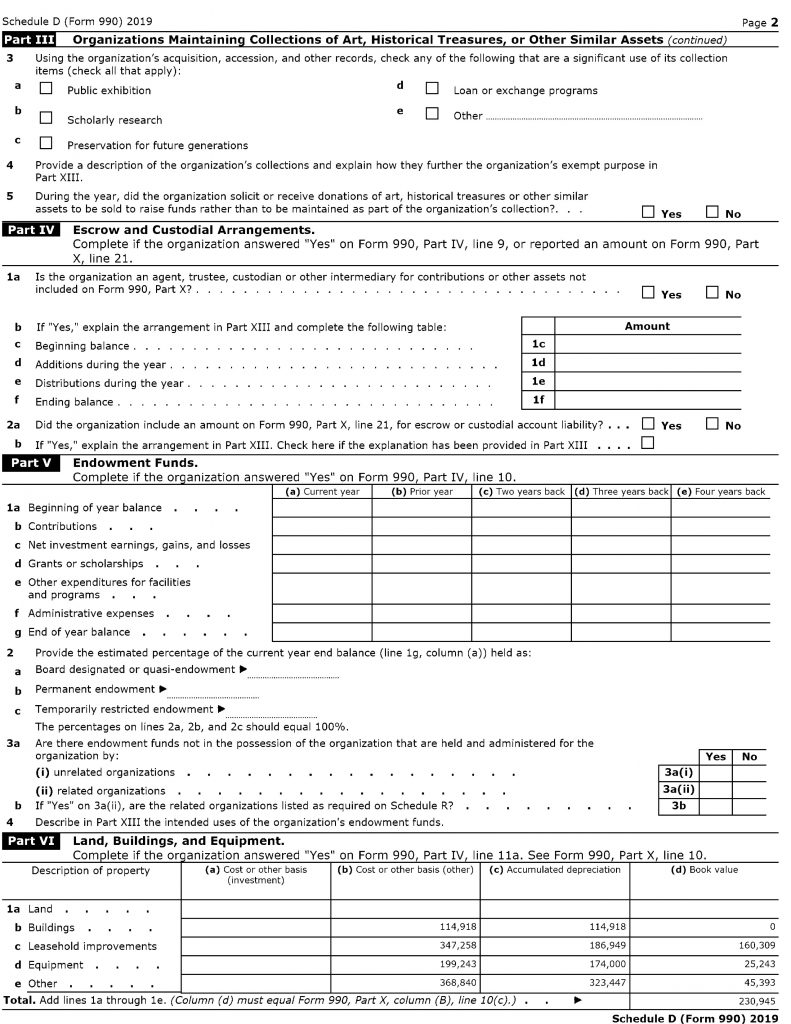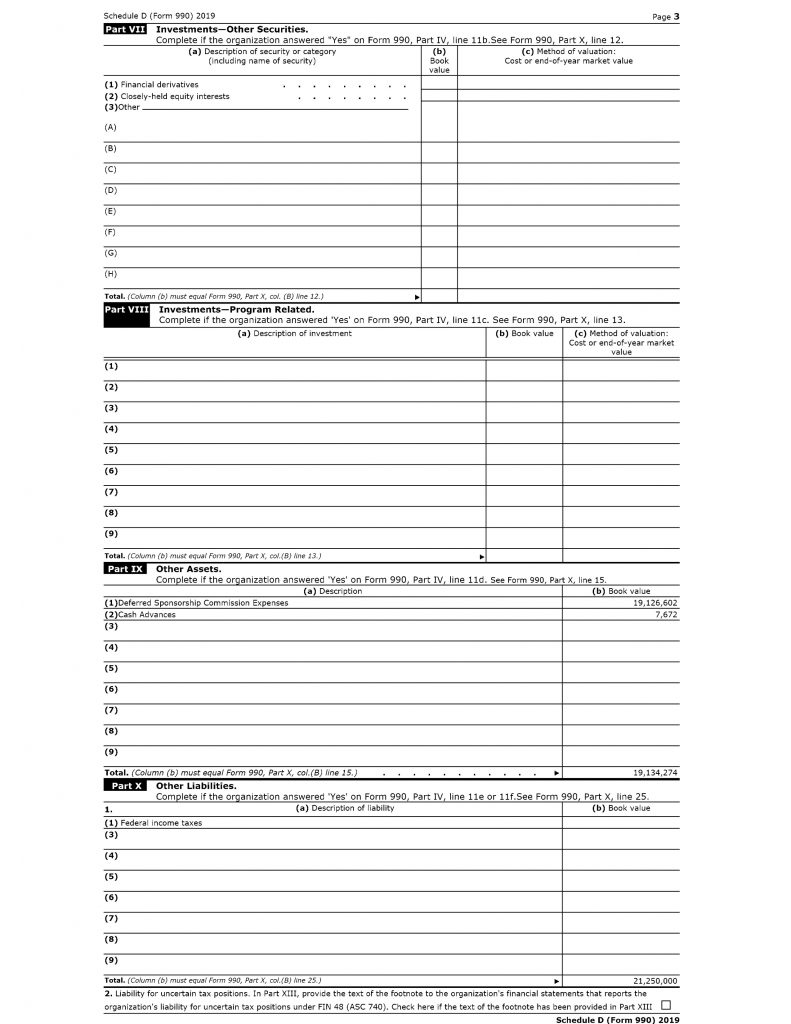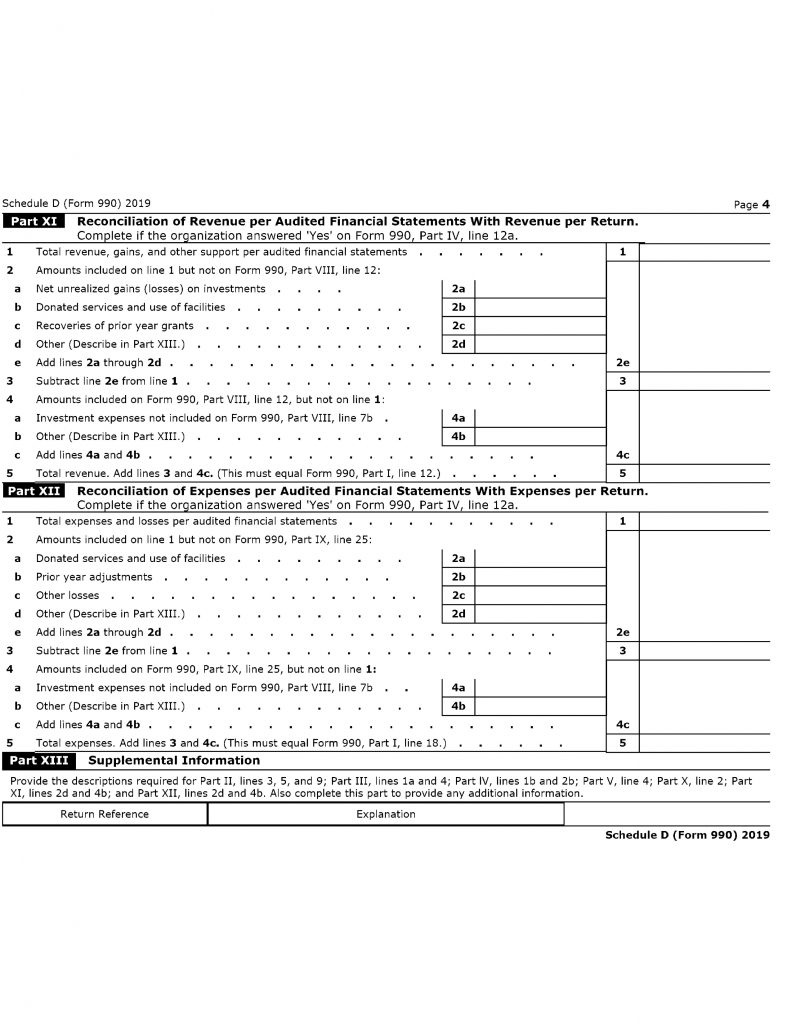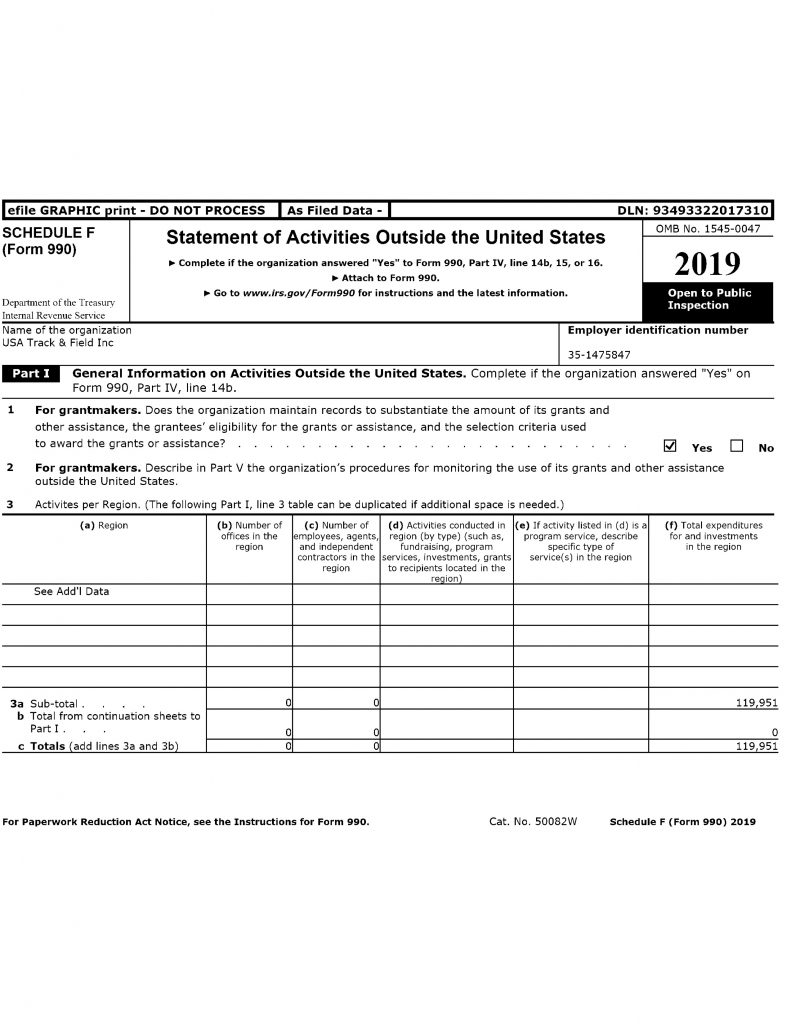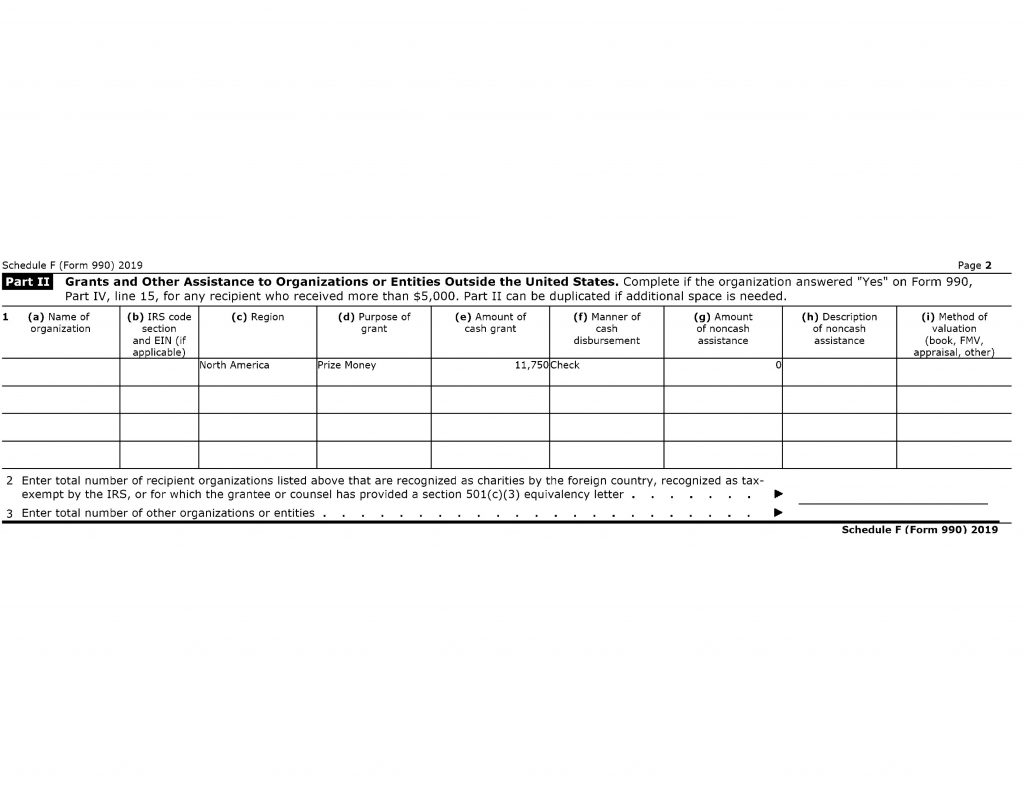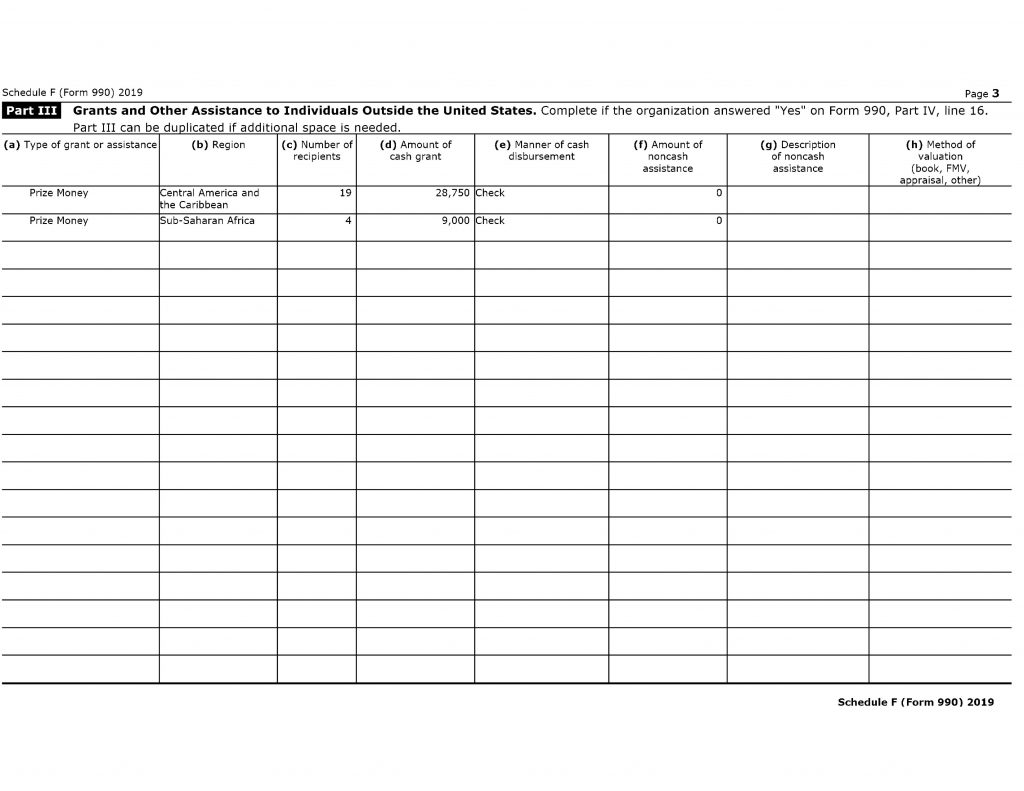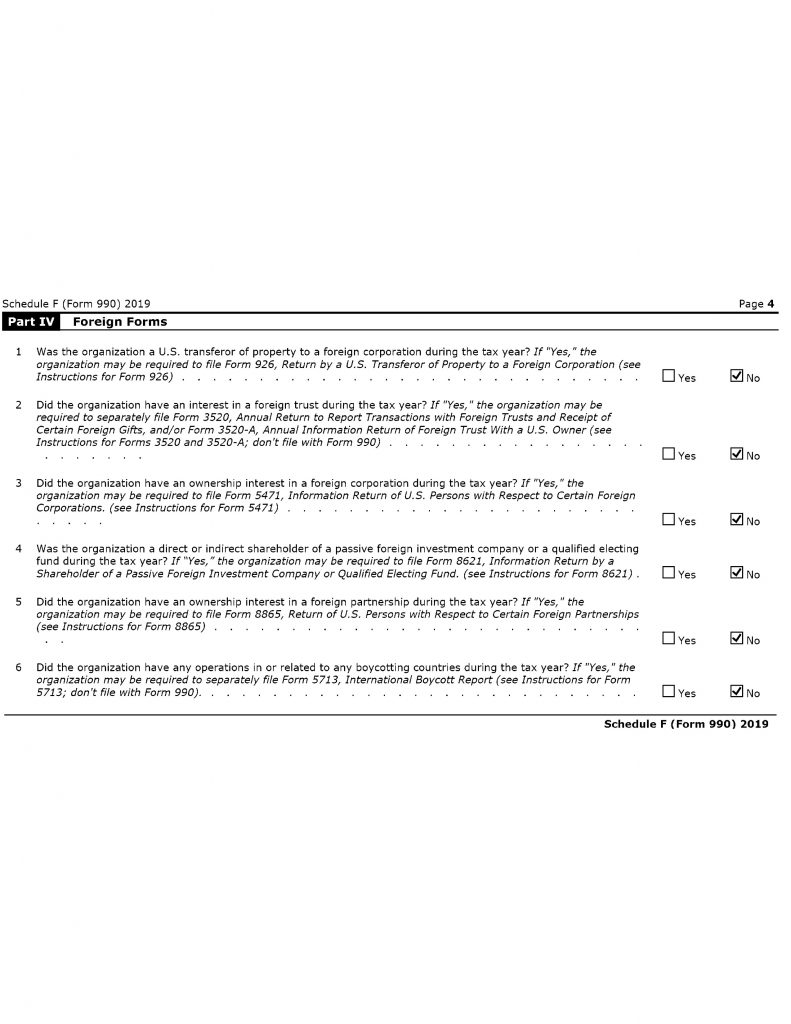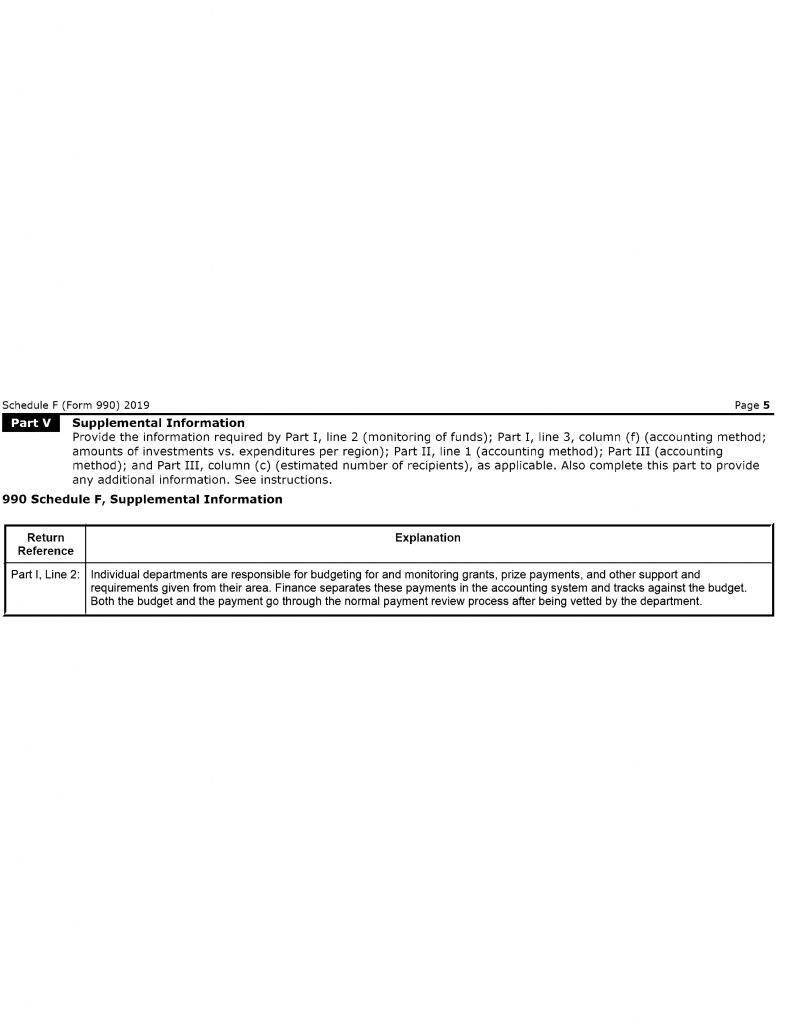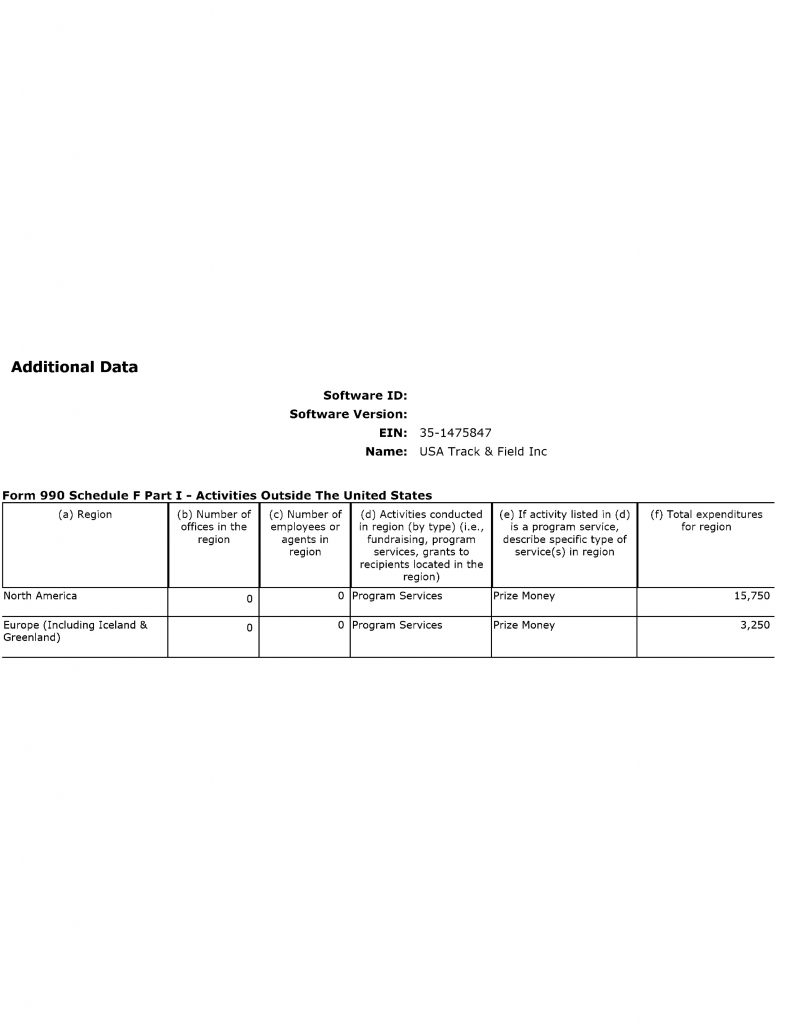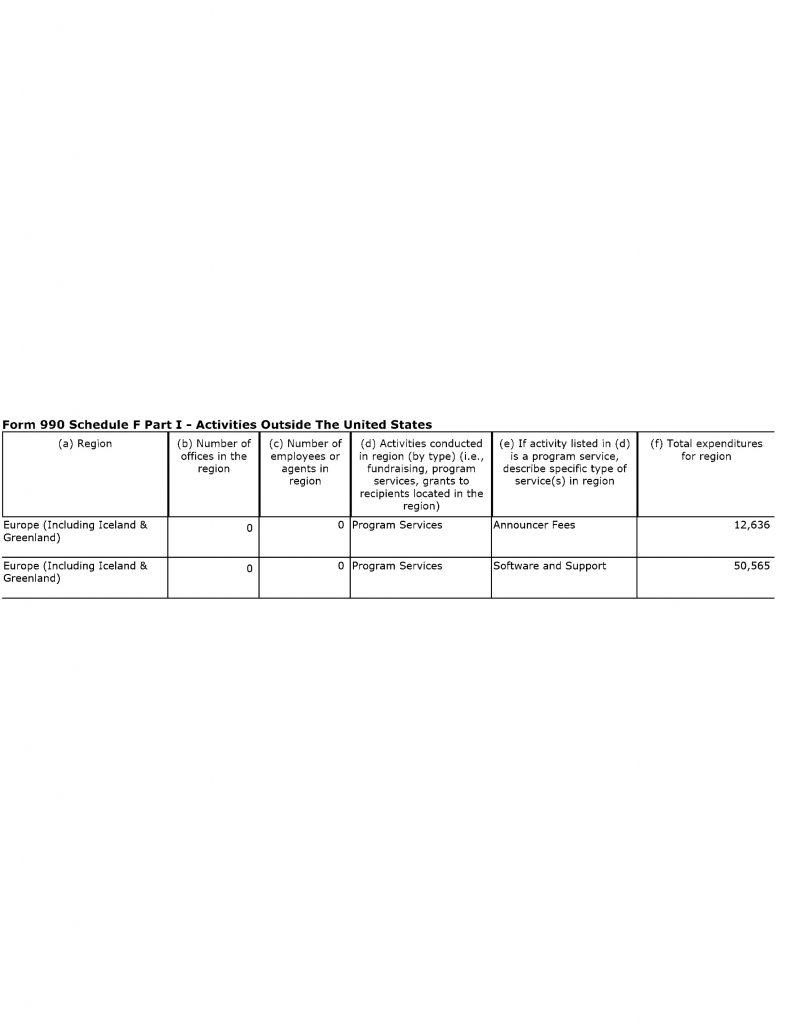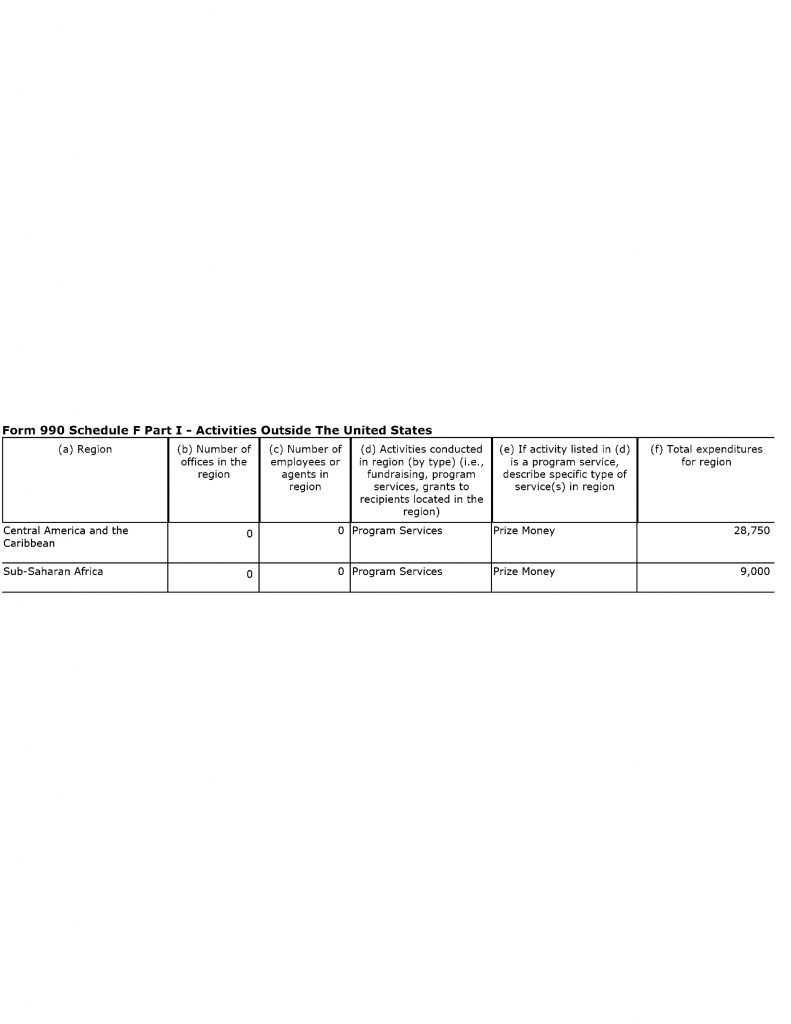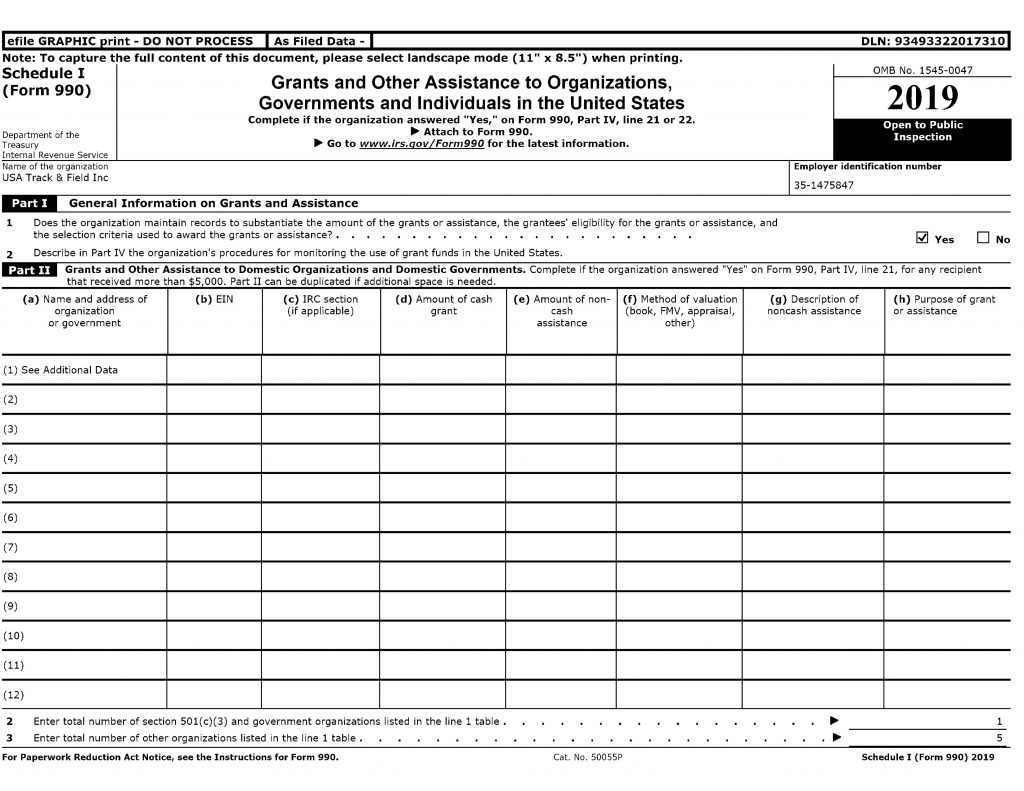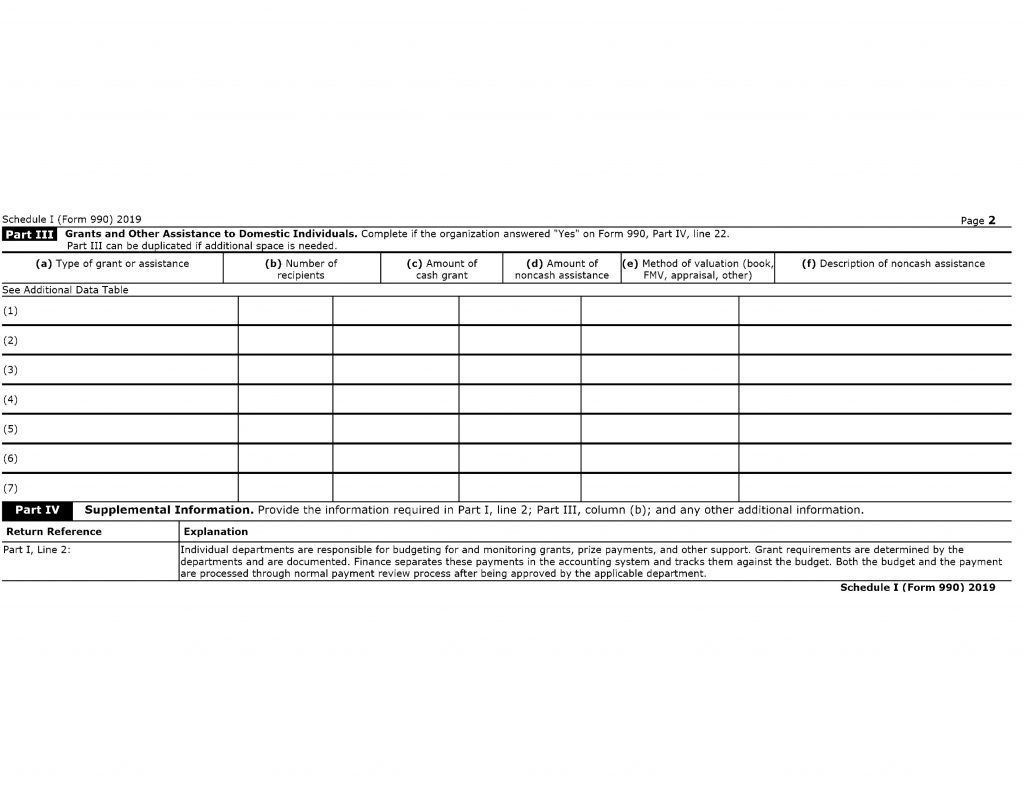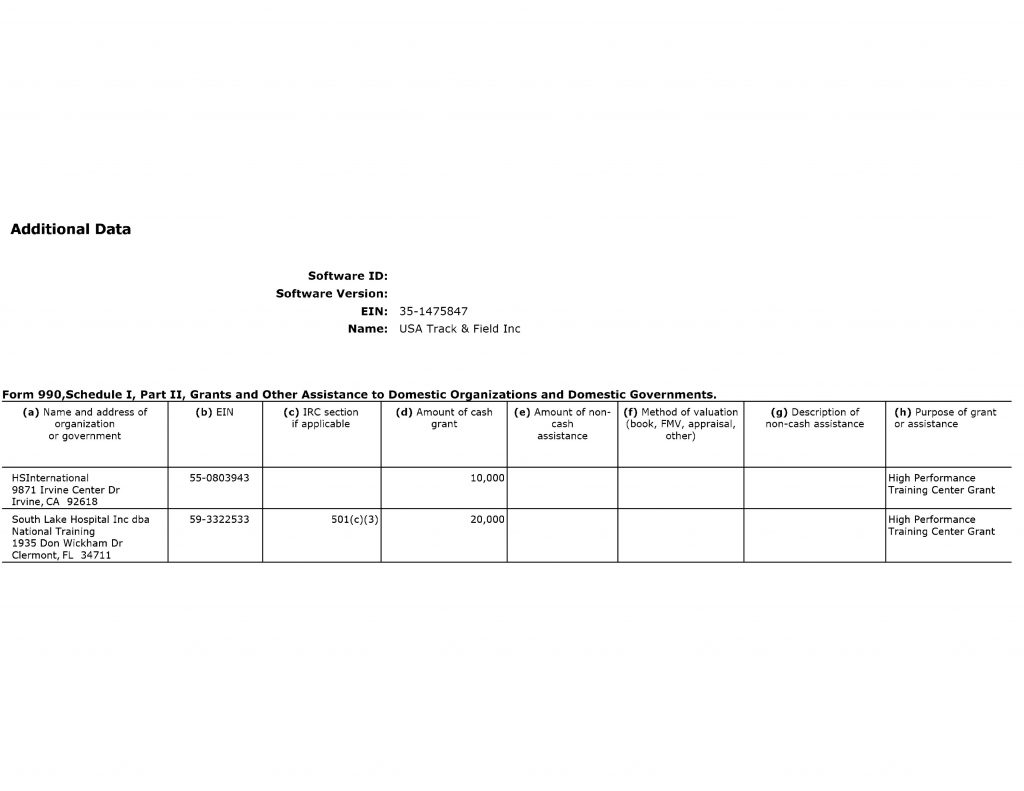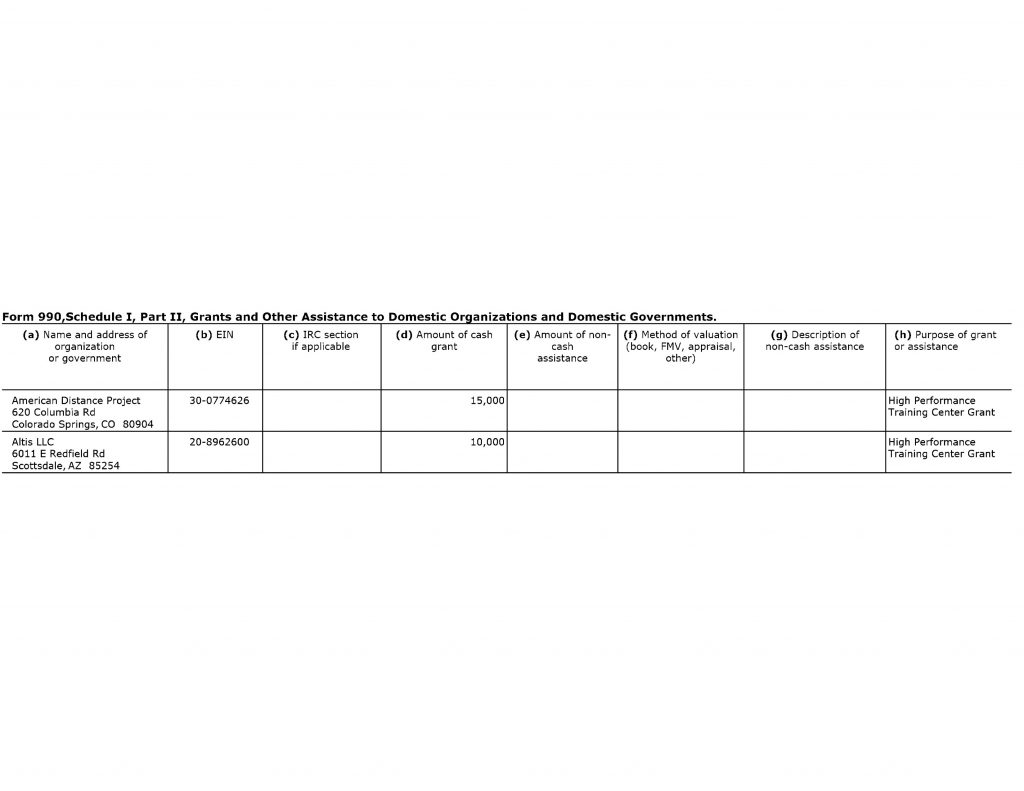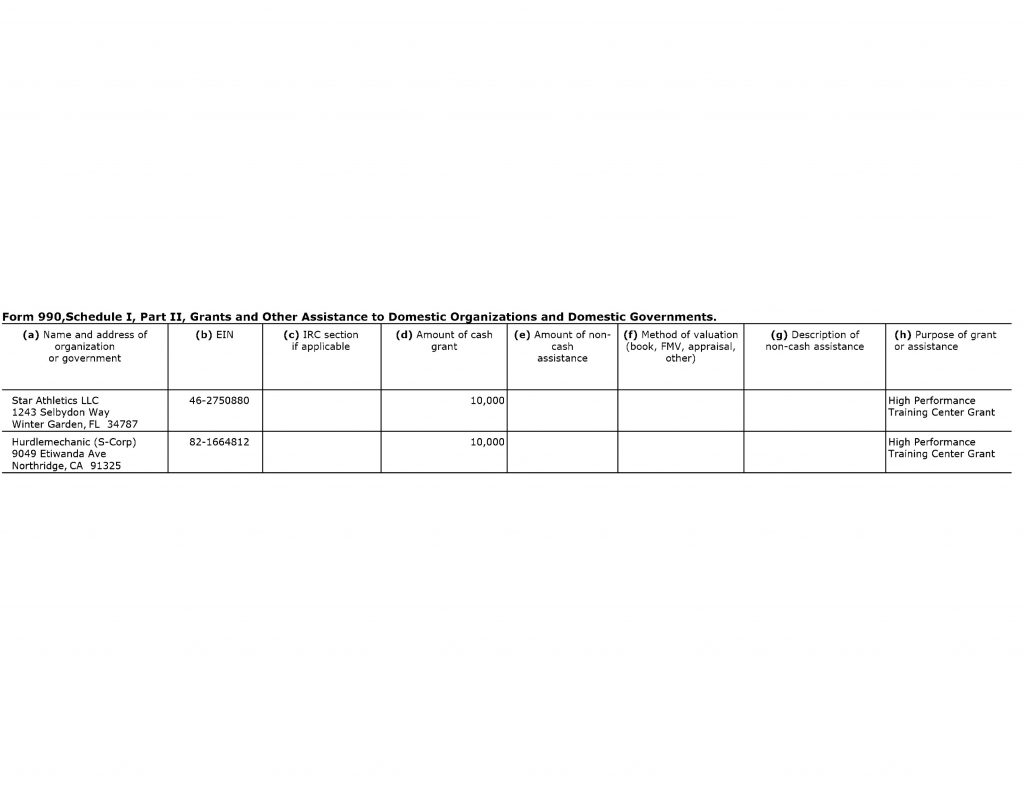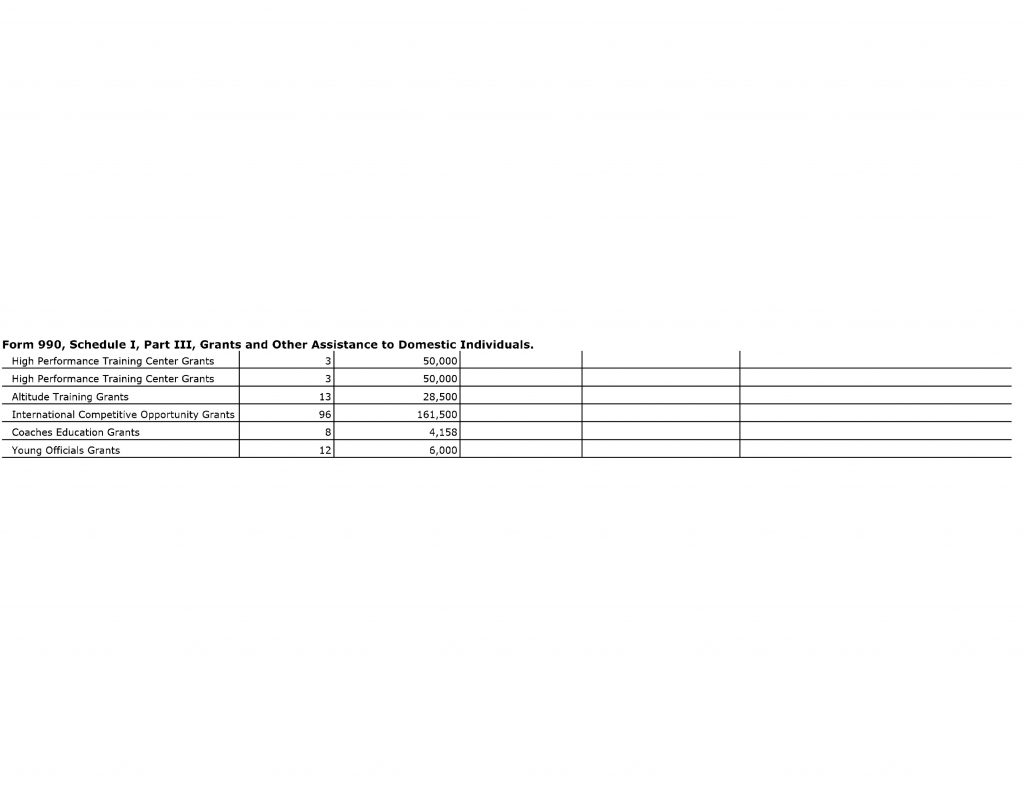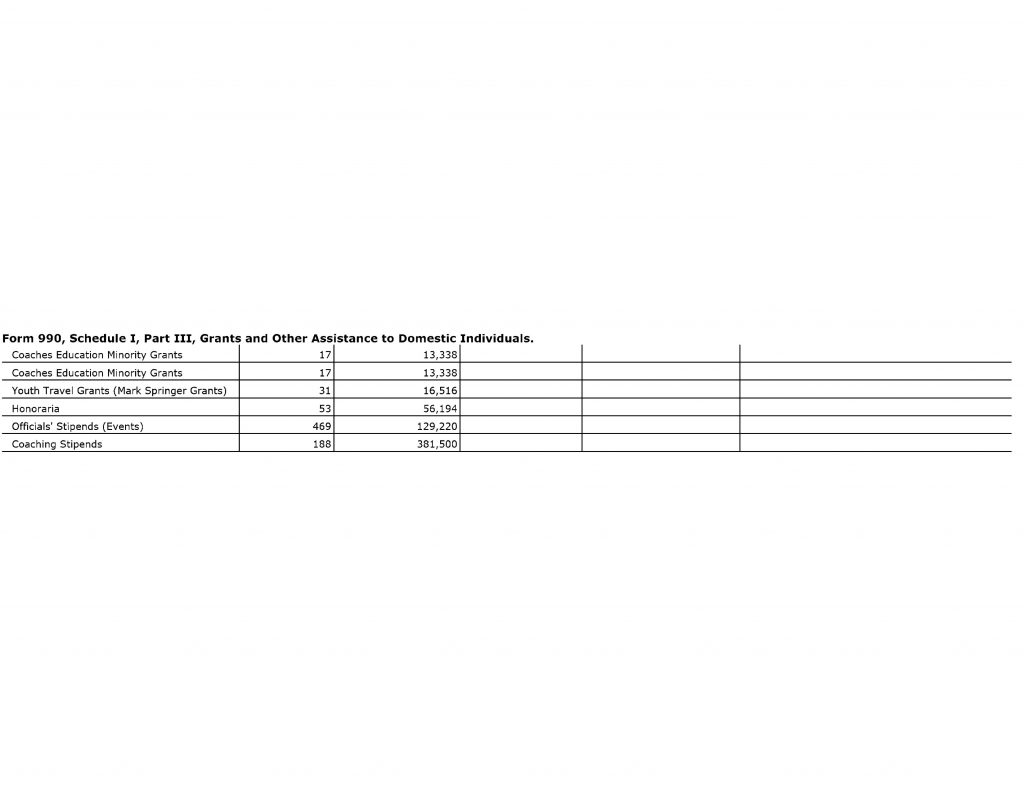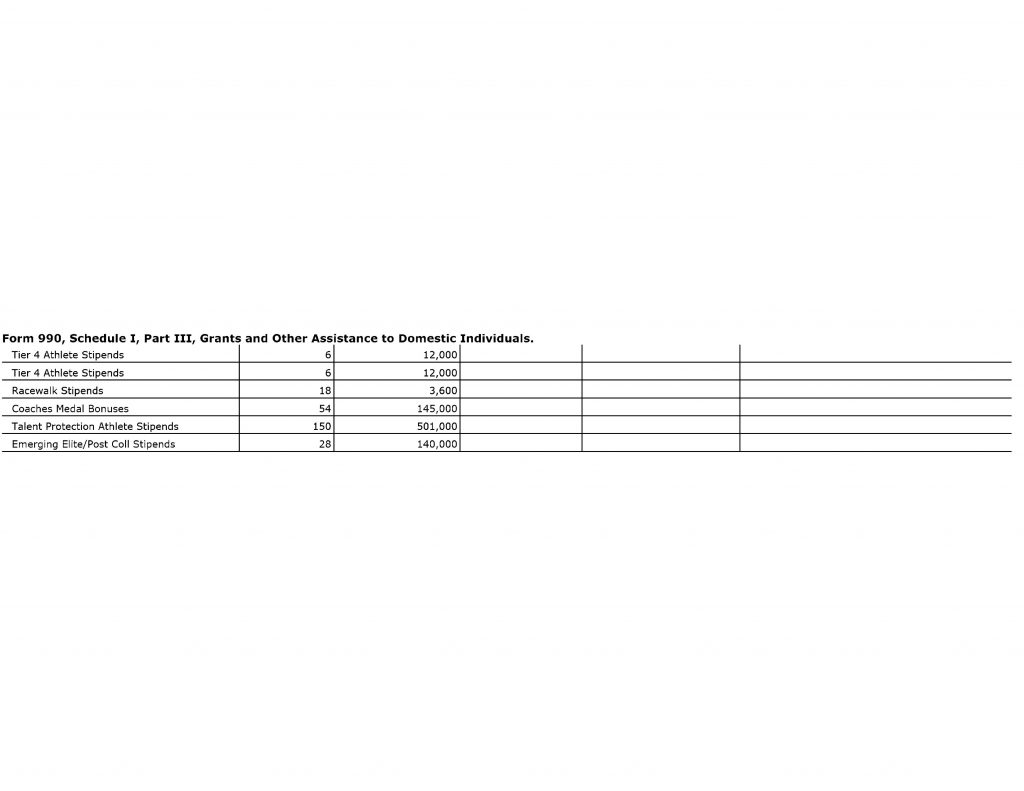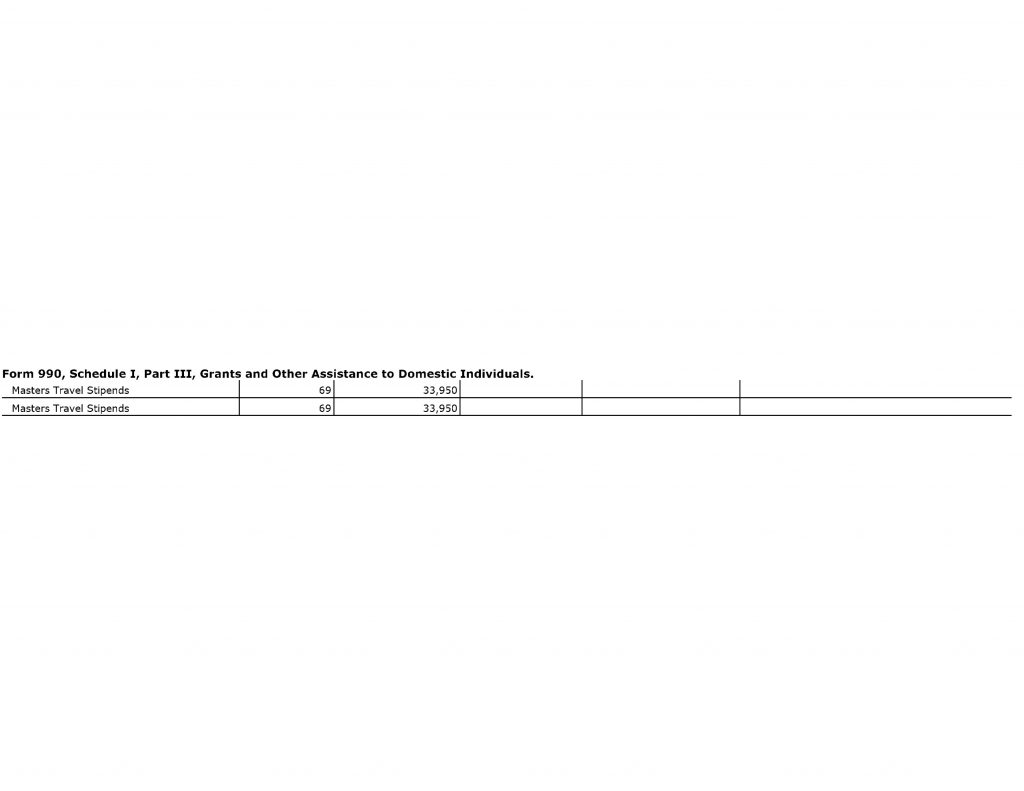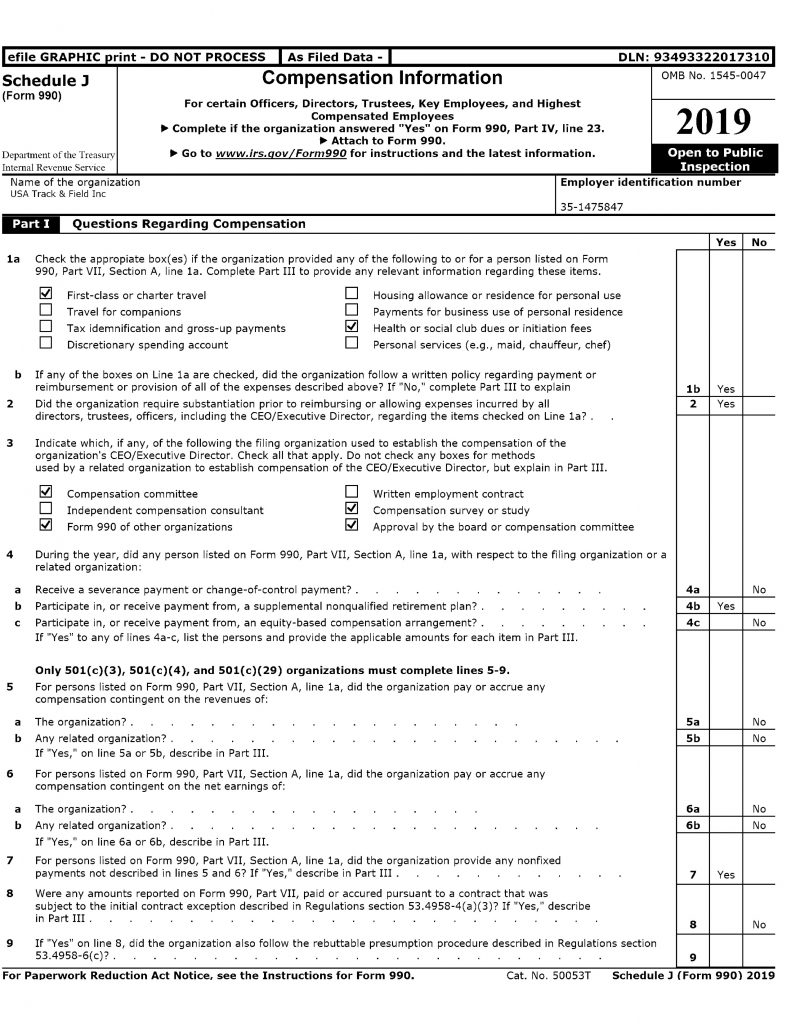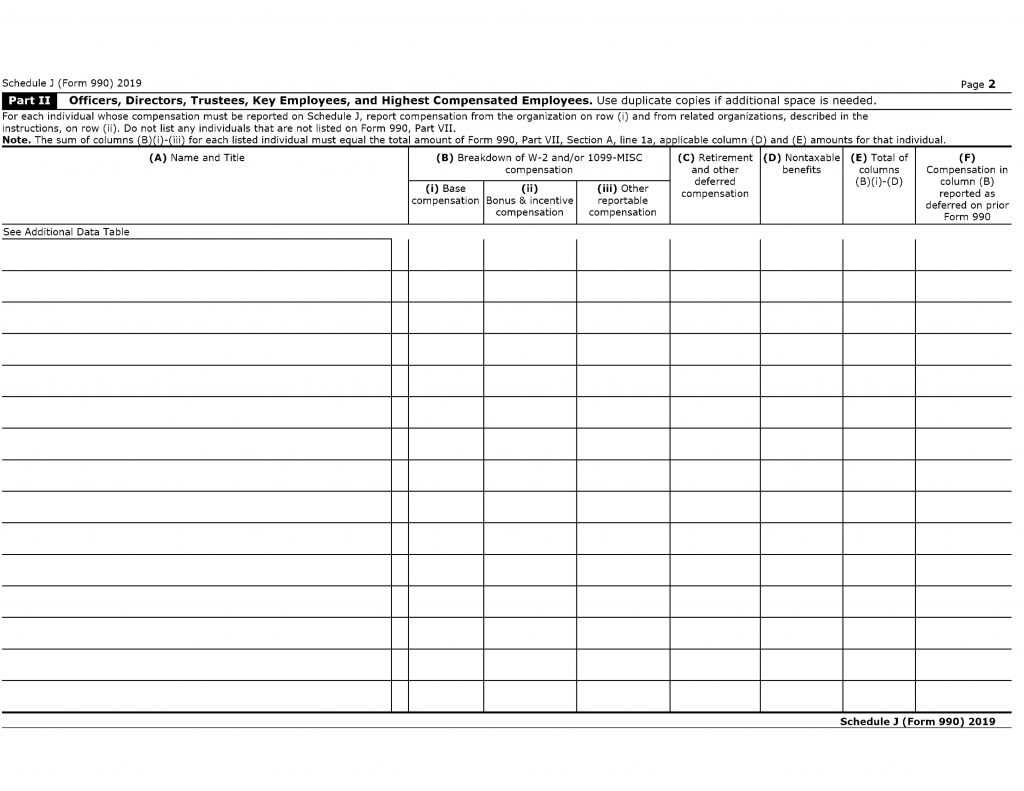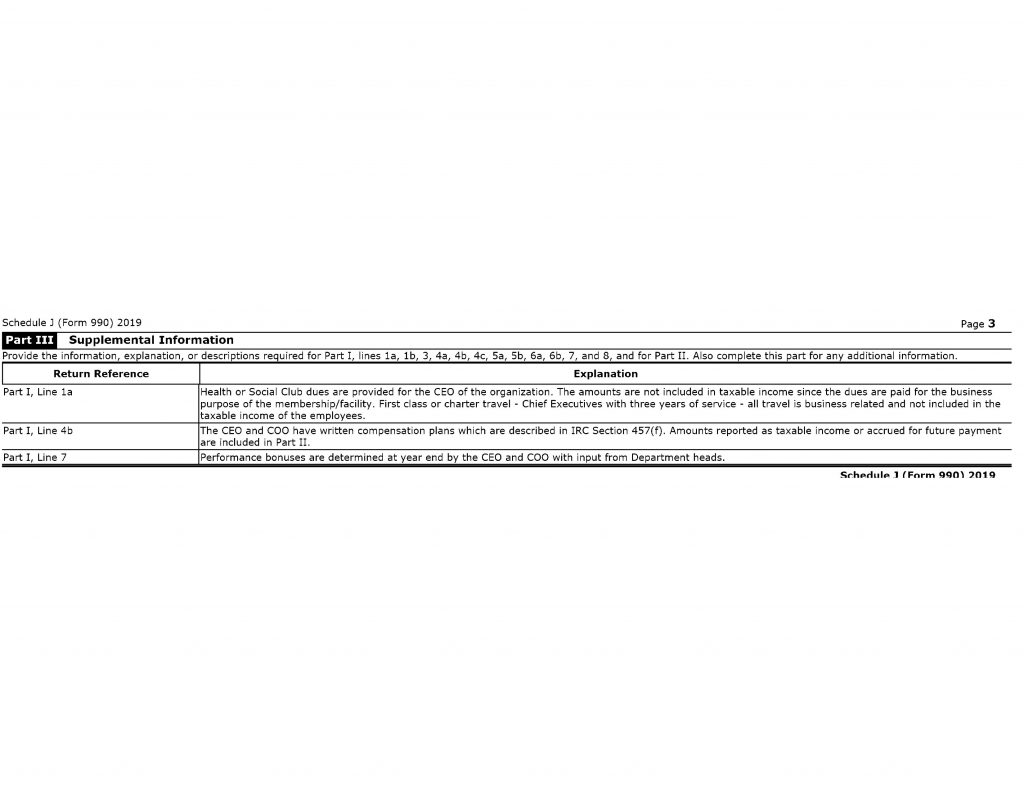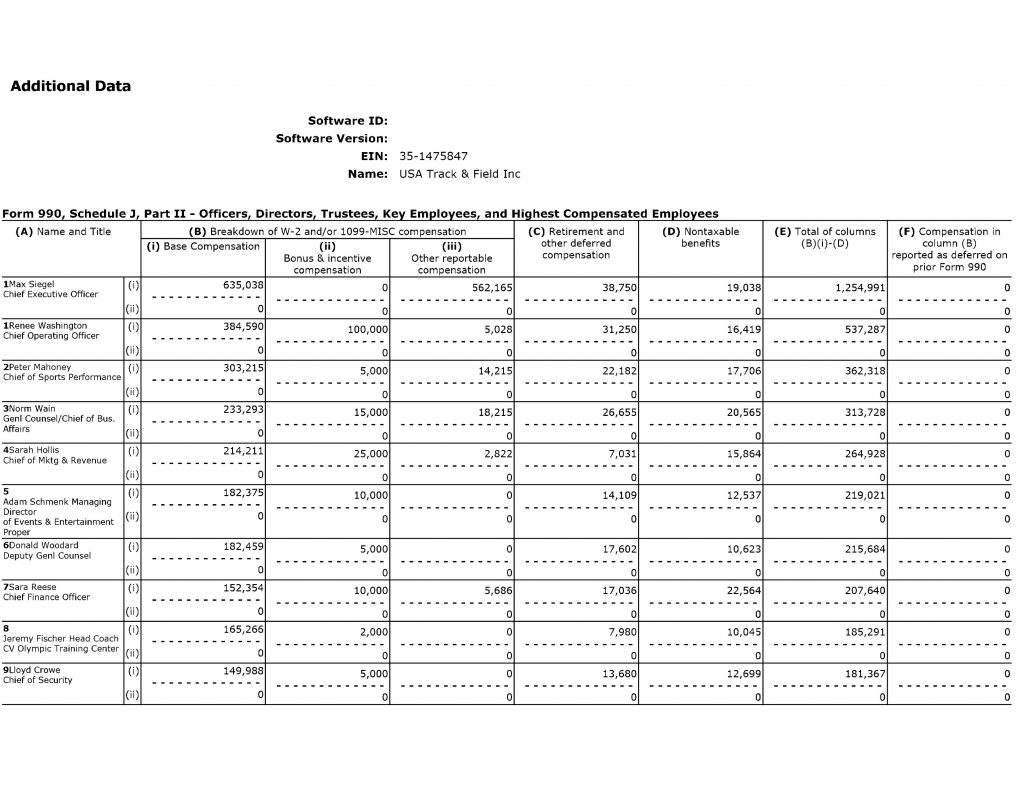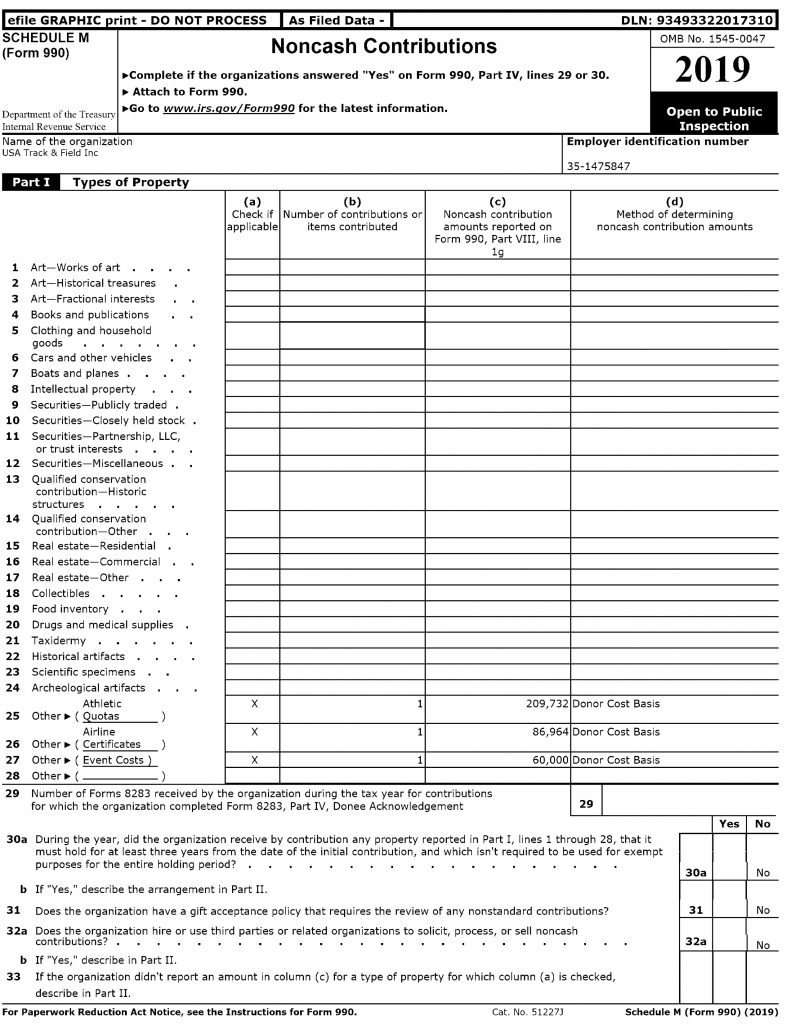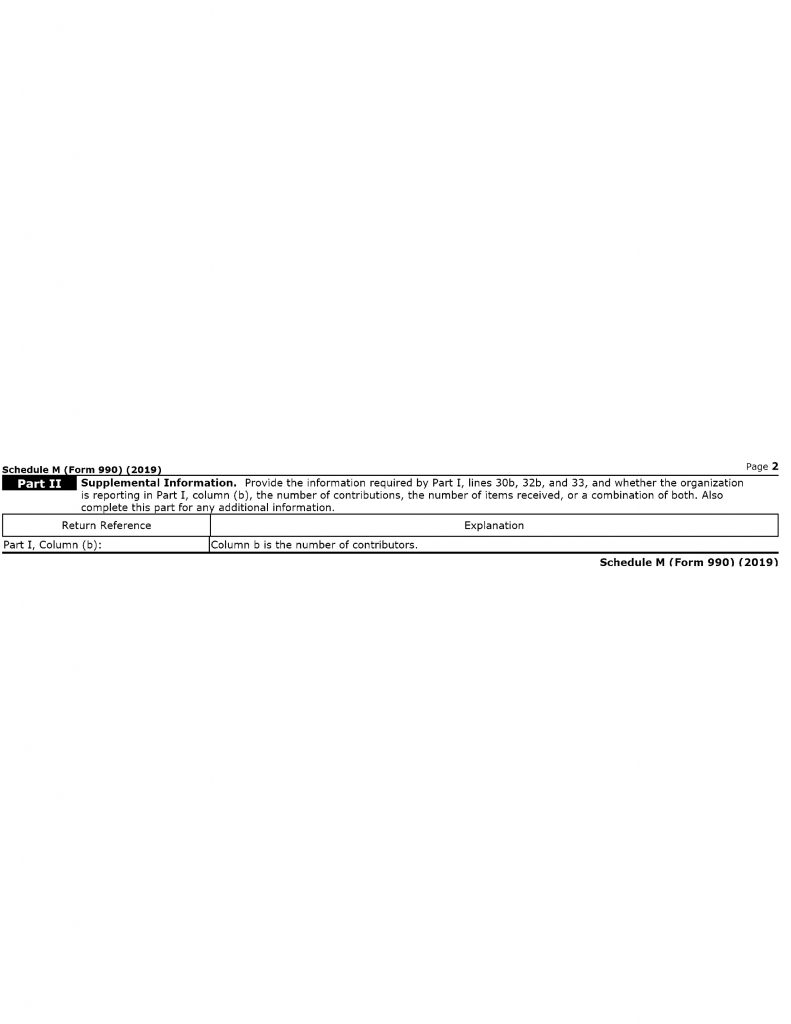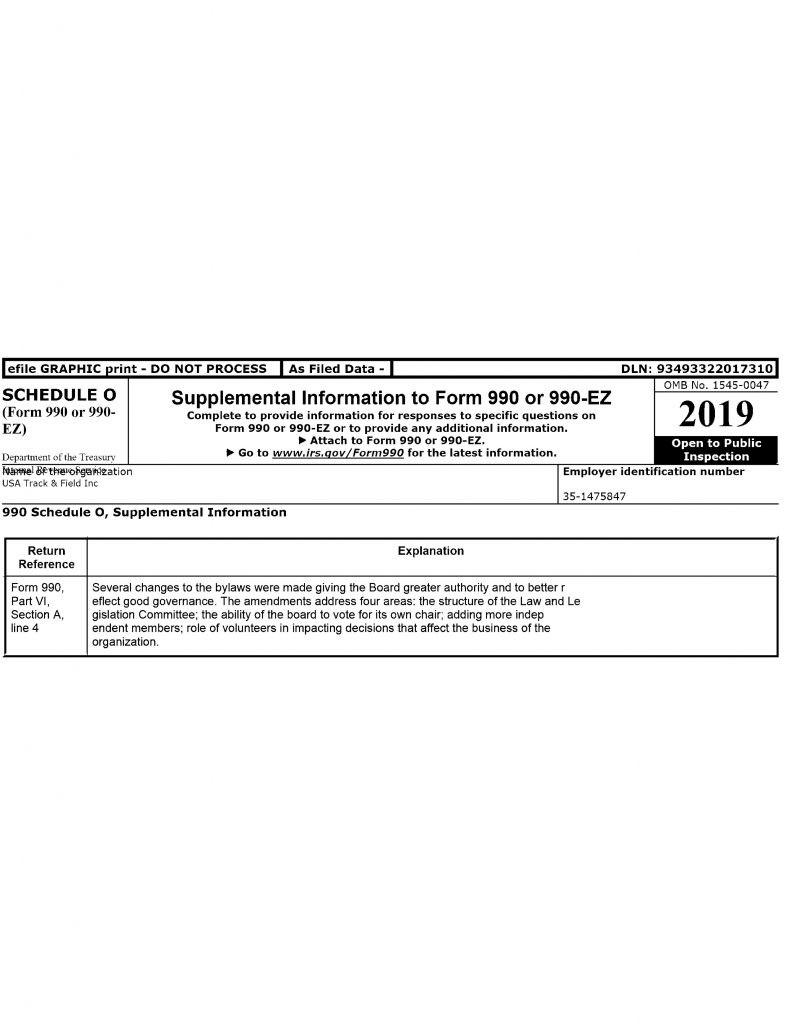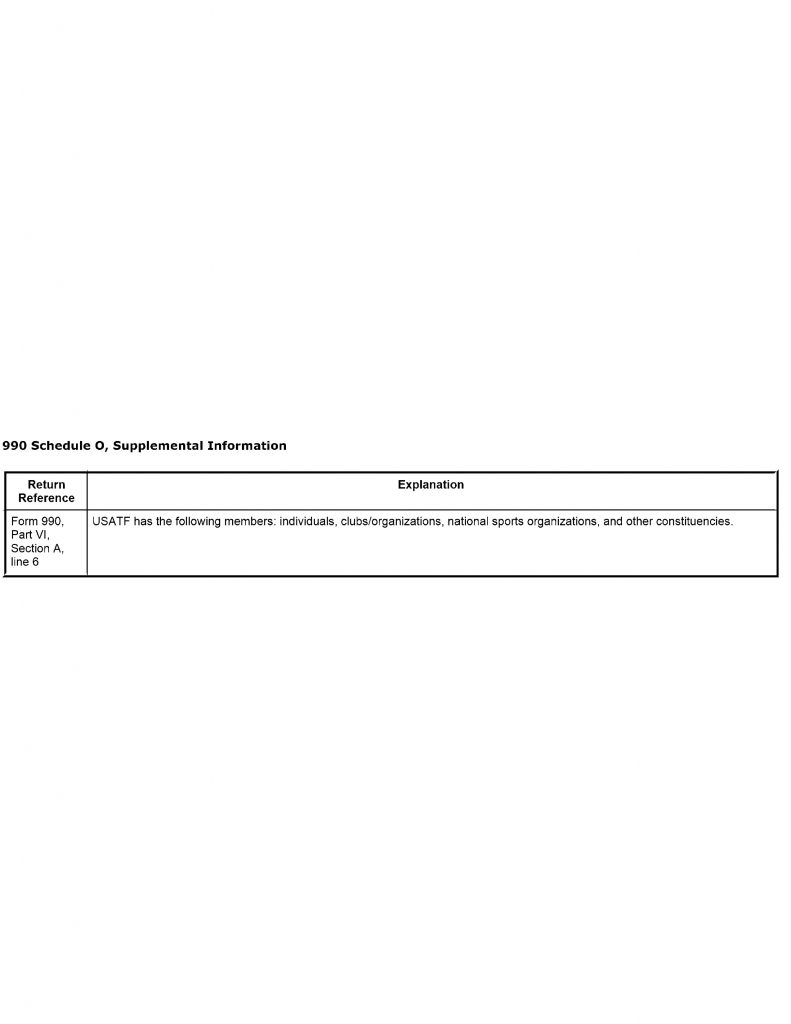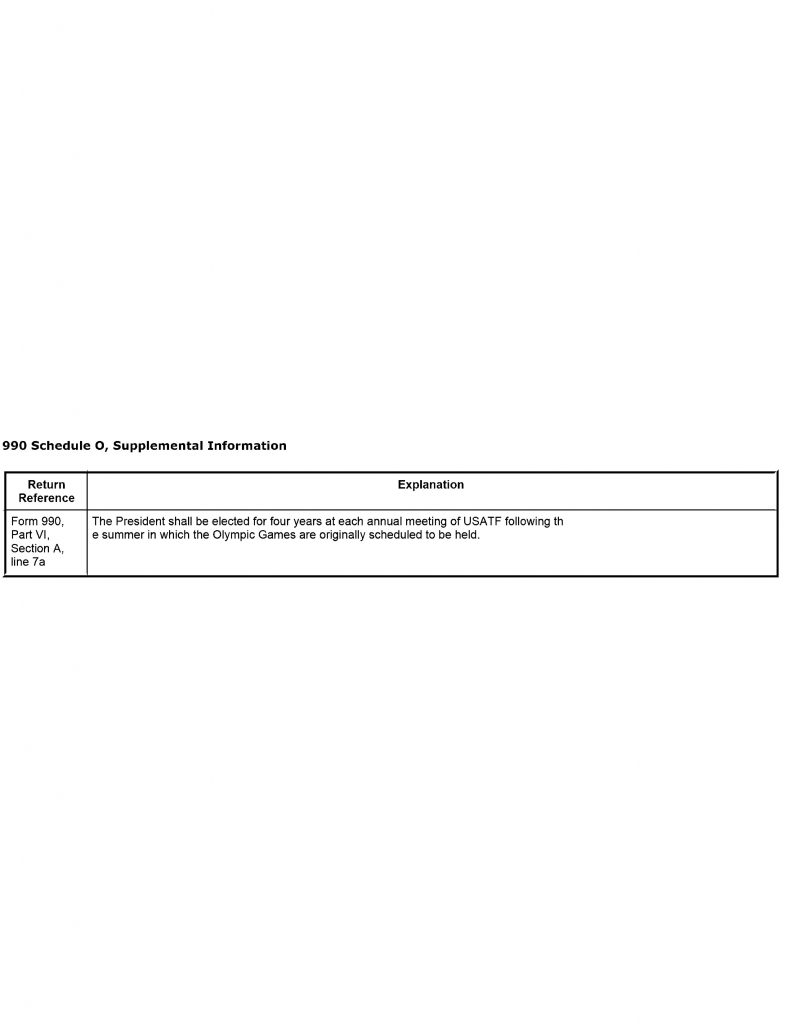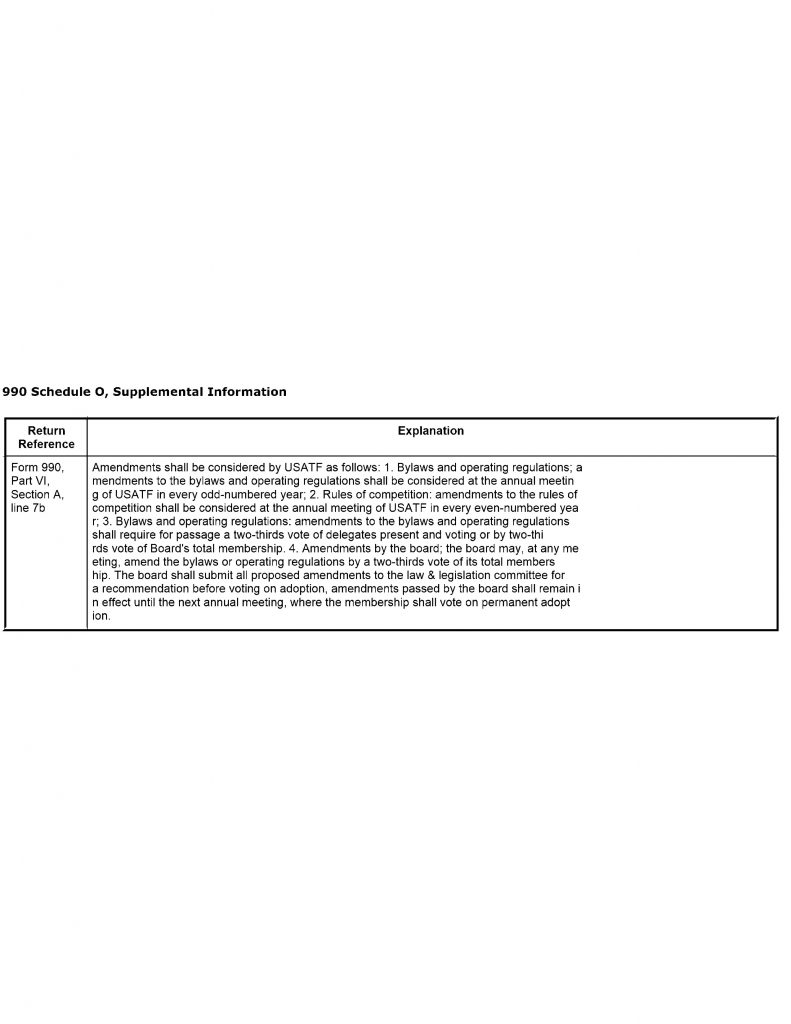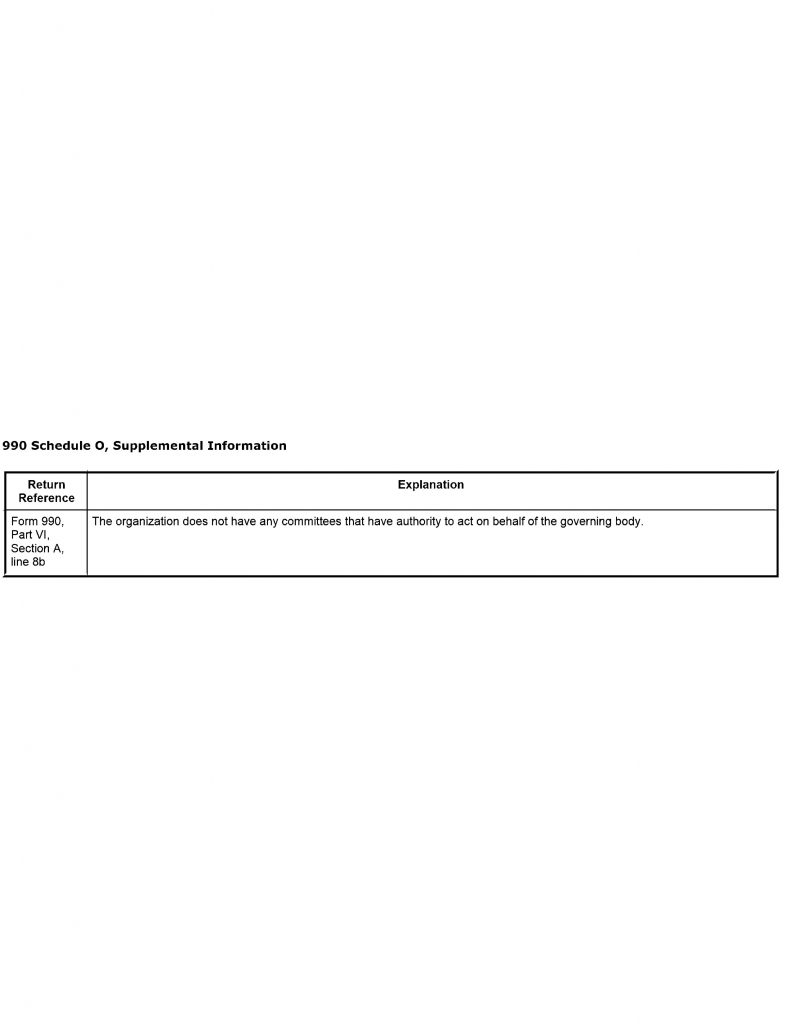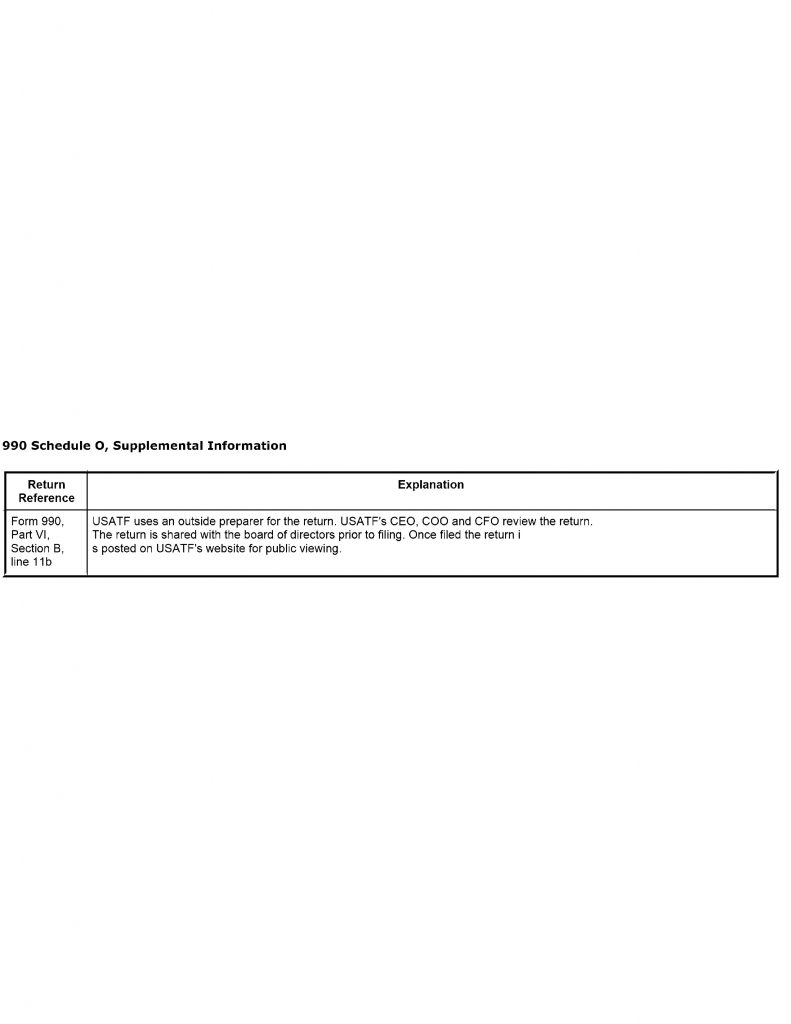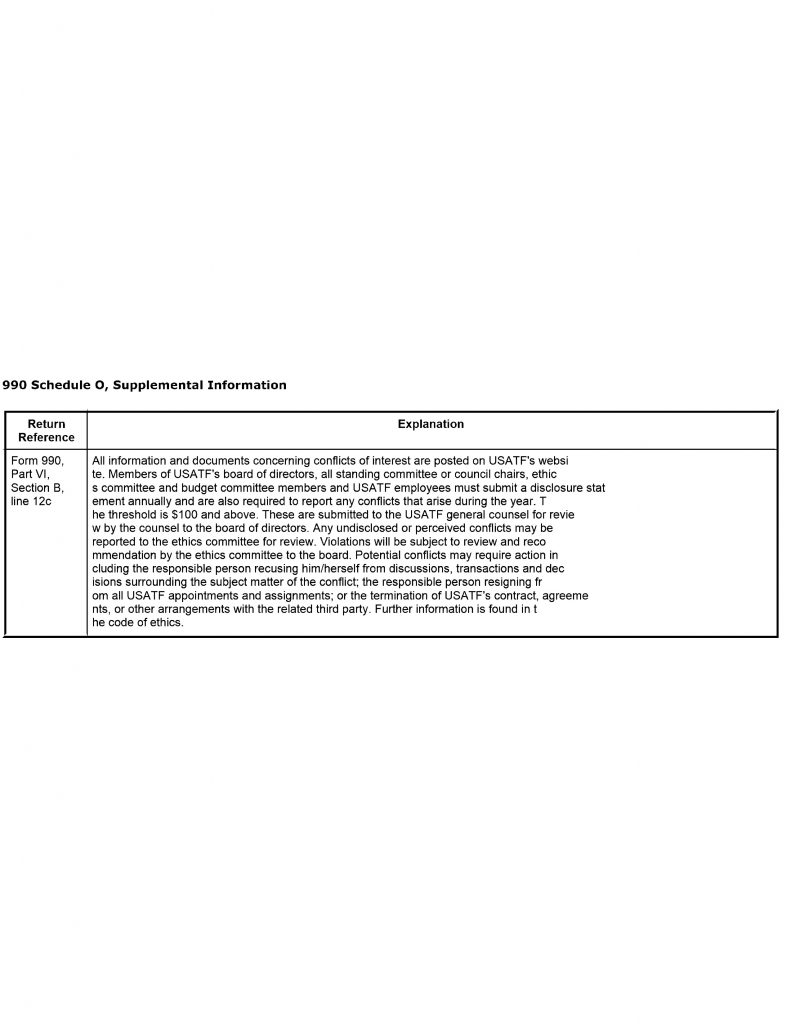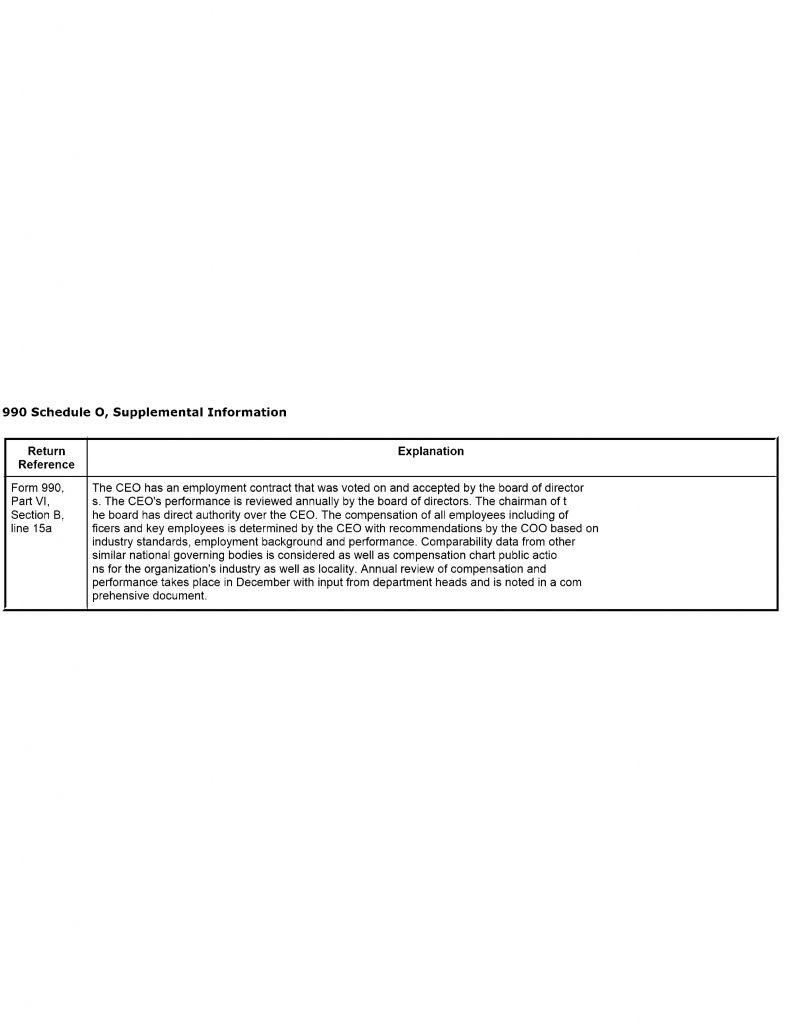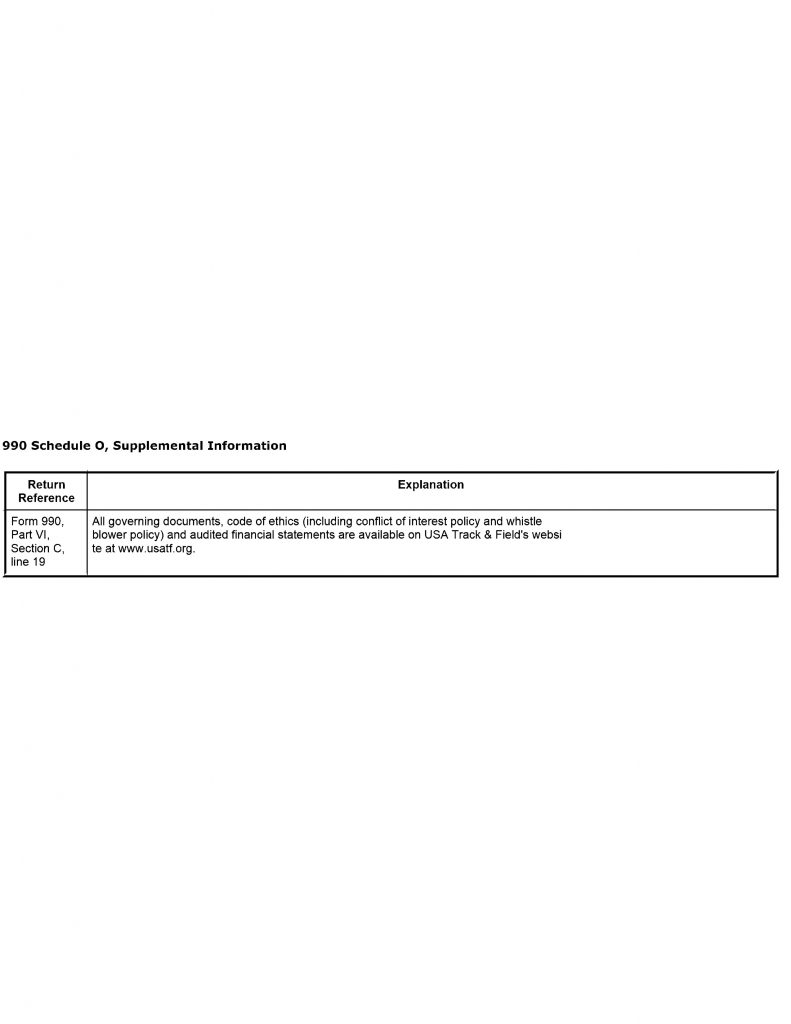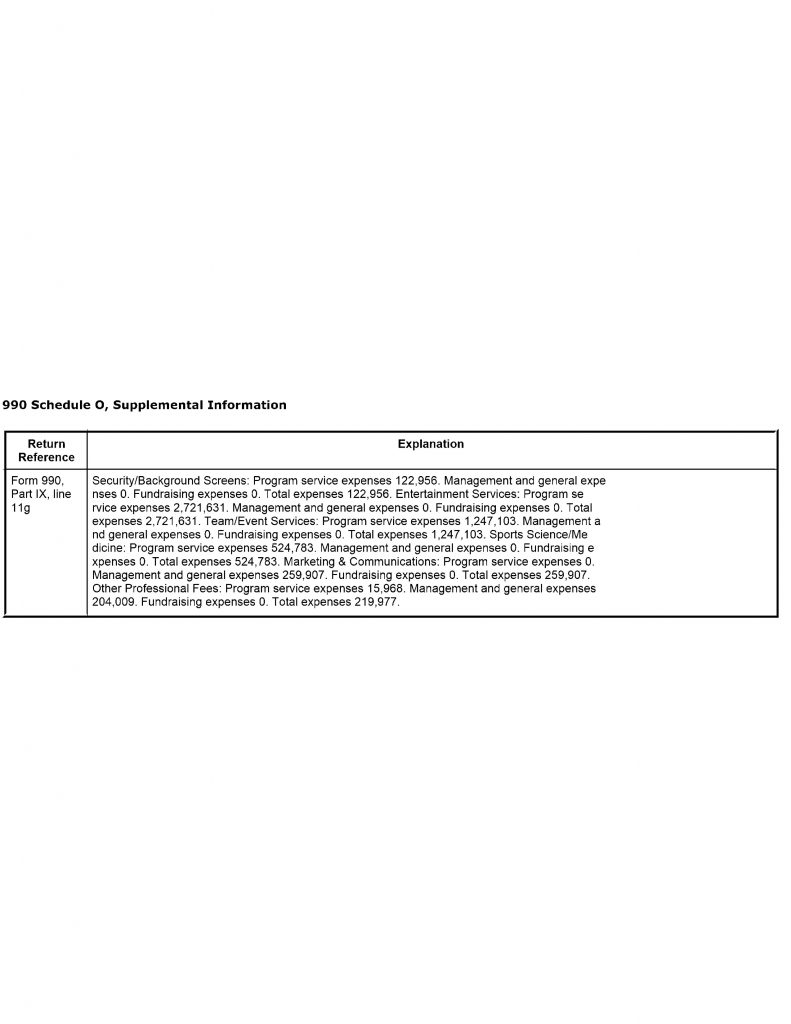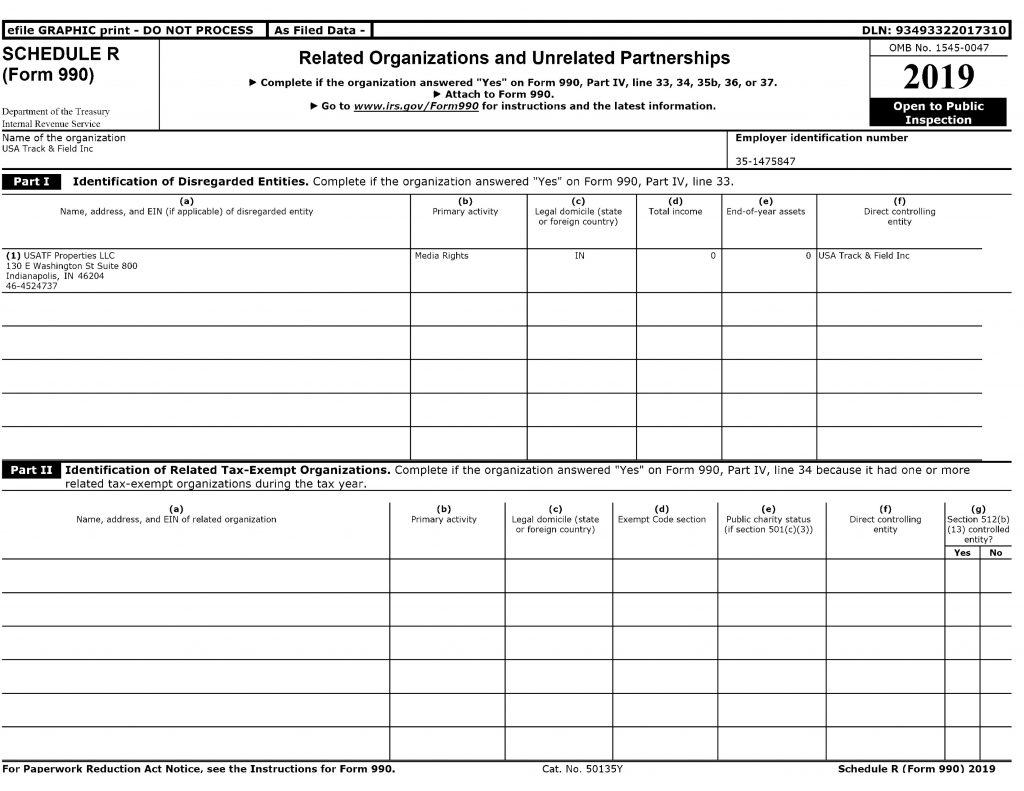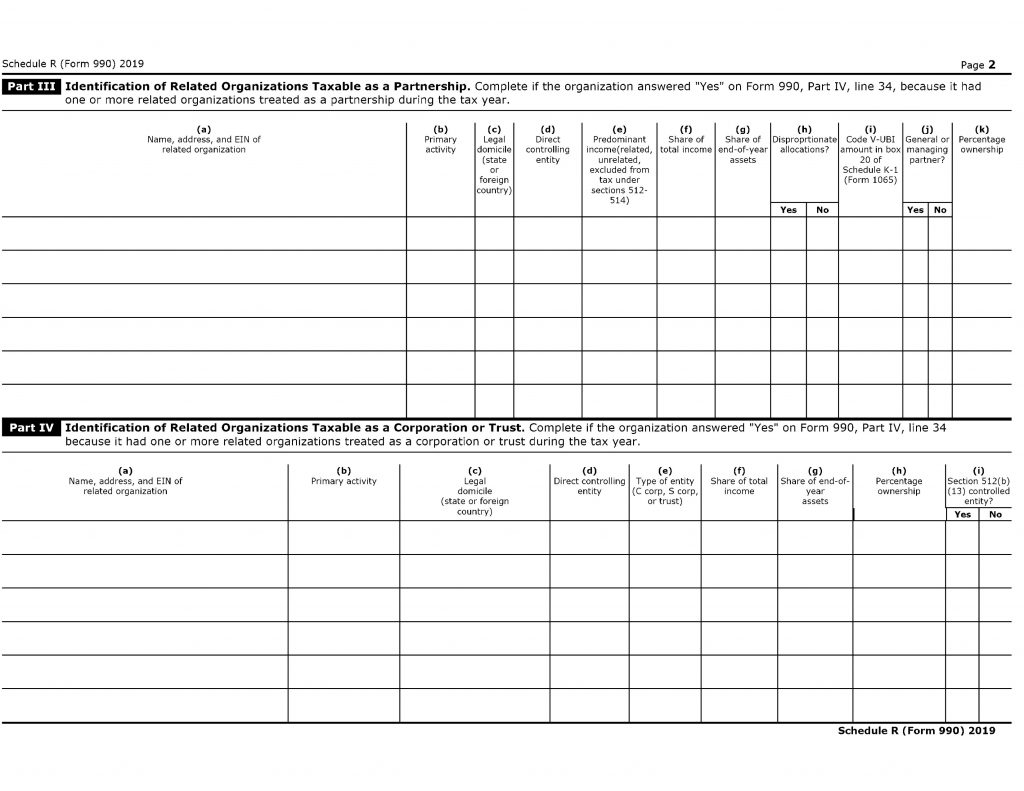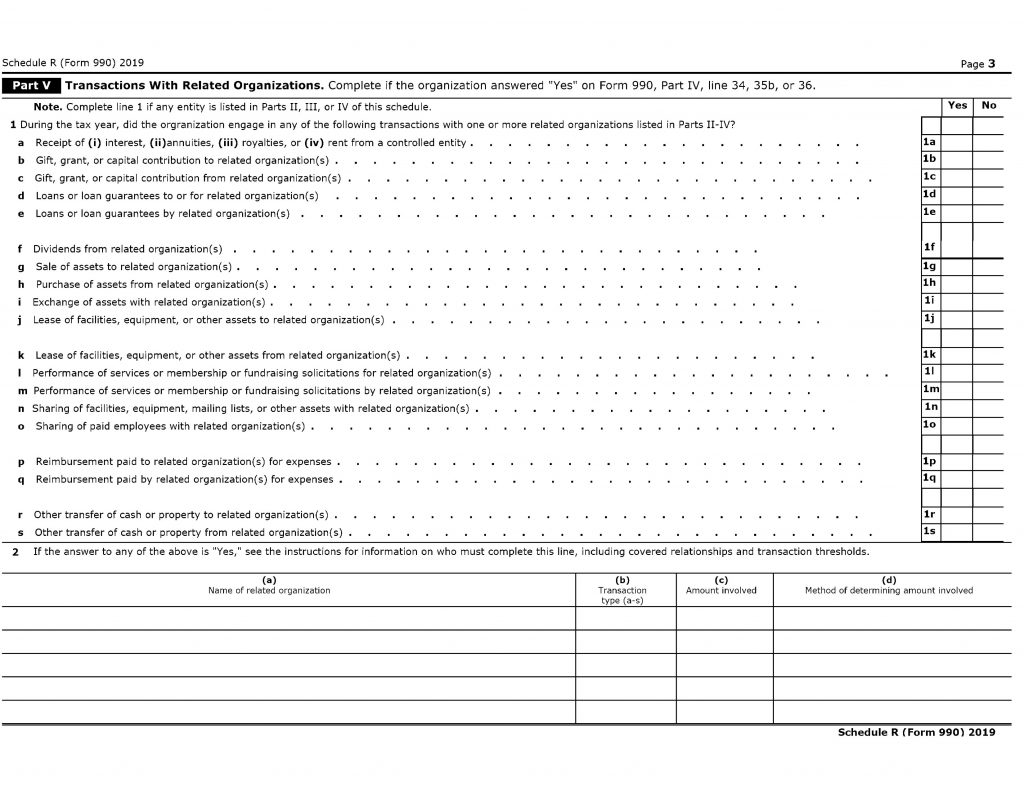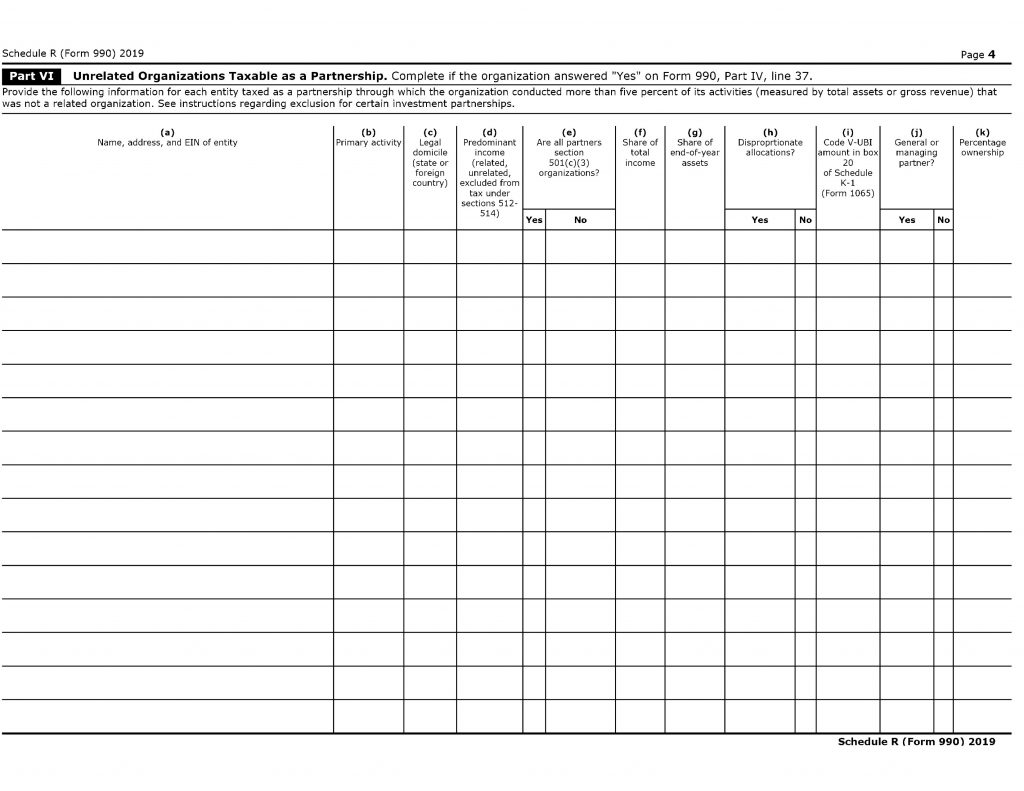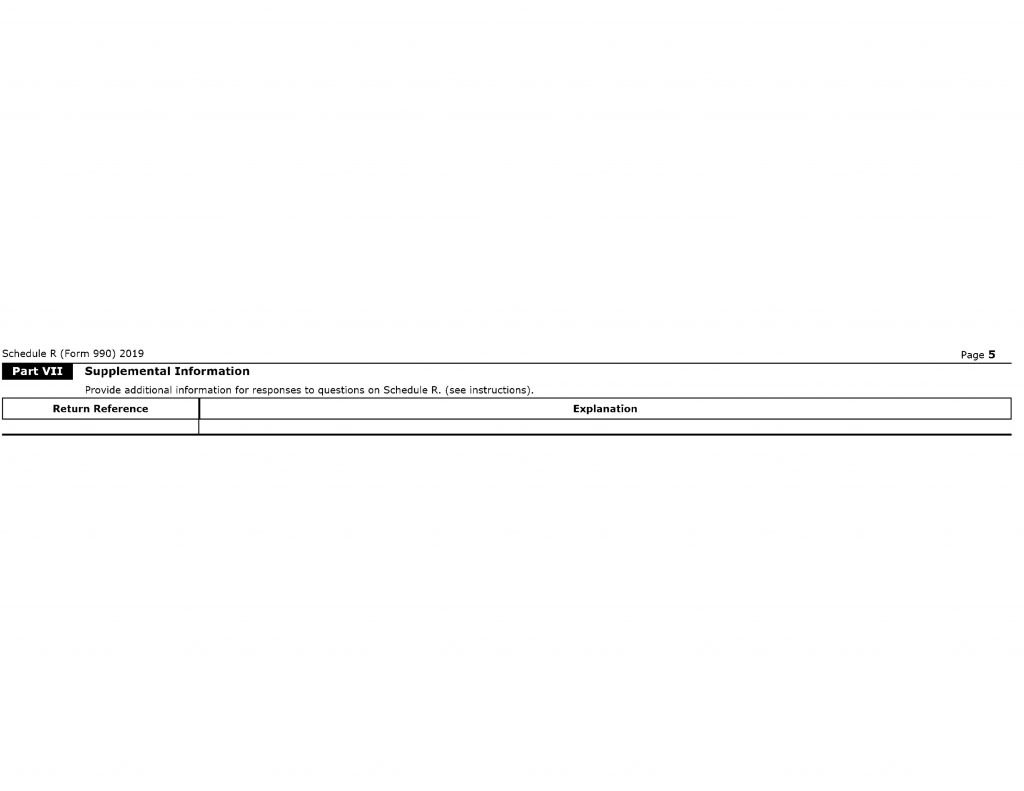Here is the recent letter from Holly Shick of the USOPC to USATF. All parties have agreed that it can be made public.
AEC Motion Rejecting BOD Proposals
The Associations Executive Committee approved the following motion last night:
Motion regarding the Board of Directors proposals:
I move that the AEC reject the BOD amendments and recommend to the Associations delegates to vote against the measures when they come before the membership for vote, and Further, that the Associations chair solicit the cooperation of other Executive Committees of USATF and with other chairs of committees, propose to the Board of Directors, on behalf of the AEC, that the Board work with the membership of USATF toward a compromise on these issues which does not disenfranchise the membership from meaningful involvement in decision making for the betterment of USATF.
NGB Compliance Standards – Part 2
Let’s take a look at the recent audits of four other NGBs. Note that none of them were green in every category.
Spoiler alert: The USOPC audited 10 NGBs last year and none of them were green in every category. Several of them were red in several areas. USATF having a deficiency somewhere is basically guaranteed.
Despite the threats being made to our athletes, there is absolutely no reason to believe that having a deficiency in the audit will result in an immediate loss of funding from the USOPC.
NGB Compliance Standards – Part 1
Here are the current USOPC NGB Compliance Standards.
The only one that possibly pertains to our L&L drama is:
A3: “NGB must have bylaws or board-approved policies and procedures that at least meet the minimum standards for governance practices and comply with the Act §220522(9-12).”
Bold = a new requirement.
But the word “or” is the key. We have bylaws. I don’t know how they are defining “minimum standards for governance practices” but we comply with the Sports Act and we have passed previous USOPC audits.
I am concerned we will be deficient in other areas though…
B.1.d “must provide financial information and documents as reasonably requested by board members.”
This has been an issue in the past. Maybe current board members are having better luck?
B.4.b “NGB must make its three most recent IRS Form 990s available on its website in a reasonable and accessible location to all individuals by the IRS deadline or extension deadline provided by the IRS.”
As reported in this group previously, and as I have complained about extensively on Twitter, USATF has not been doing this in anything remotely resembling a timely manner for several years now, despite the fact that the tax returns themselves state that they are posted to the website “once filed.”
“E5: REQUIREMENT: Adopt a whistleblower and anti-retaliation policyIn order to meet the above requirement, NGBs must meet the following Standards:a. NGB must adopt and maintain an organizational whistleblower policy that encourages and provides a mechanism for affiliated individuals to report alleged violations of any applicable law, rule, regulation, or adopted policy of the NGB, accounting or financial fraud, or other misfeasance and includes an anti-retaliation statement.”
Our whistleblower policy is from 2012 and I am not confident it will pass the audit.
In part 2 we will cover the results from the NGBs that were audited this year. Spoiler alert: They all had deficiencies. +
Opinion: USATF At Crossroads, Again
This is a repost of an article originally published November 24, 2021 by Track and Field News. Original link.
November 24, 2021 from Becca Peter
Interview with Ed Koch…
Introduction by Becca Peter…
At the upcoming USATF Annual Meeting (Orlando, Florida, December 02–05), the membership will once again be asked to approve changes to our bylaws that will result in radical changes to our organization.
If these changes pass, the membership of USATF will no longer have a meaningful voice in the organization, and the system of checks and balances that has served our organization well for decades will disappear.
I wrote this article last year and I stand by it today: Opinion: Vote No On USATF Losing Its Voice In Governance
Below is an interview with Ed Koch regarding this year’s proposed Law and Legislation changes.
Ed Koch is a retired Attorney-CPA who has been involved in USATF for forty years. He served as Law & Legislation Chair from 1989-2000, Treasurer from 2000-2009, and Organizational Services Chair from 2009-2016. He is currently the Youth representative on the Law & Legislation Committee.
Q: What is on the Law & Legislation agenda at the 2021 USATF Annual Meeting?
A: The most important items are three Temporary Amendments that were defeated last year. The Board approved them again at the behest of the USOPC and so the delegates will need to vote again on whether to make them permanent.
Q: What are these Temporary Amendments?
A: They are Amendments to Bylaw Article 21, Bylaw Article 10, and Regulation 16-H.
The Article 21 Amendment is the most important because it would disenfranchise the membership by doing three things.
First, Temporary Amendments by the Board would continue indefinitely instead of merely to the next Annual Meeting. Second, even if eventually voted down by the delegates, the Board could override the delegates and make the Temporary Amendment permanent anyway. Third, for all other amendment proposals, the Board could block a proposal from even going to the delegates for a vote.
In short there would no longer be any checks and balances. The Board could make any change for any reason, even if the membership opposes the change. For example, board members could vote to extend their own terms beyond the current term limits.
The Article 10 Amendment provides that the Board picks its own Chair instead of the President automatically becoming the Board Chair. The President was the automatic Chair from 1980 to 2008, but in 2008 the USOPC began to take issue with this practice and our bylaws have since changed several times. As a result of the Temporary Amendment, Mike Conley is now the Board Chair instead of Vin Lannana.
The Regulation 16-H Amendment changes the Law & Legislation Committee in two ways. First, up to now, the President has always appointed the six at-large members of the committee (including the chair) just as is done with most administrative committees. The amendment splits the appointments three & three between the Board Chair and President with the Board Chair appointing the L&L Chair. Second, the Temporary Amendment creates term limits for L&L members. In our view, the change in appointments stacks the committee.
Q: Are there alternatives to these Temporary Amendments?
A: Yes, Jim Murphy, Bob Hersh and myself have offered a compromise L&L Item to each of the three Temporary Amendments. So far, the Board seems to show no interest in these compromises. If the Temporary Amendments do not pass, the compromises may be considered.
Q: What is the history of all this?
A: From 1980 to 2007, the USOC (now USOPC) pretty much left USATF alone for several reasons. One was that our sport did well at winning Olympic medals. Another is that unlike the National Governing Bodies (NGB) of smaller sports primarily funded by the USOC, USATF only received about 20% of its funding from the USOC – that percentage has since dropped to about 11% in 2021.
In 2007-2008, after the USOC restructured itself, it sought to restructure the NGB of each sport as well. Some of the changes were reasonable and as a USATF Officer, I supported them, and they eventually were passed by the delegates. Interestingly, the USOC-USATF correspondence at the time acknowledged that the delegates had the final say approving the changes and neither side objected to it.
On February 12, 2020, the USOPC Counsel sent USATF a letter seeking further changes. It expressed a negative (and inaccurate) view of the Law & Legislation Committee and expressly sought term limits for L&L members, and specifically sought to have the Board pick its own Chair again. However, it did not expressly seek amendments to Article 21 or to change the appointment process of L&L members.
Following the USOC letter, the Board’s newly formed bylaws subcommittee drafted proposed Temporary Amendments which were required to go to the Law & Legislation for comment before Board passage. Their original draft did not seek to amend Article 21. After L&L comments, the Board passed a revised draft as Temporary Amendments in the Summer of 2020 that included the amendments to Article 21 for the first time. The amendments to Article 21, Article 10, and Regulation 16-H did not pass at the 2020 Annual Meeting.
Q: Why does the USOPC want the change to Article 21 passed?
A: If the change is passed, the USOPC can demand any USATF change it wants by giving an ultimatum to the Board. There would be no checks and balances left to stop it. The American principle of the Consent of the Governed would no longer apply.
Keep in mind that the NGBs of many smaller sports only have elite programs. If the USOPC decides that USATF should get rid of its 56 Associations, the membership could not block it. Or if the USOPC decides that USATF should jettison all its programs except the High Performance Division, the membership could not prevent it.
Of course, the current USOPC leadership may claim it has no such intent. But because of the recent scandals, the USOPC leadership has been in a revolving door of late, and there is an active request before Congress that they dissolve the current USOPC Board of Directors. In a couple years, a new USOPC leadership might give ultimatums to USATF that even the current USOPC might not.
Q: Why does the USOPC not accept the current USATF structure?
A: The USOPC has few volunteers. It once had a single excellent developmental program: the USA Olympic Festival from 1981 to 1995 which was a multi-sport domestic mini-Olympics held in non-Olympic years. It dropped the program because of the cost. Now all it does is to raise money – not enough of which goes back to the sports – and look over the shoulder of the NGB of each sport. Given the recent scandals, it does not do a very good job of it.
Too often, the USOPC seems to think that one size fits all for each NGB. But our sport is unique in its breadth and diversity. Track & Field and Swimming usually win half the USA medals at the Summer Olympics, and our sport has managed to remain largely scandal-free. If it ain’t broke, don’t fix it.
My experience with the USOPC – especially when I was a USATF Officer – is that USOPC is focused on the short-term, specifically, how many medals the USA will win in the current Olympiad. USATF, however, needs to be concerned about the infrastructure of the sport which affects how many medals we may win in 2028, 2032, and 2036 as well as in 2024. The USOPC seems to assume our Olympians of the future will just magically appear to win medals.
The two analogies that I think are appropriate are the pipeline and the pyramid.
Our sport’s infrastructure must provide a pipeline which develops young athletes who will be Olympian in 2028, 2032, and 2036. Each of those future Olympians need to be introduced to our sport before other (often non-Olympic) sports try to pull them away. Each of those future Olympians need thousands of other athletes to compete against, thousands of Officials for their meets, and a whole bunch of coaches during their careers.
Another model is the pyramid. The stronger the base as a foundation, the stronger our future Olympians will be at the top.
Q: Are there any other reasons for the Amendment to Article 21?
A: We have been told that the Board has a special duty because they have a fiduciary responsibility. My response to that is to point out that their fiduciary responsibility is to the membership. It seems ironic that the Board wants to disenfranchise that same membership.
The USOPC has also threatened its certification and its 11% funding of USATF if it does not get its way. I do not think the USOPC is so stupid to do any such thing to one of its most successful and clean NGBs. However, since some of the funding goes to our elite athletes, it has convinced the athlete leadership to support the Temporary Amendments.
Q: Are our current bylaws compliant with the USOPC NGB Compliance Standards?
A: The NGB standards are a moving target. For example, the first time we were told of the proposal to change Article 21 was the summer of 2020. For 39 years, Article 21 was okay.
Of course, it has not helped to have a revolving door of USOPC leadership made necessary by the scandals. With each changeover, there has been the potential for different interpretation and mandates.
After the USOPC letter dated 2/12/20 was made available to the Law & Legislation Committee, Jim Murphy and I wrote to the USOPC Counsel to correct his misimpression of our committee that caused him to seek some of the changes. He did not bother to respond.
I do believe the view that one size fits all for NGBs is fundamentally flawed. What works for Badminton or Bobsledding does not necessarily work for track & field.
In short, I would put the record of USATF management over the past four decades against the USOPC’s record anytime.
Q: So, what happens next?
A: The Law & Legislation Committee will take a vote on the Temporary Amendments which will probably be a split vote. No matter which way the committee votes, the Temporary Amendments will probably go to the floor at the Sunday morning final session for discussion and an up-or-down vote. Each Temporary Amendment needs a 2/3s vote of approval to become permanent. If they fail, the compromise items may be considered.
The compromise to Article 21 would let the delegates block a Temporary Amendment but the Board could veto an L&L item that passes. In short, both sides would need to approve a change.
The compromise to Article 10 would designate the President as Temporary Chair until and unless the Board decided otherwise. Tracy Sundlun has submitted a similar compromise that would require a 2/3s vote of the Board to name a different chair.
The compromise to Regulation 16-H would keep the term limits but return to the President the responsibility of appointing the L&L at-large members including the Chair. Note that regardless of the outcome, Jim Murphy, Bob Hersh, and I want Mitch Garner to continue as L&L Chair.
Q: If the Temporary Amendments pass, what do you think will happen?
A: The worst case scenario would be that we see radical changes to USATF in the next few years that harm the pipeline and pyramid and harm our Olympic performances in the long-term. The slightly less-bad alternative is that the USATF structure does not change so dramatically but weakens because it becomes a top-down organization and many of its volunteers and members walk away in frustration. This too will hurt USATF and our sport in the long run.
There is one other recourse. The USOPC is currently in the doghouse of the U.S. Congress. Last year, amendments were passed to the Amateur Sports Act which is Federal Law. The amendments give Congress greater oversight of the USOPC. Recent Congressional hearings concerning the USOPC have not been friendly given the scandals that have occurred. Given all this, it would be interesting to see how the USOPC would explain to Congress why it is a good thing to disenfranchise the membership of a sport with a much better record than its own.
Q: Why are you so concerned about all this?
A: I have been involved in USATF and our sport for forty years and see this as a crossroads moment. I don’t expect to be around in 2036, but I would like USATF and the sport to be in good shape for the long term when I eventually take my leave.
The Daniels Report
Over two years ago, USATF hired Deborah Daniels to do a report as to how USATF could better protect its athletes. She finished the report and briefly presented it to the board almost two years ago.
I was asked to take part in the process, because of my efforts around SafeSport. I now regret doing so. I thought that I was helping make our sport safer, but instead I just became a pawn in a political game.
When USA Gymnastics had a similar report produced by Daniels several years earlier, they published it. Their constituents and the media could hold them accountable for the how they met, and failed to meet, the recommendations in the report. I thought we would do the same.
I was wrong.
In my opinion, Deborah Daniels was fed bad information regarding how our L&L committee functioned. She never interviewed anyone on the committee or any volunteers regarding that topic. This led to her giving recommendations on the topic that I personally feel were misguided. Others may disagree, but we can’t have a conversation about it because no one else outside the board and the staff and myself has read the report.
While I disagree with her recommendations around board structure and L&L, she has many other recommendations in the report that I do agree with. Some of them were quietly implemented by Madeleine, others have been ignored.
I don’t know why the report is not published. I have asked multiple people and no one will give me a straight answer. I did not get a copy until nearly a year after it was completed, because I reached out to Deborah directly to let her know it had not been shared with me and she reached out to the National Office.
I could leak it. I could publish the report and we could have conversations about how we as an organization could better protect athletes.
I’m also positive that this would lead to disciplinary proceedings against me and that I would lose my membership in this NGB. The report is the property of USATF. It is not public and it is not mine to share.
The only reason I am even mentioning the L&L aspect of it is because that was revealed to USATF’s membership last year in an effort to get us to change our bylaws regarding L&L.
My opinion is that it’s wrong to tell people that they should vote for something because this report says so, without showing them the actual report.
But more importantly, it’s wrong to claim something is about protecting athletes, and then not use it to protect athletes.
Good NGB governance needs a system of checks and balances. This report should be public so that we can hold the organization accountable to it, or if some of the recommendations are not good recommendations, have conversations about the best way to move forward.
I don’t know which is worse, me sitting on information that could protect athletes or me losing my membership in my NGB and thus losing my ability to do anything from within moving forward. I shouldn’t be in this position. This report should have been made public nearly two years ago.
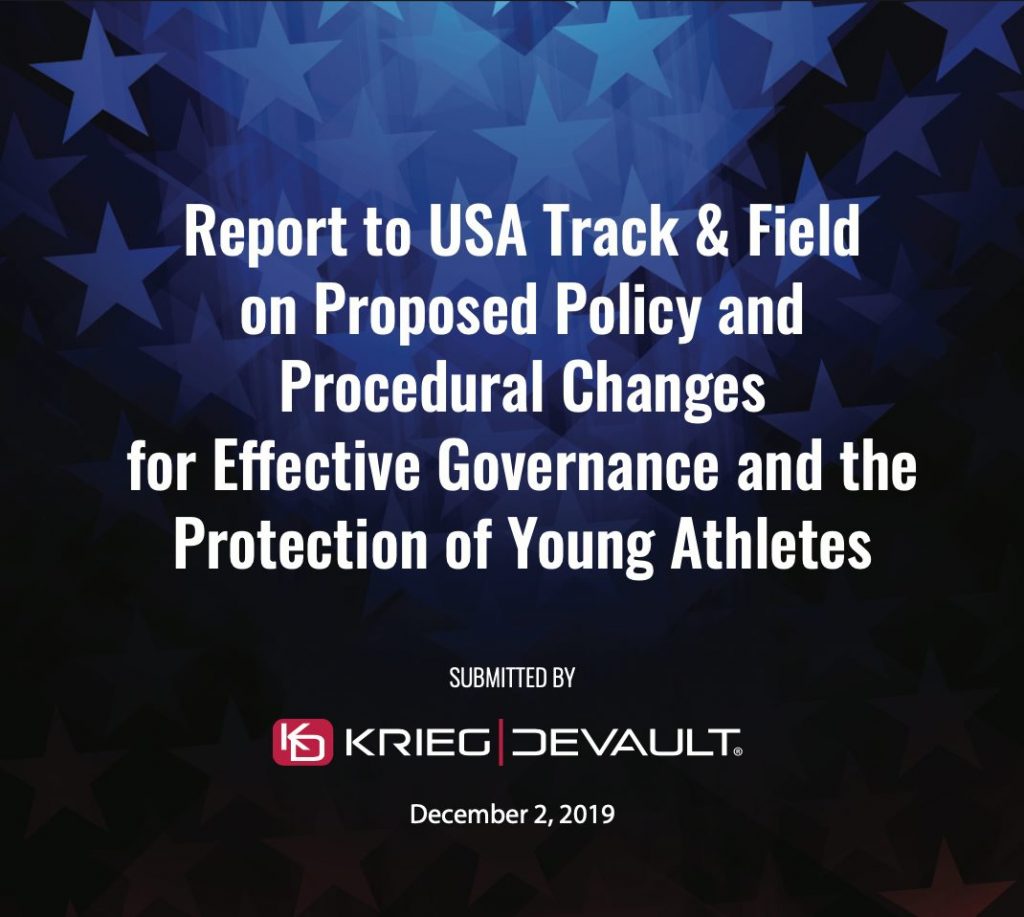
Ban Automatic Pole Vault Standards!
For over a decade, there have been delays in almost EVERY international championship due to the automatic standards in the pole vault malfunctioning.
World Athletics keeps talking about wanting to speed up the sport. They keep making changes that are harmful to the athlete and makes the sport more confusing for the fans.
There is one simple change that would speed up the sport and make it more enjoyable for the fans… BAN THE AUTOMATIC POLE VAULT STANDARDS!!!
USADA Covers Up Positive Test for Seven Years?
No big deal, just USADA hiding a positive test for SEVEN YEARS.
It was wrong when Russia did this and it is wrong for USADA to do this.
This is not the first time, but this is by far the longest case that has ever been made public. Also, this press release doesn’t even make sense.
It says he served a provisional ban from March 28-July 27, 2015, but Tilastopaja says he competed in five road races during that period.
He then went on to compete in numerous road races 2016-2019.
How many athletes were deprived prize money because USADA allowed an athlete that failed a drug test to keep competing?
Who else has secretly served bans?
USATF’s 2019 Tax Return
USATF filed their 2019 tax return on November 11, 2020.
As of today, June 15, 2021, it is still not posted to their website.
Multiple sources have told me the reasons for this delay have to do with delays in getting their finances audited by their audit firm (we have had turnover in audit firms).
In the meantime, the IRS has published USATF’s 2019 990. You can view it directly on their website: https://apps.irs.gov/app/eos/ use USATF’s EIN 35-1475847 to search for it.
I’m not a tax expert, and I’m not going to sit here and try to analyze USATF’s tax return. But I do want to point out one thing…
On Section O, Supplemental Information, the following statement is made:
“The return is shared with the board of directors prior to filing. Once filed the return is posted on USATF’s website for public viewing.”
The board as of November 2020 will have to speak for themselves as to whether or not the tax return was shared with them prior to filing, but it was not posted to USATF’s website once filed.
If it is the intent of USATF to not post the tax return until all of the finances have been audited… why?
The tax return is public record. If you don’t post it, the IRS will eventually and you just look shady.
But also, if you are going to wait for audits before posting, then your statements to the IRS need to reflect that, because otherwise it seems like you are making false statements to the IRS, and that sounds like a really bad idea to me.
Coaching Education Standard
Athletes and coaches who are hoping to compete at the Olympic Trials, please make sure you are on top of this stuff!
For coaches to get credentialed for the Olympic Trials, in addition to being SafeSport three step compliant, you also need to meet the education standard.
This started in 2019, but of course a lot has happened since then, so this may be off the radar for a lot of people.
I have posted the link to the various ways that the education standard can be met. If you do not meet any of them, the USATF Campus + NFHS option is completely online.
Remember that tickets are going to be extremely limited due to COVID restrictions. Getting your coach credentialed is really the only way to guarantee they are able to be in the right place at the right time.
To summarize, a coach needs the following four things to all be connected in the USATF Connect system:
1. A 2021 USATF Membership
2. Has taken a SafeSport training or refresher course in the past 12 months
3. Has a current USATF background check
4. Meets the education standard
Again, do not wait until the last minute. If you or your coach are missing any of these things, start working on them today!
https://www.usatf.org/programs/coaches/coaches-registry/education-standard
